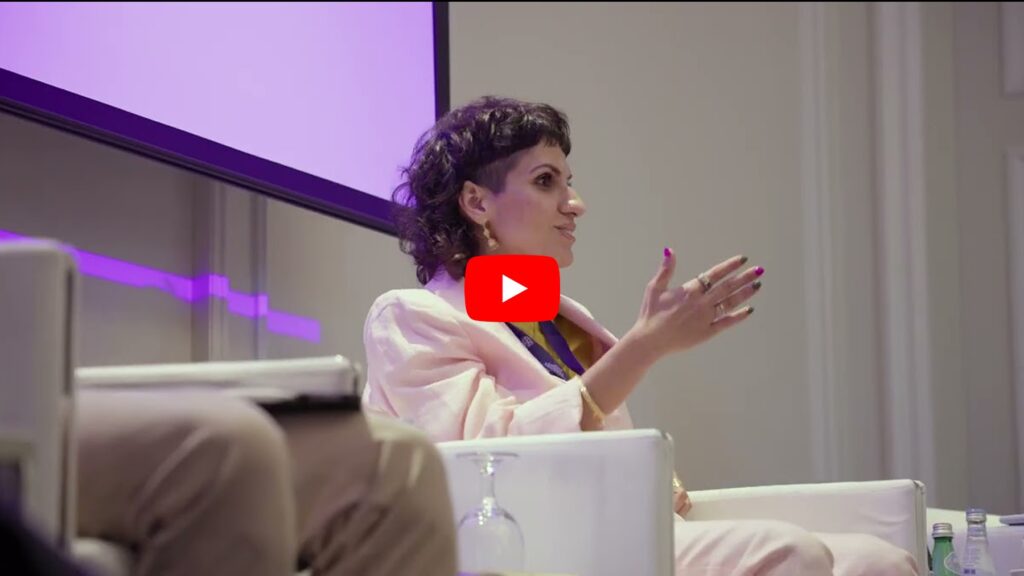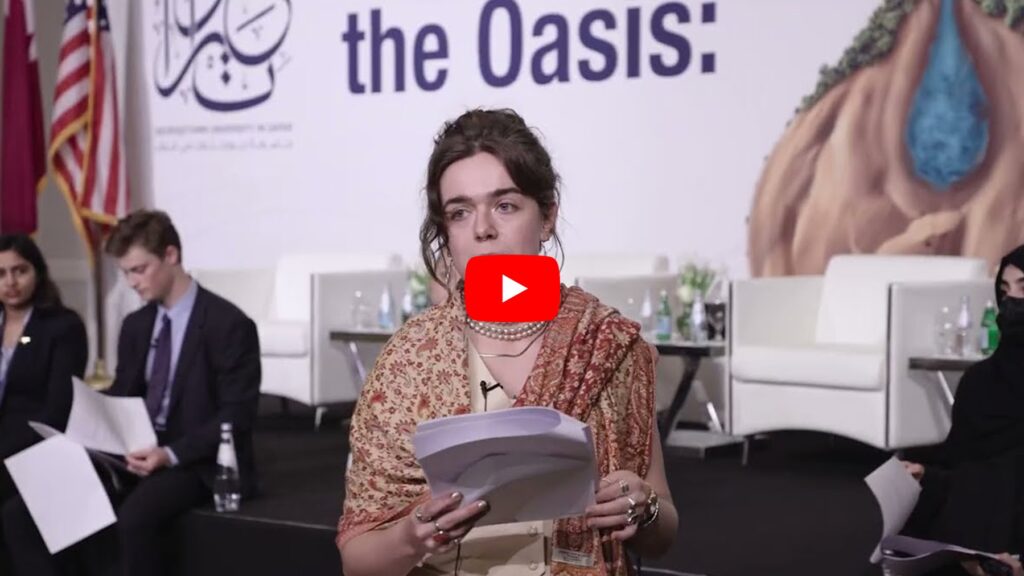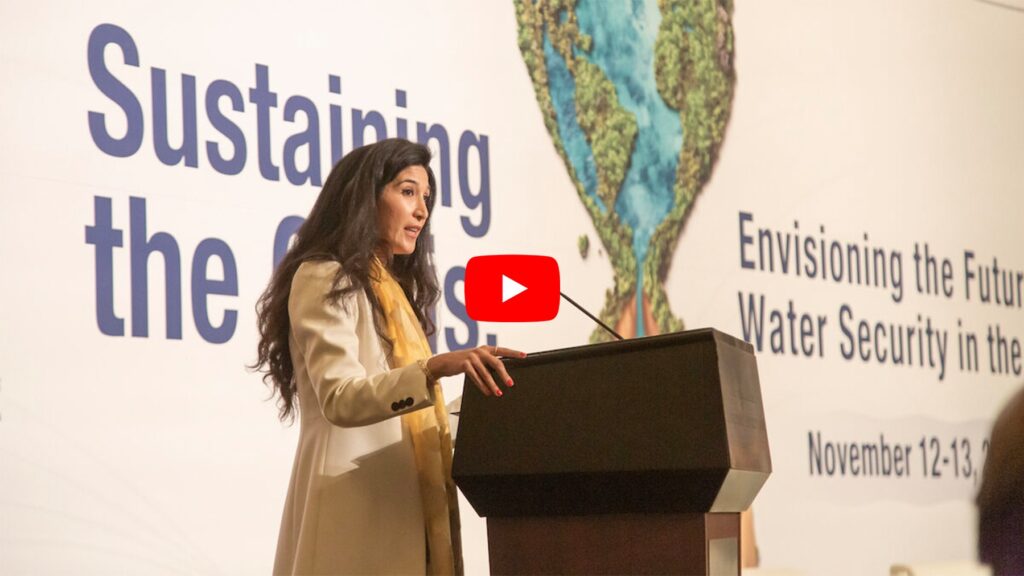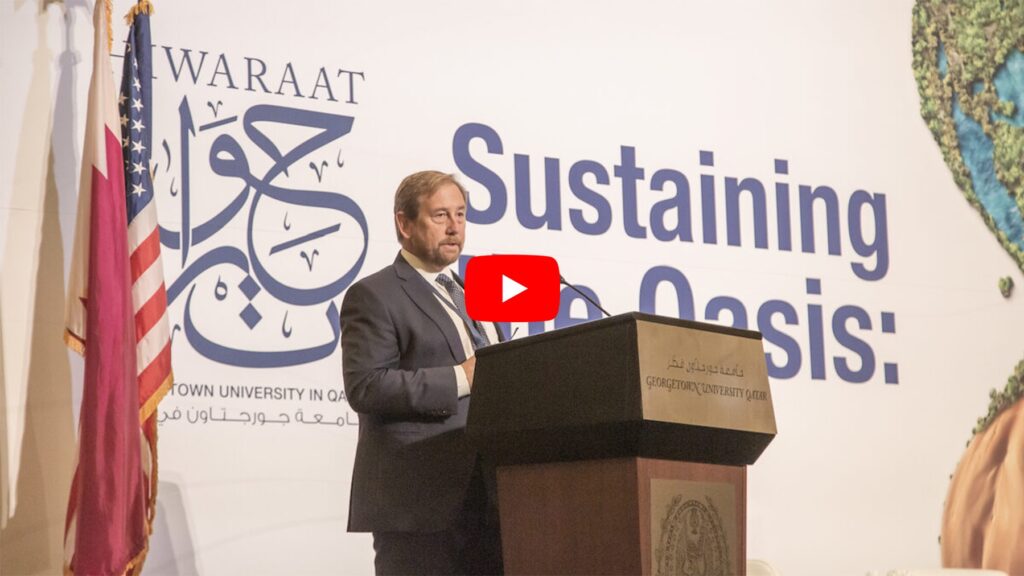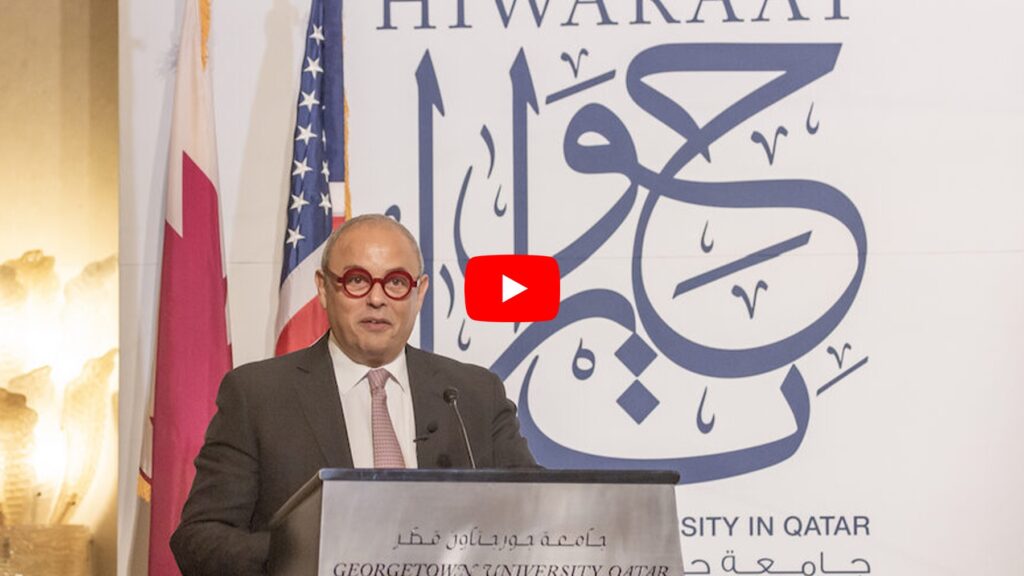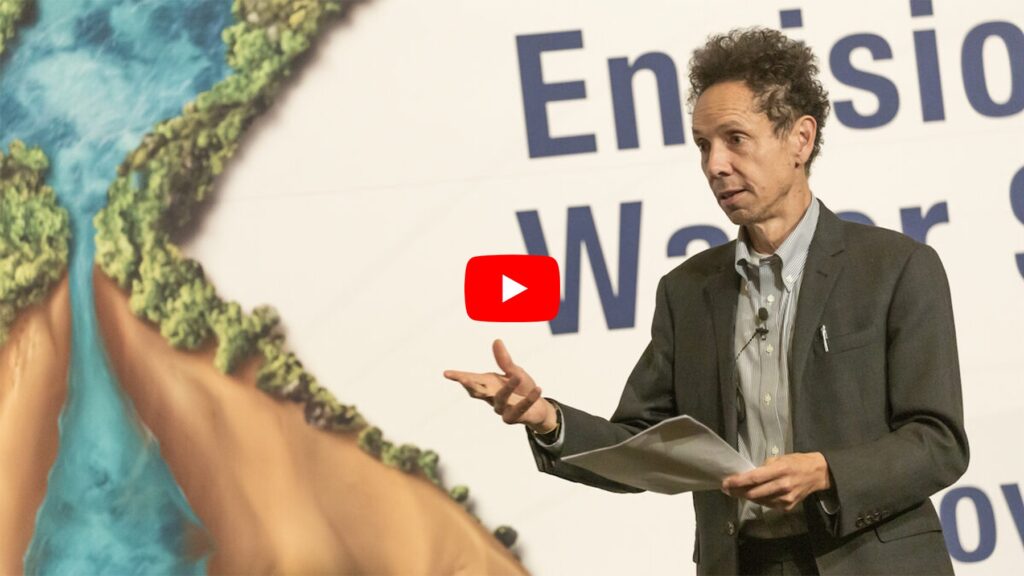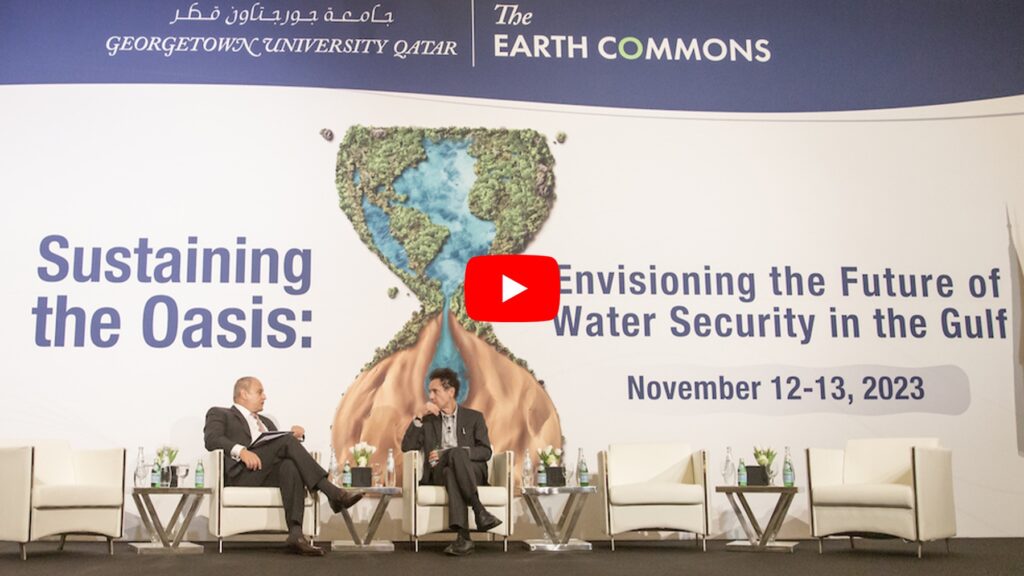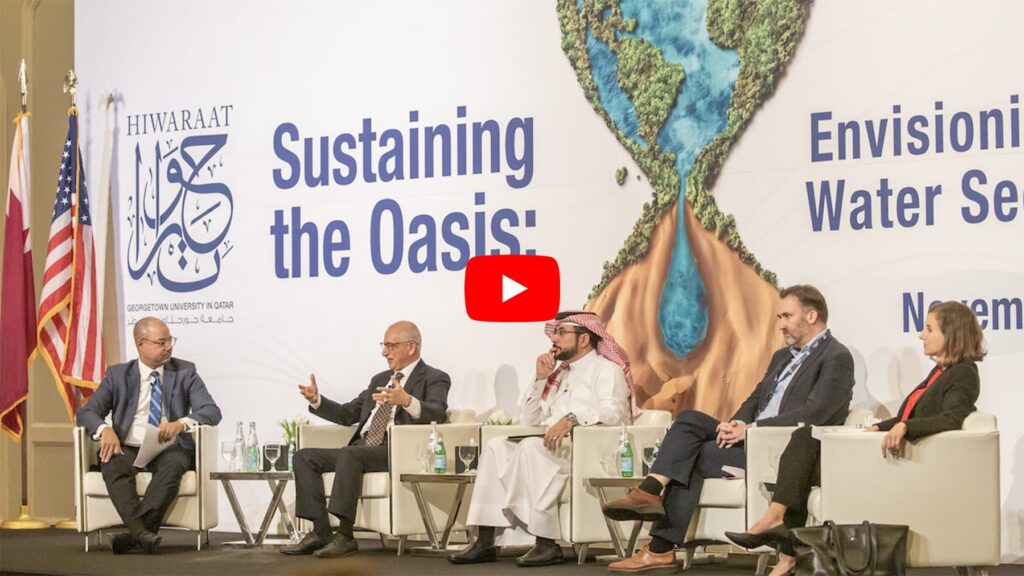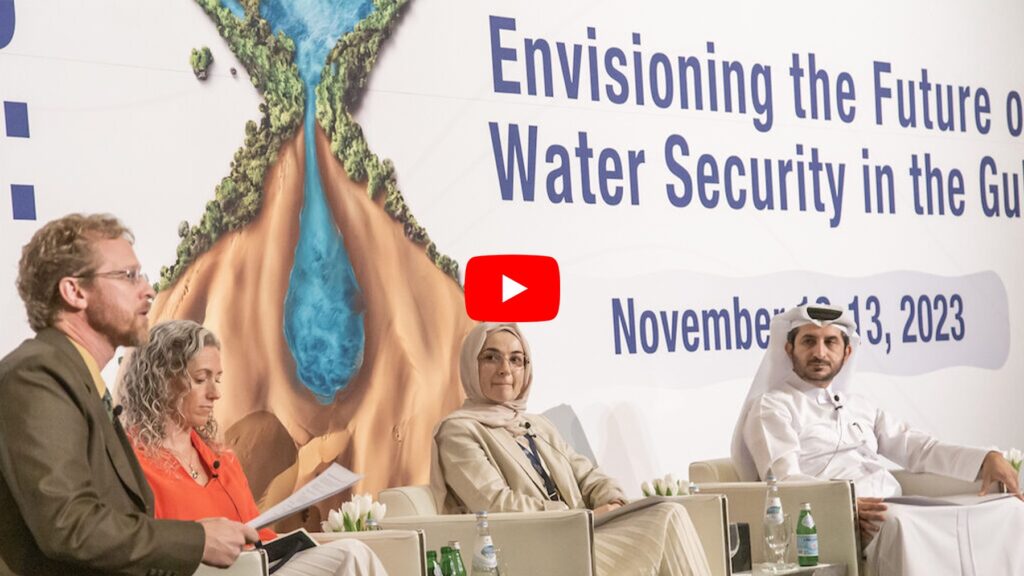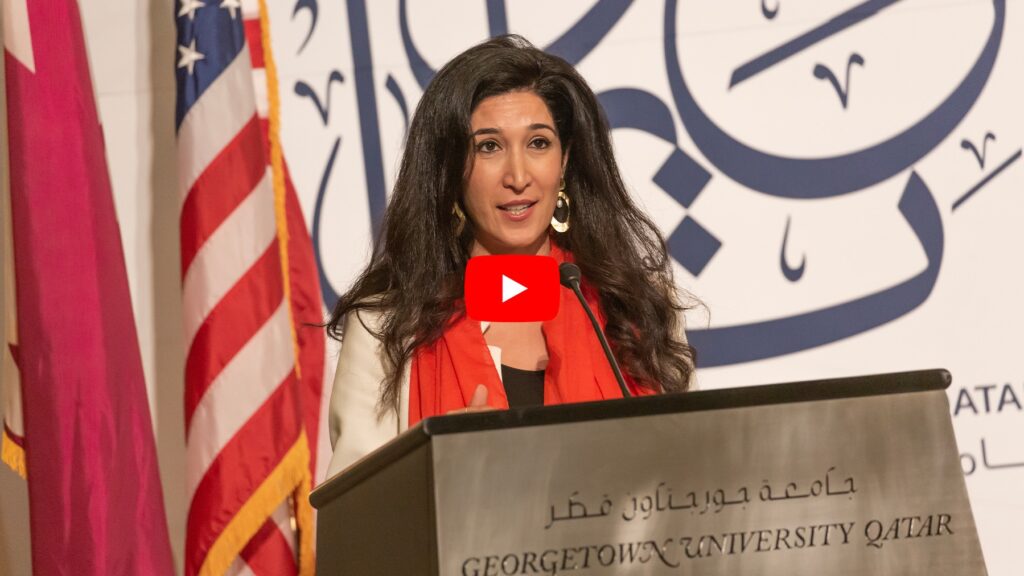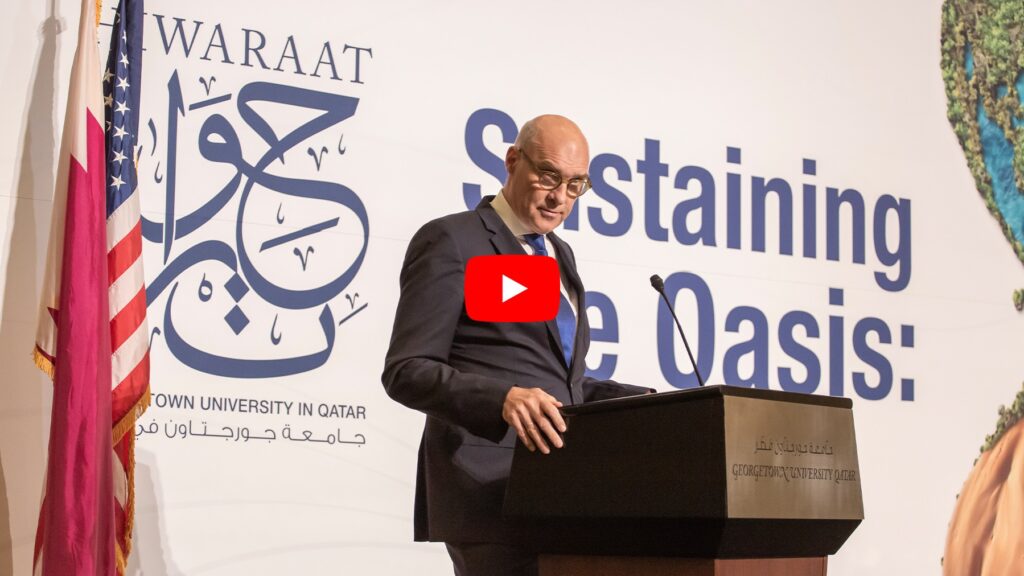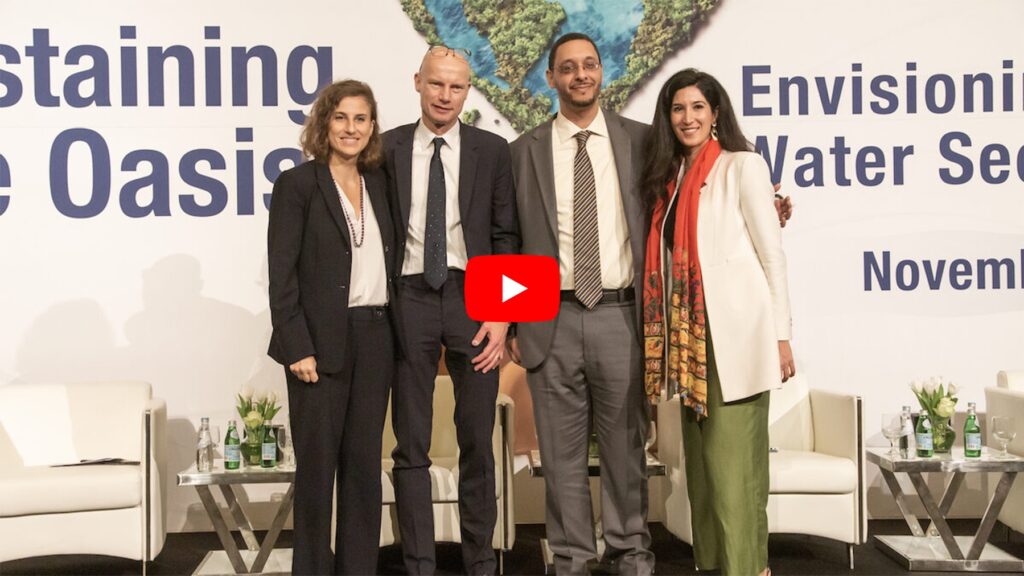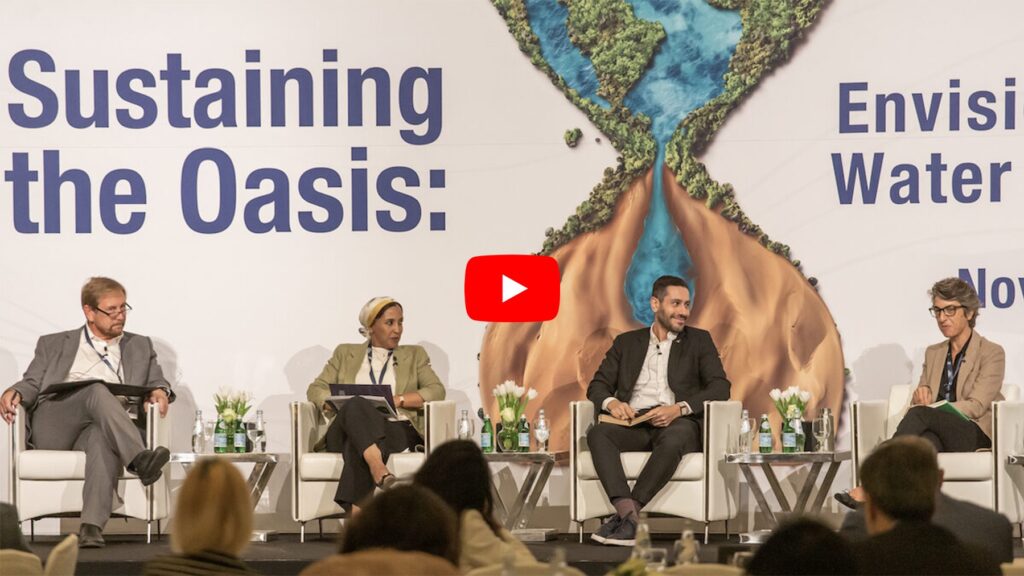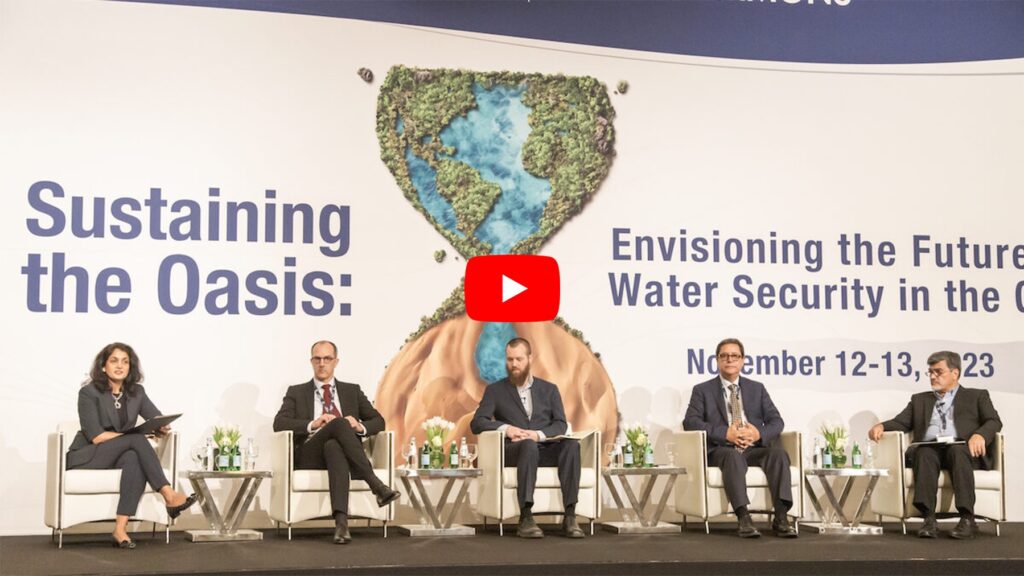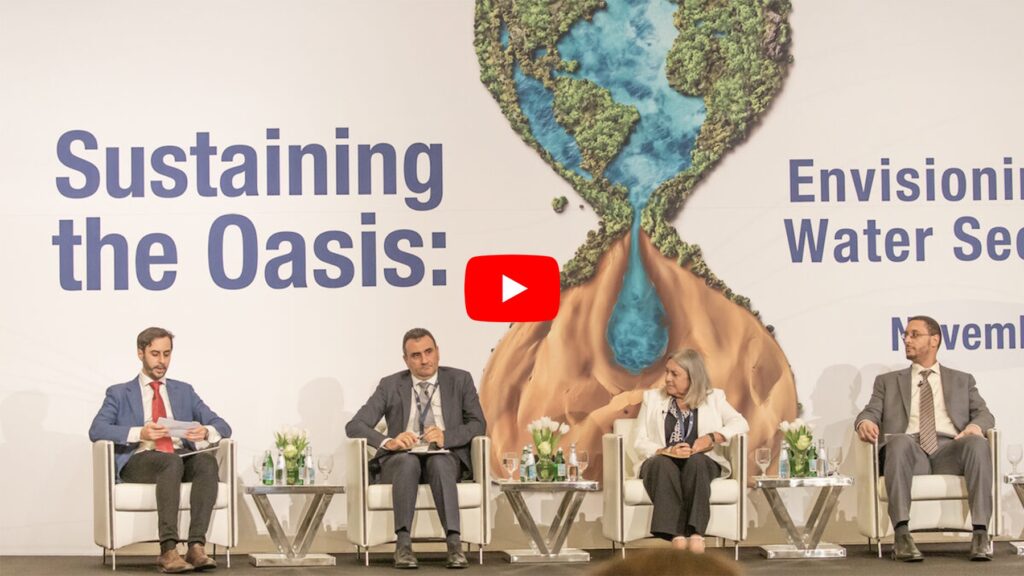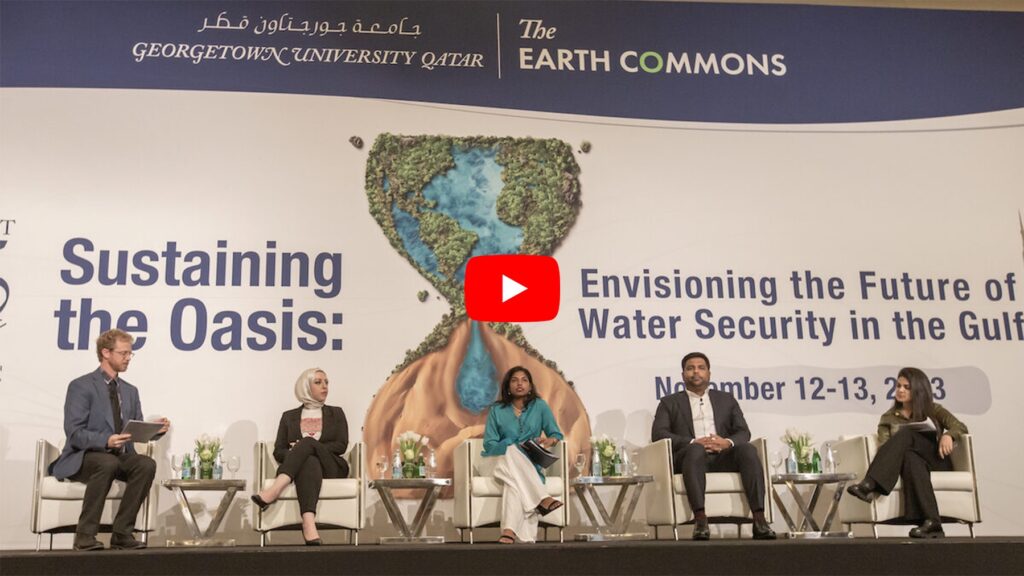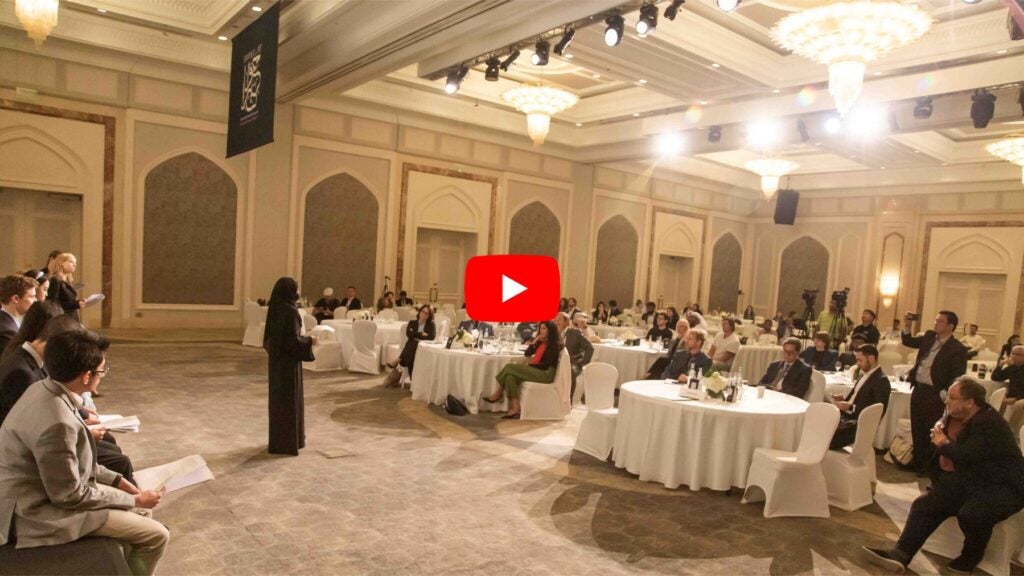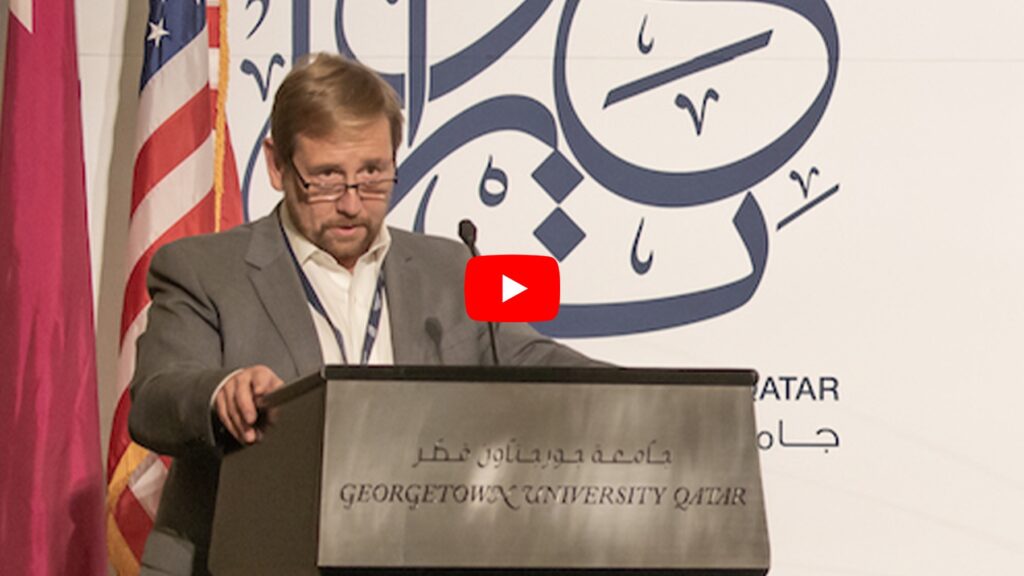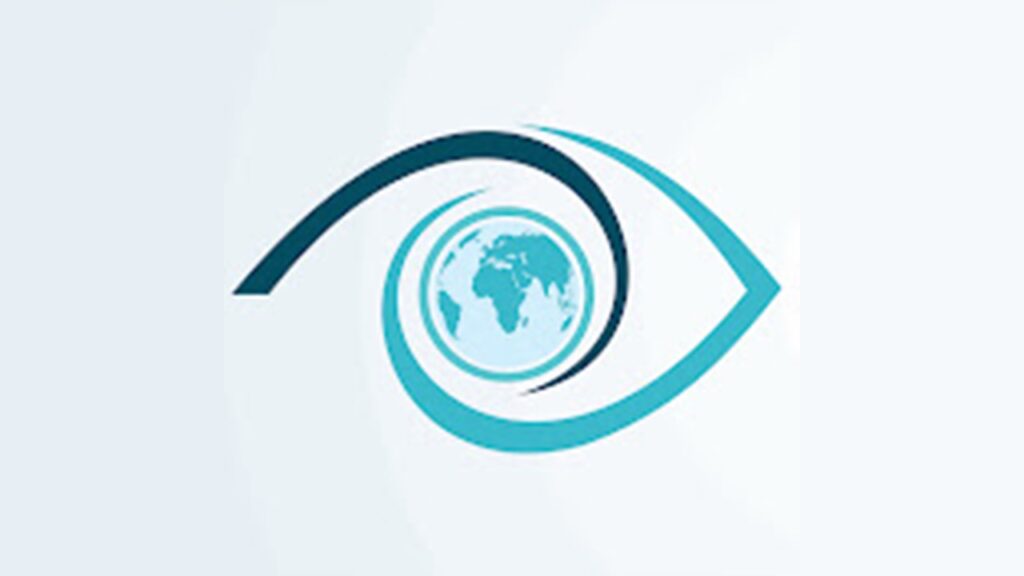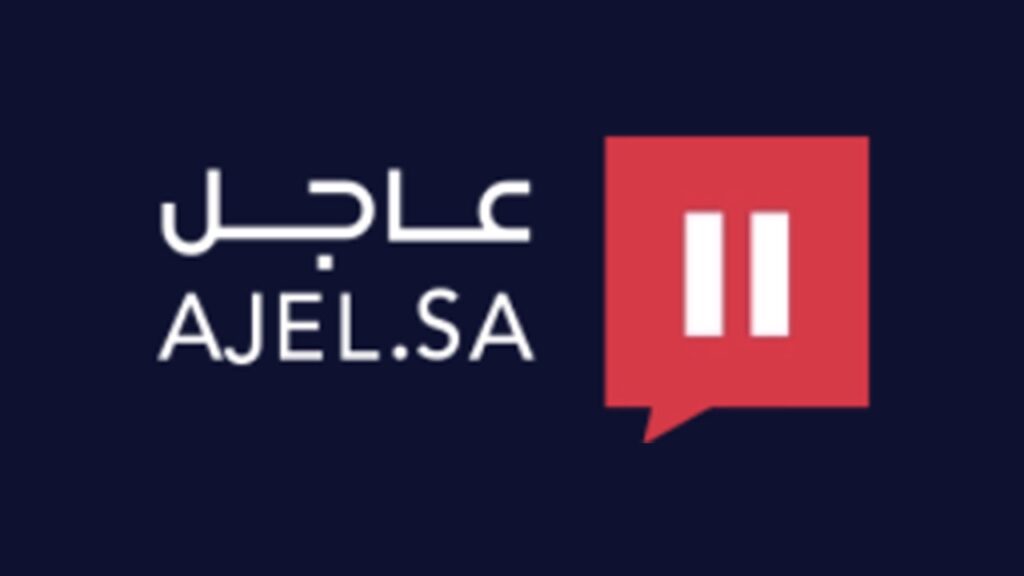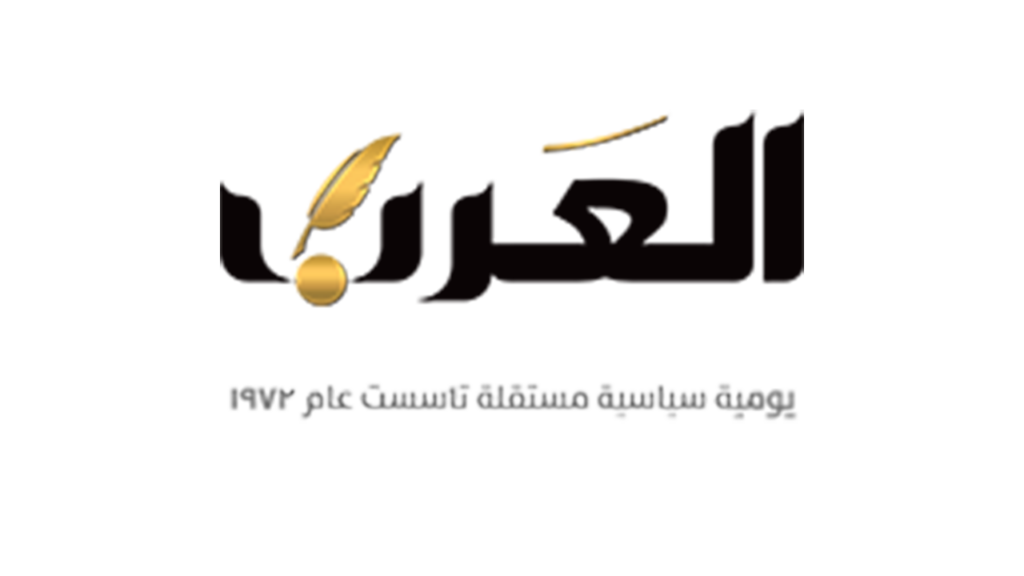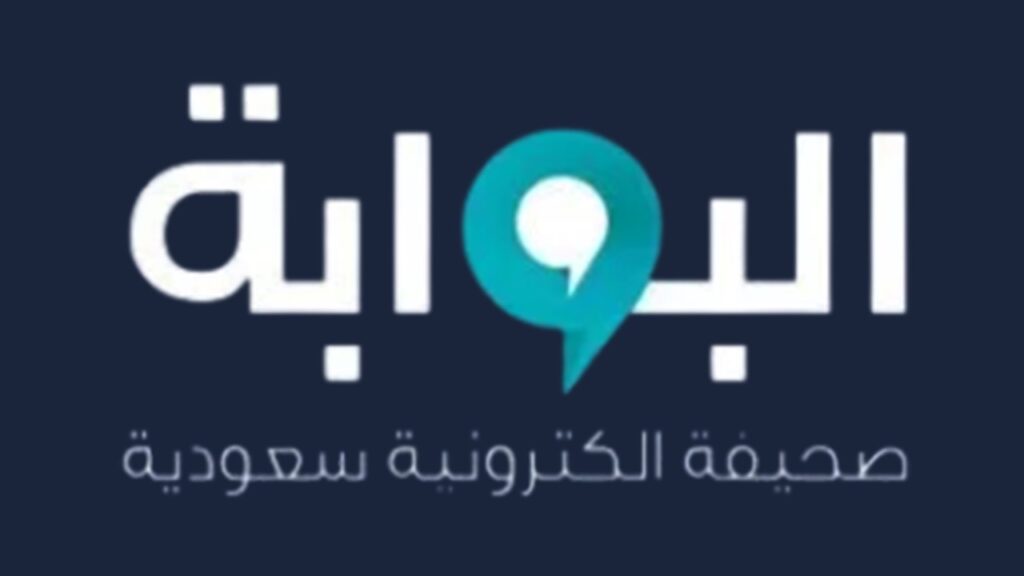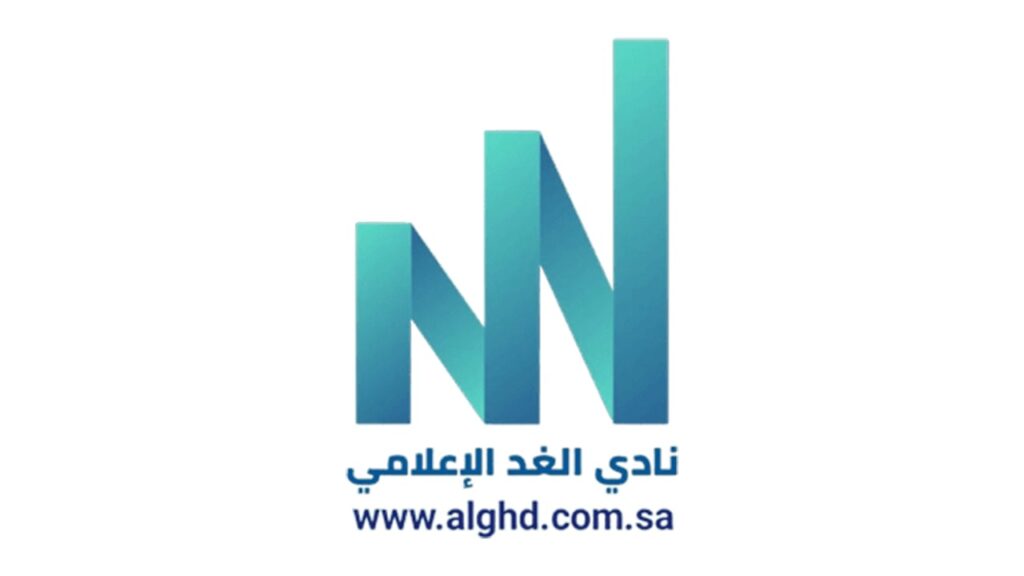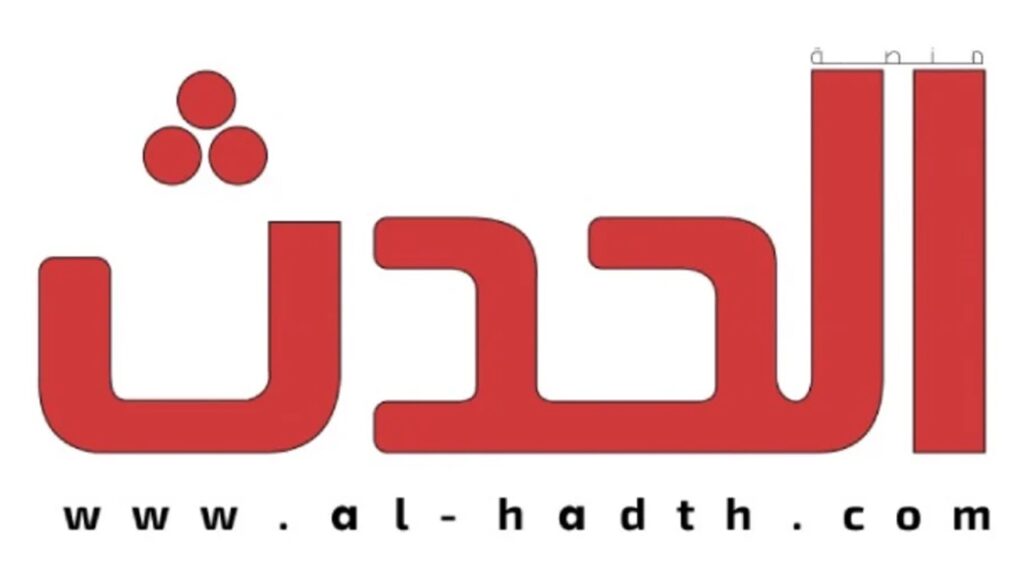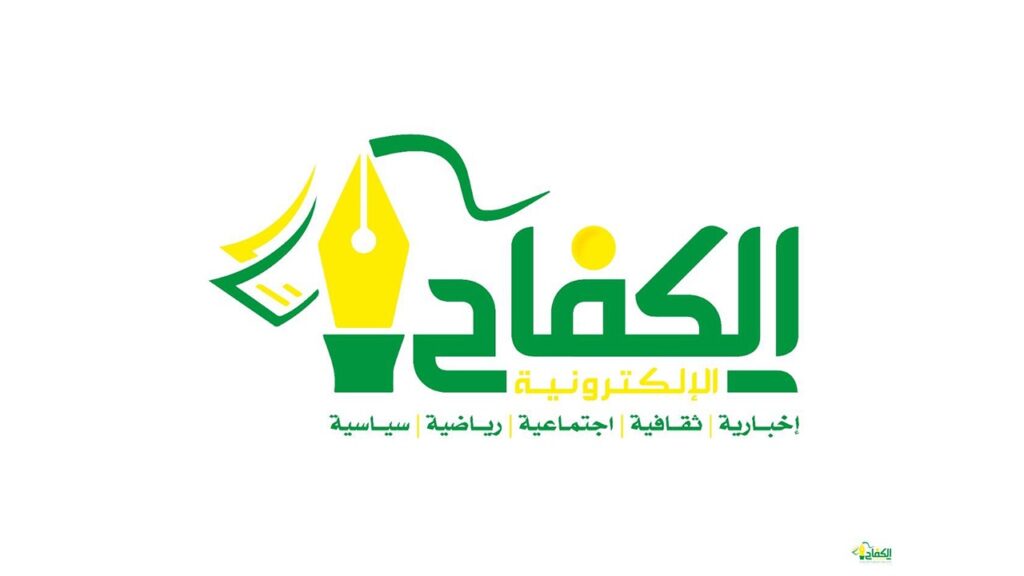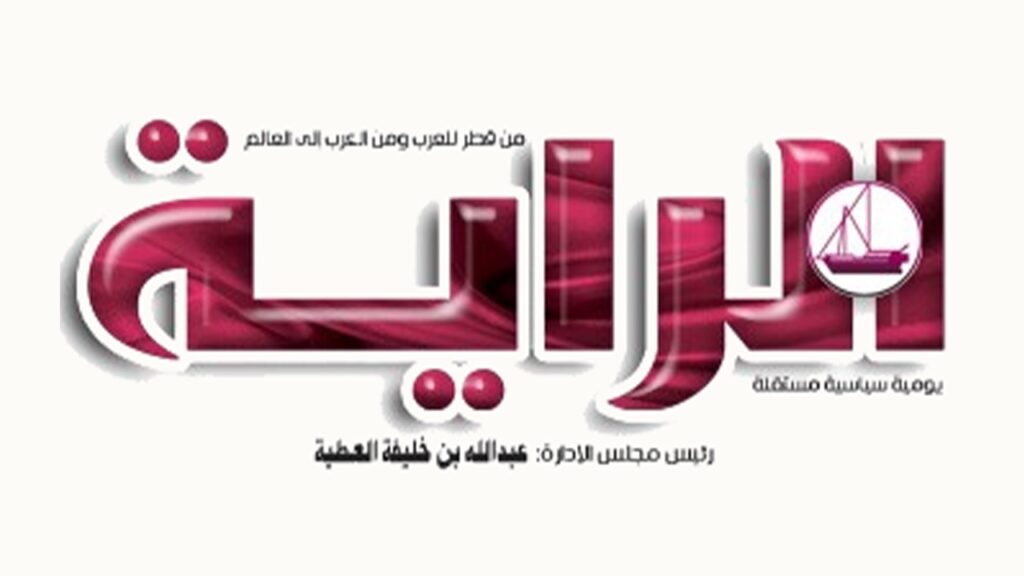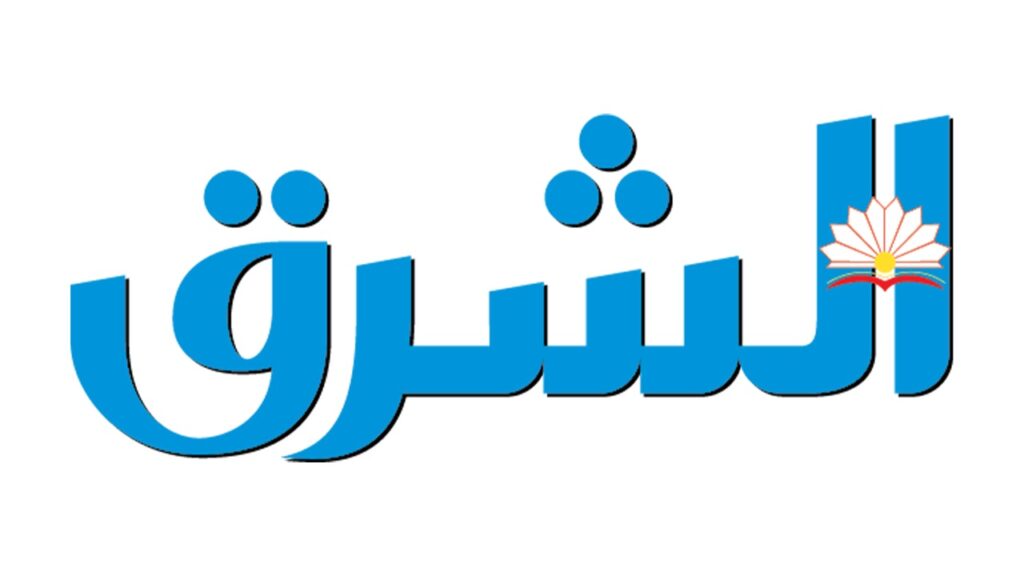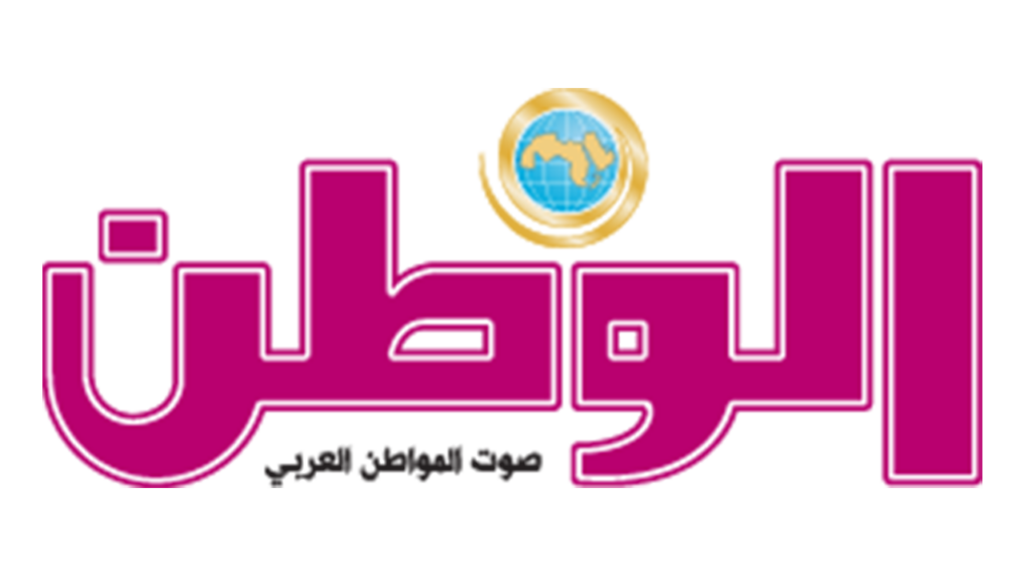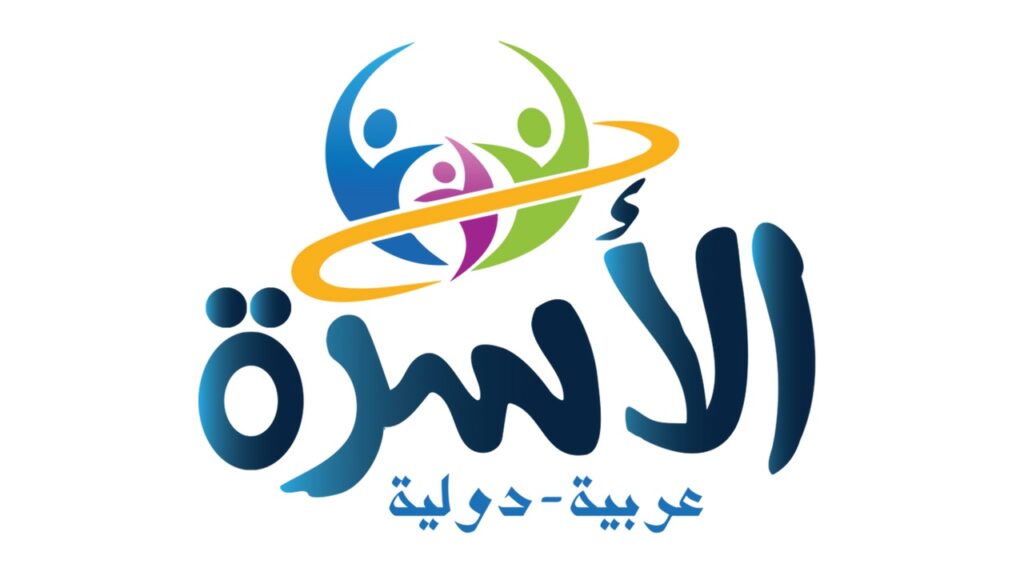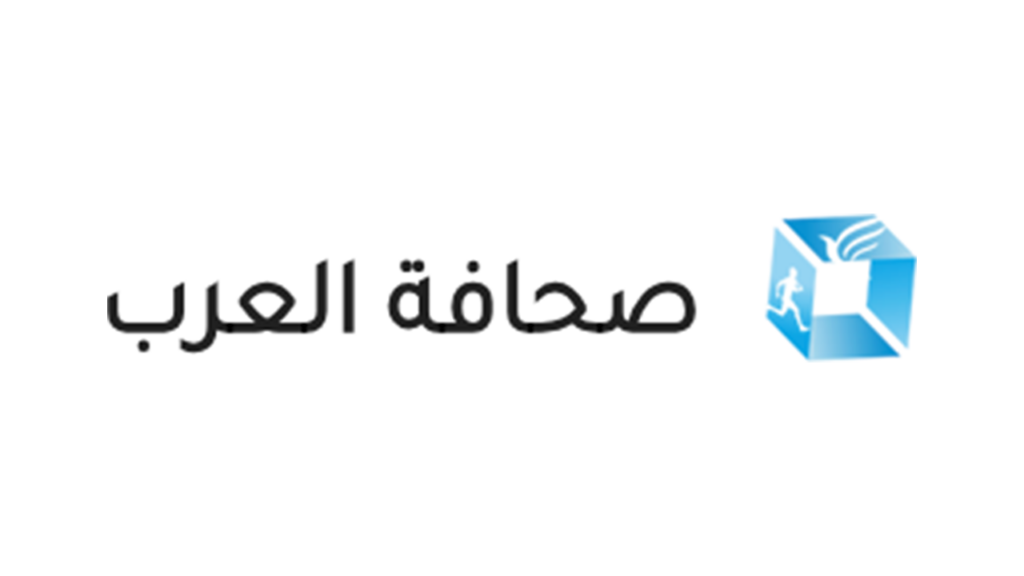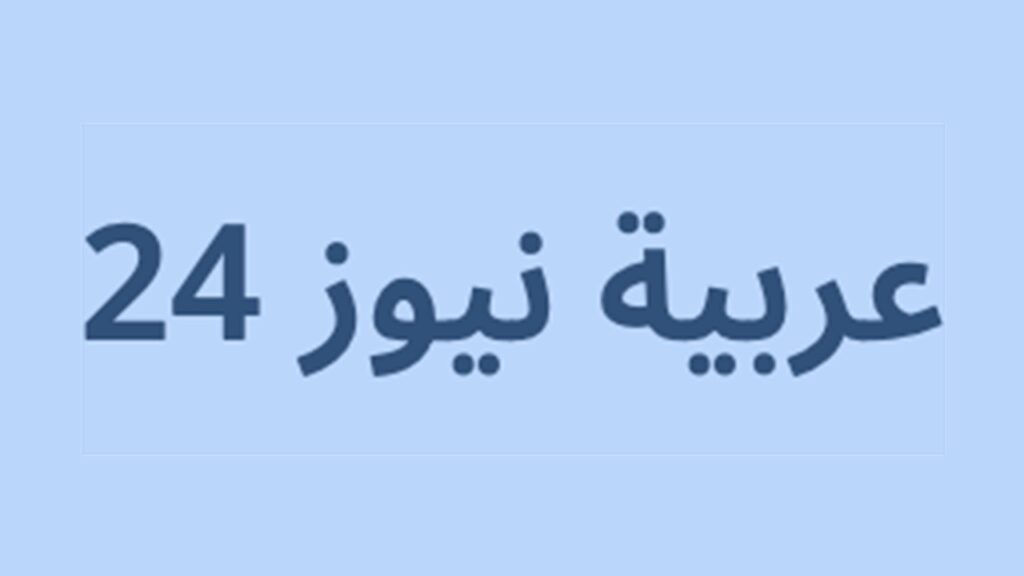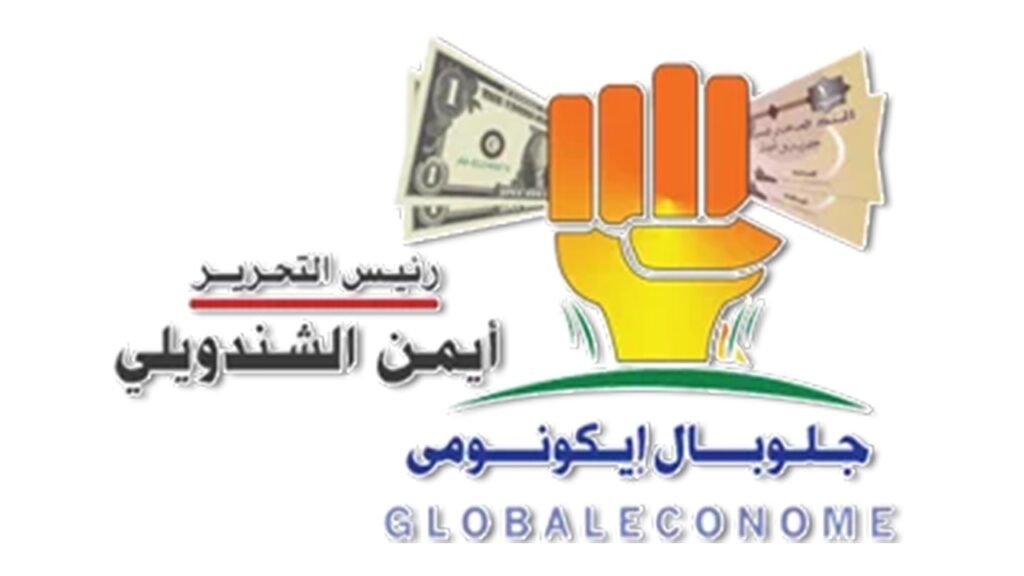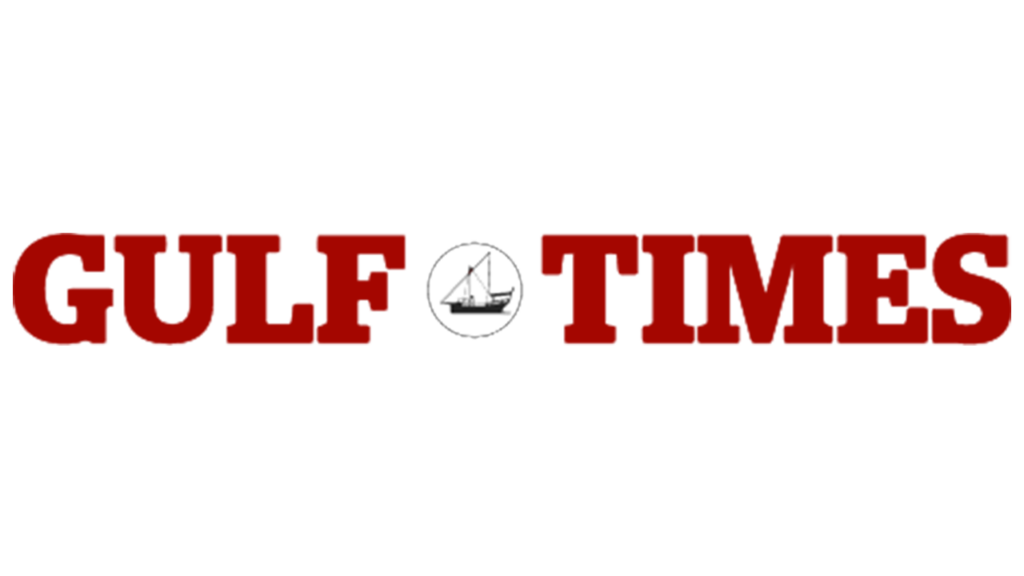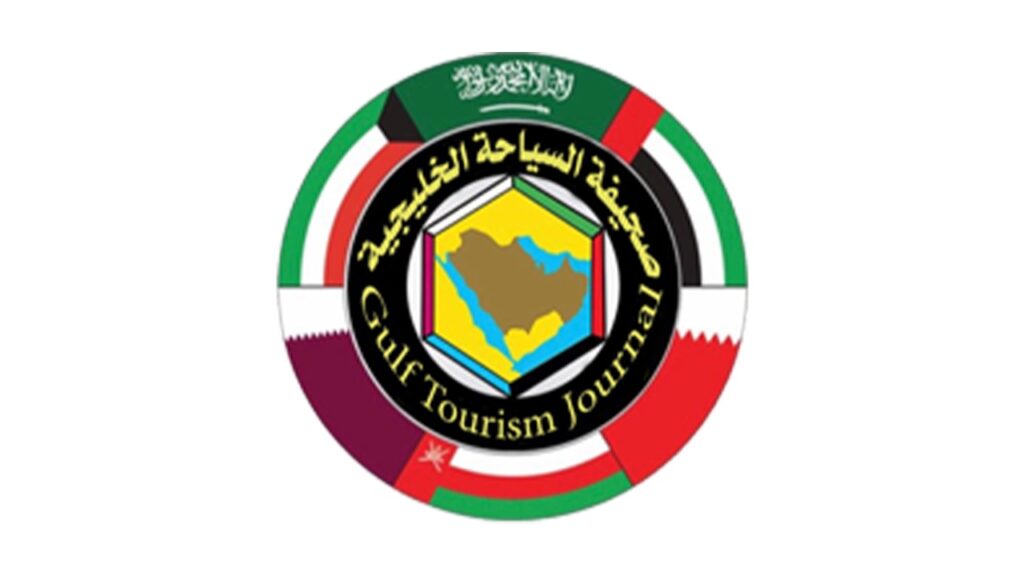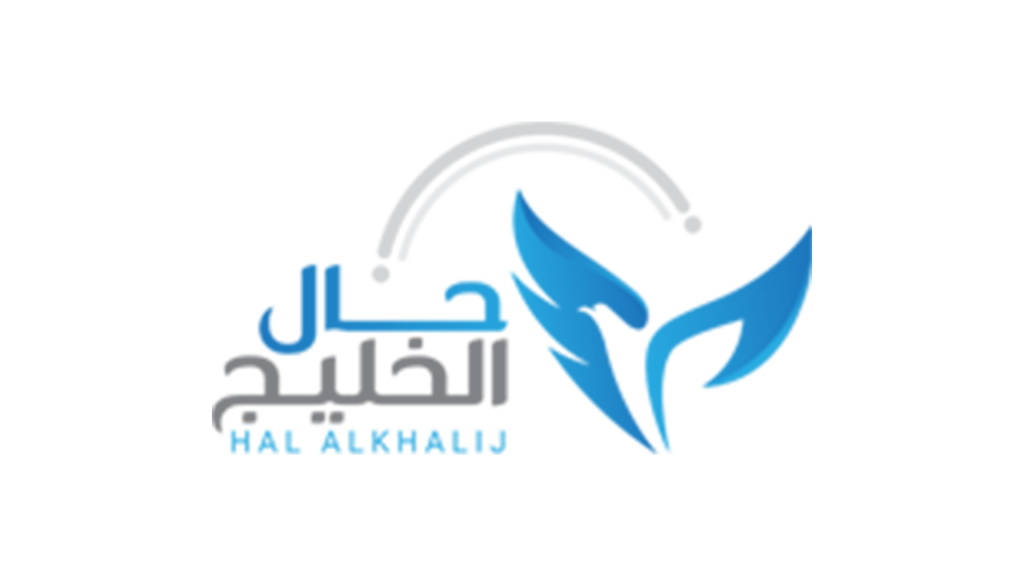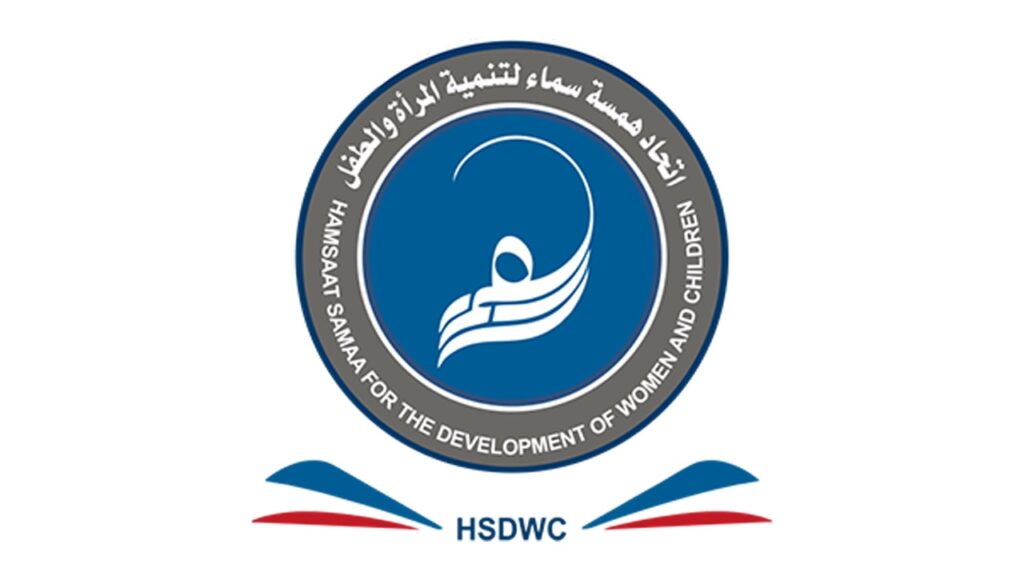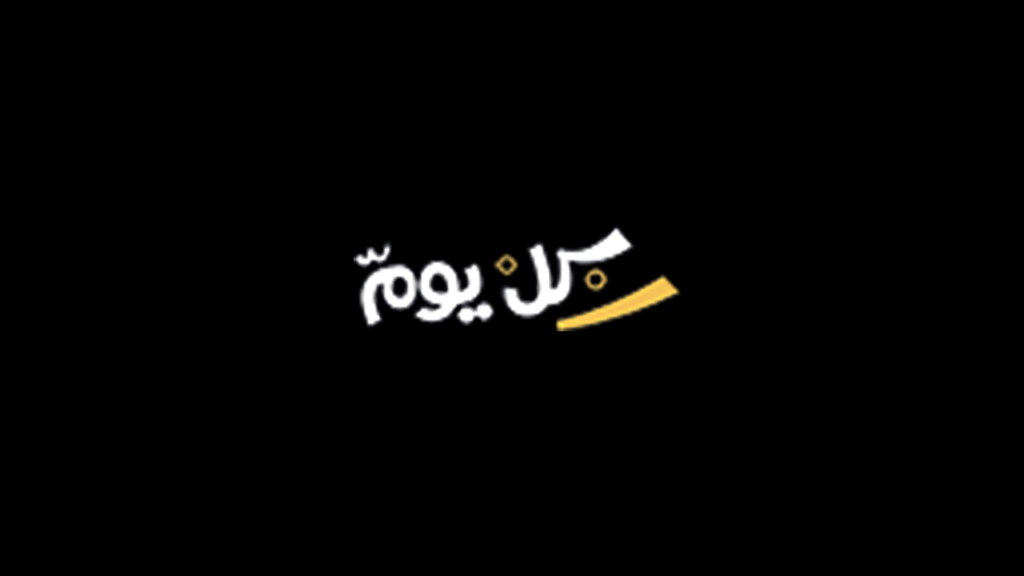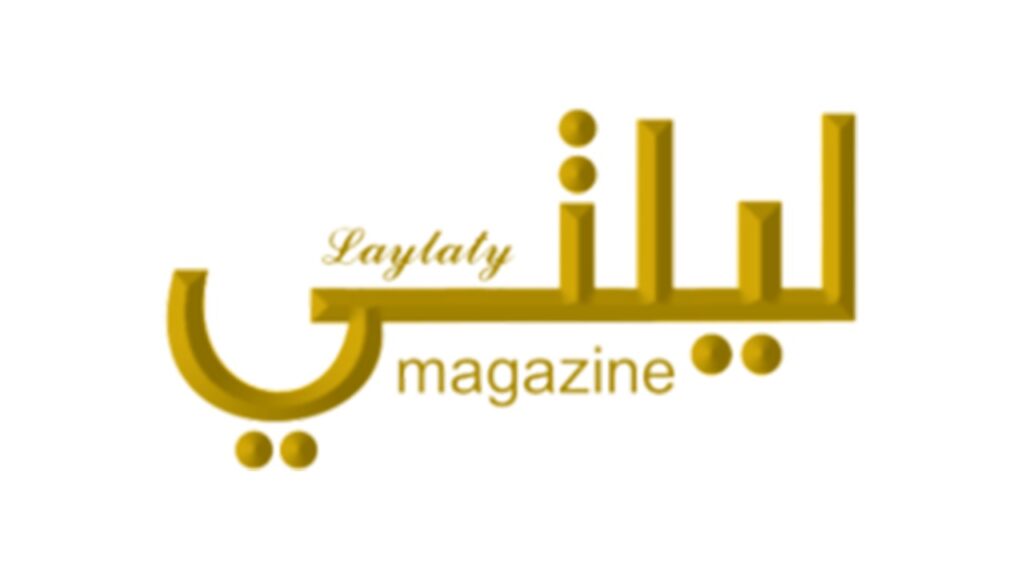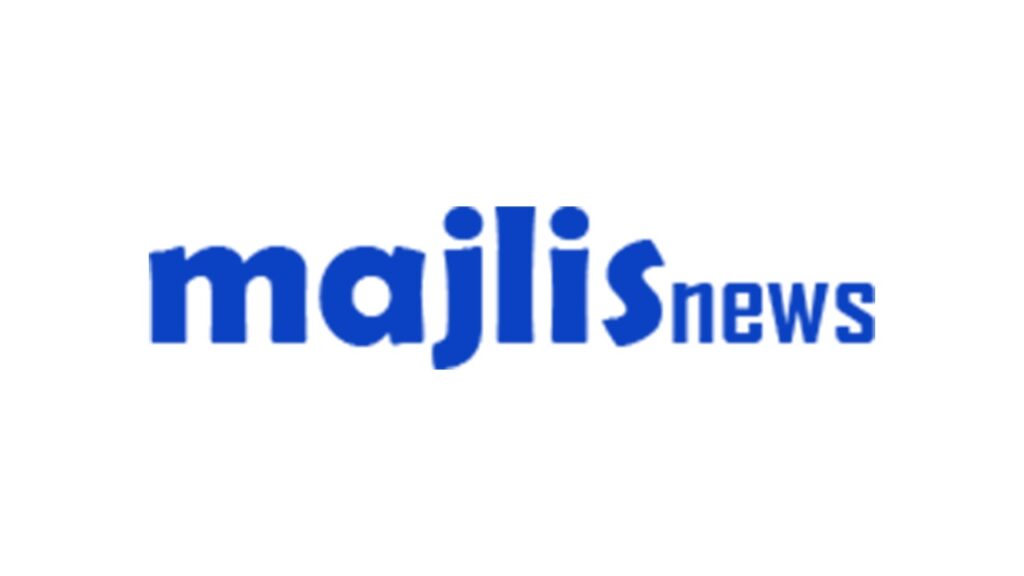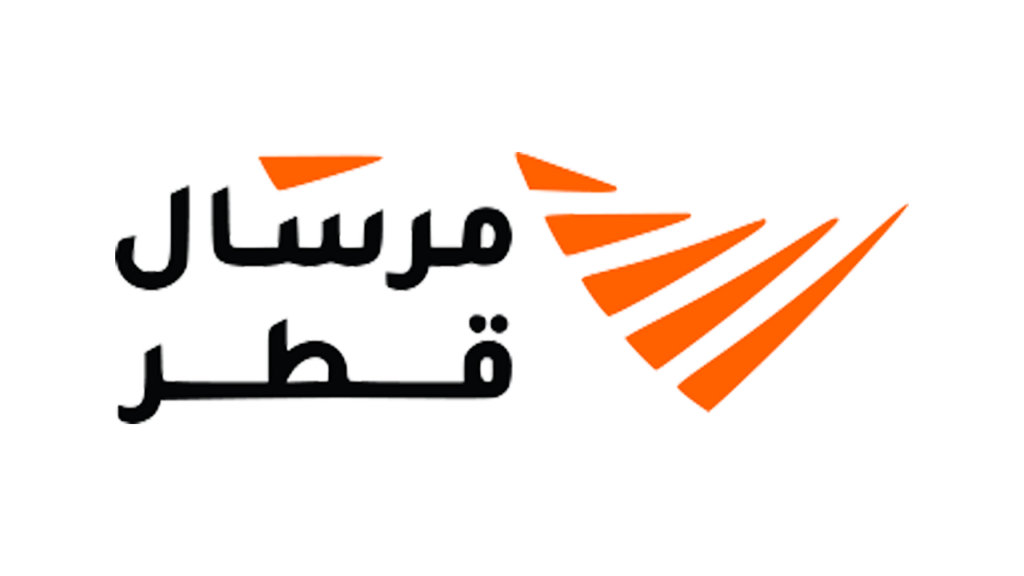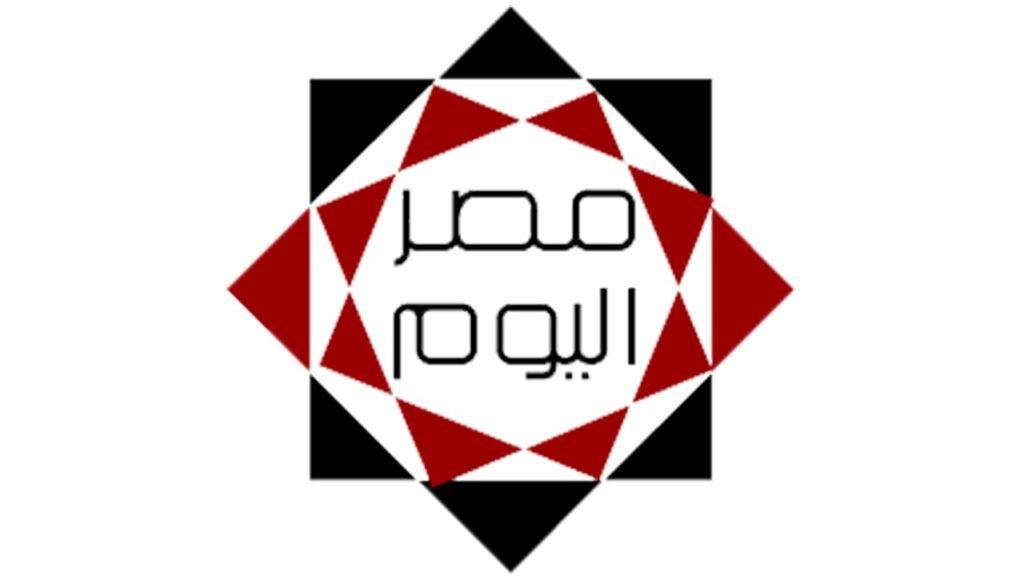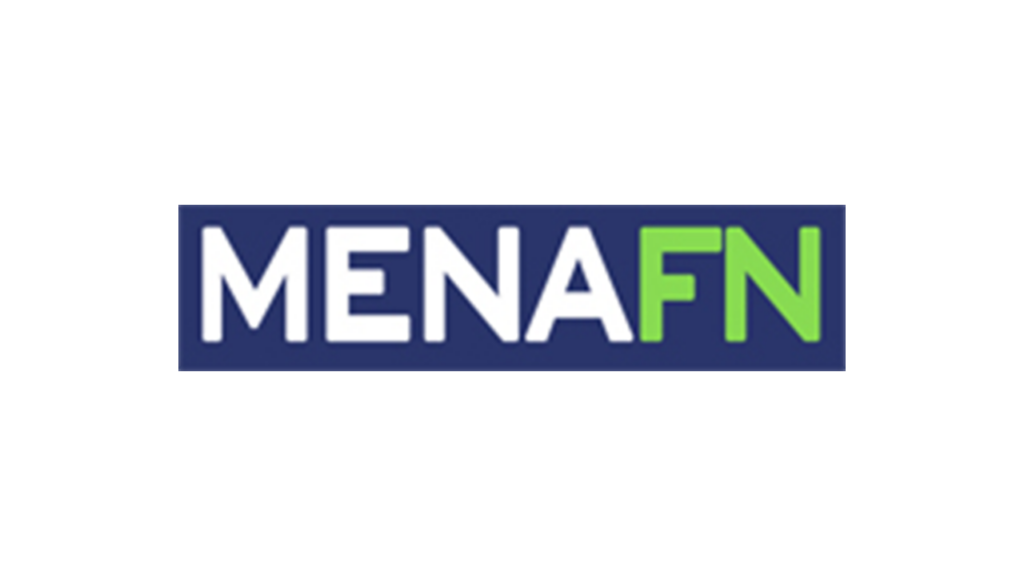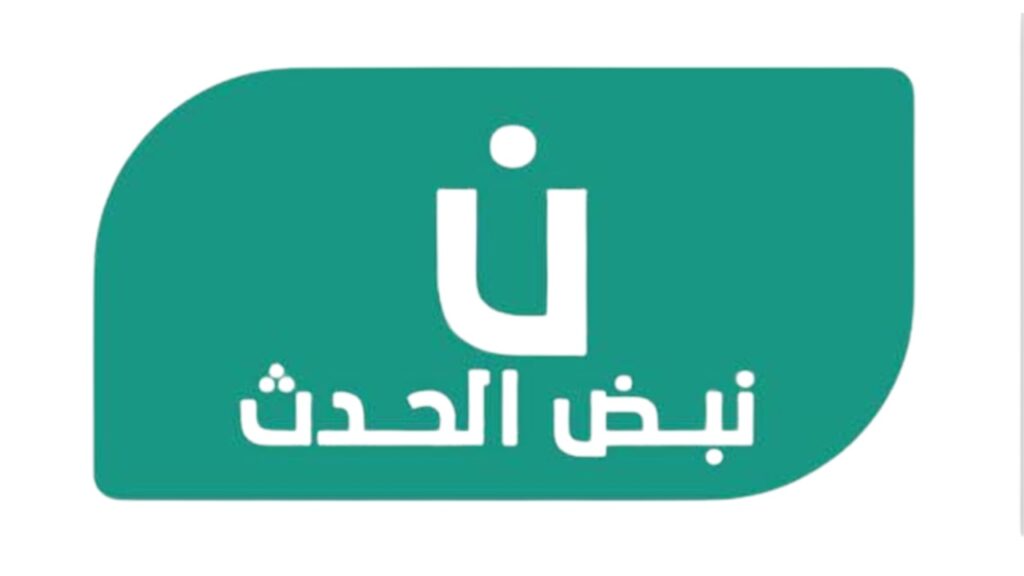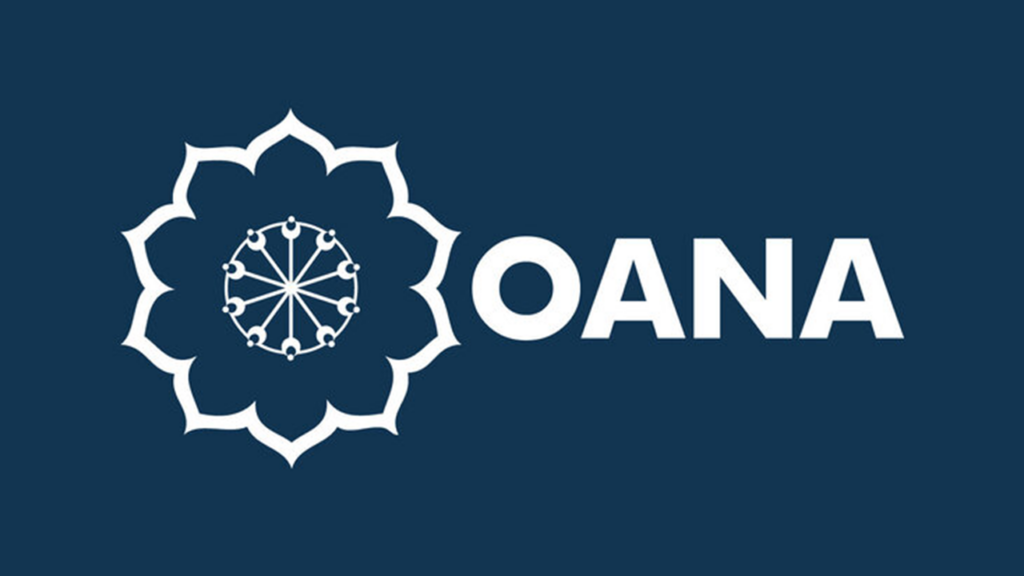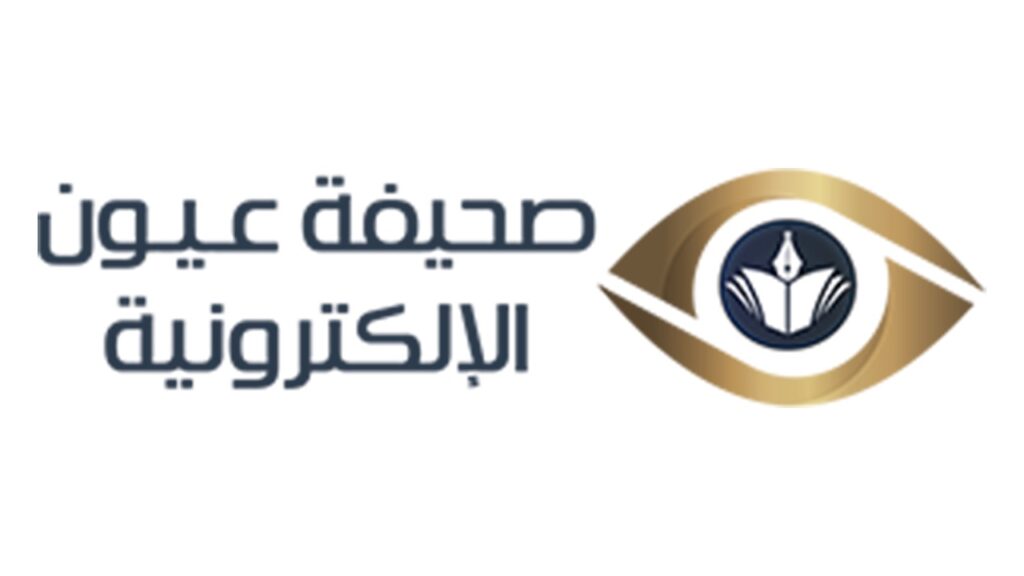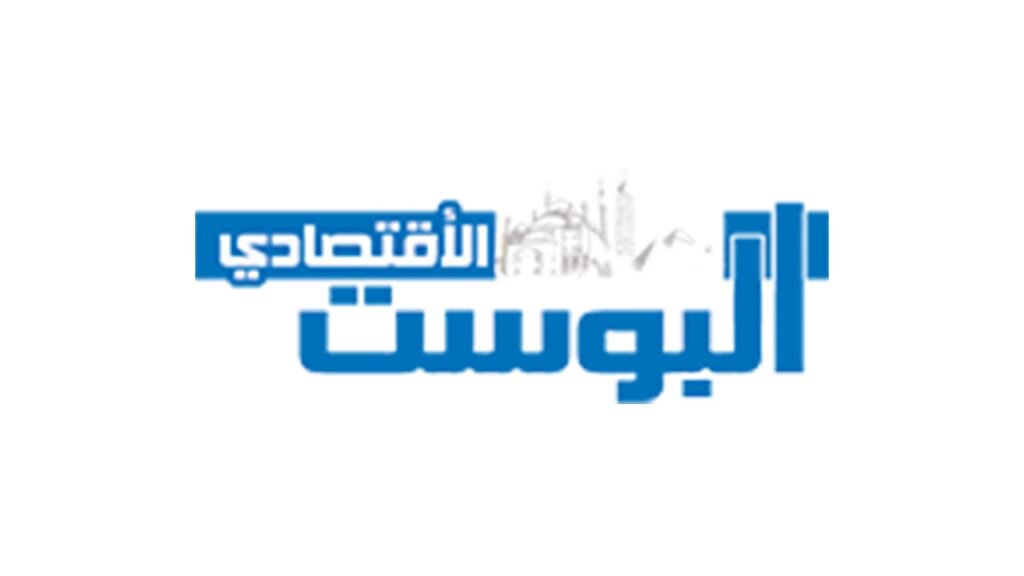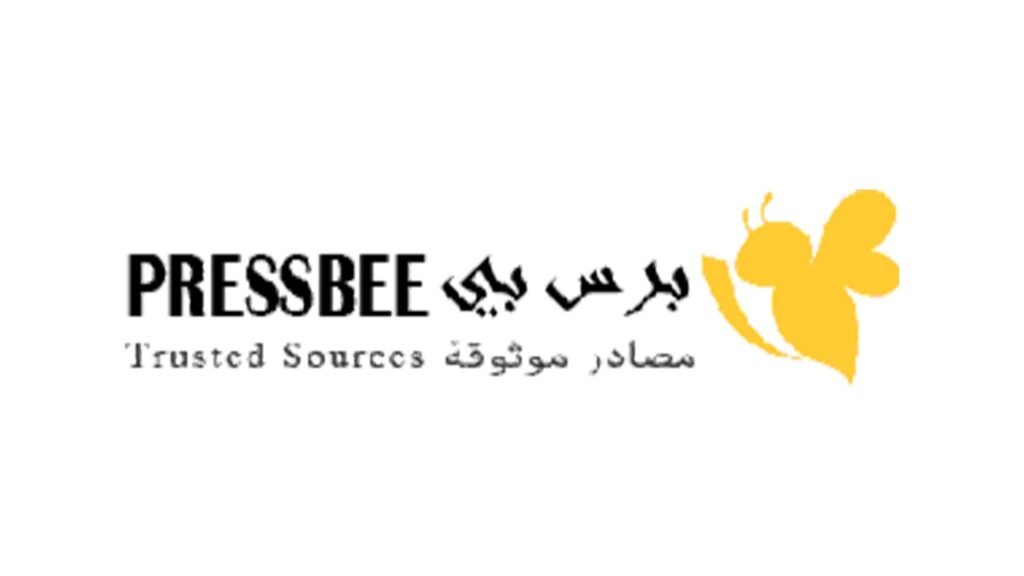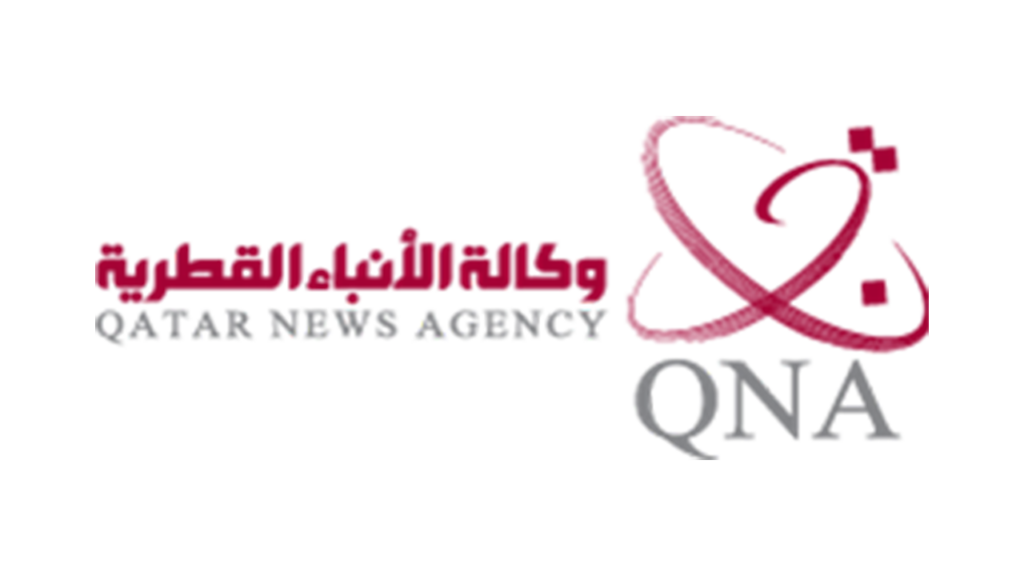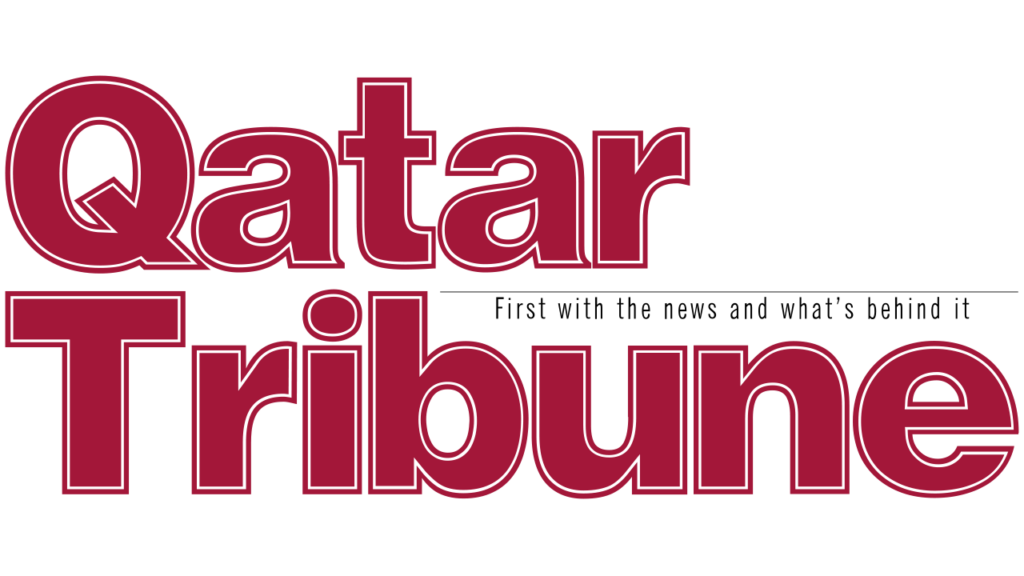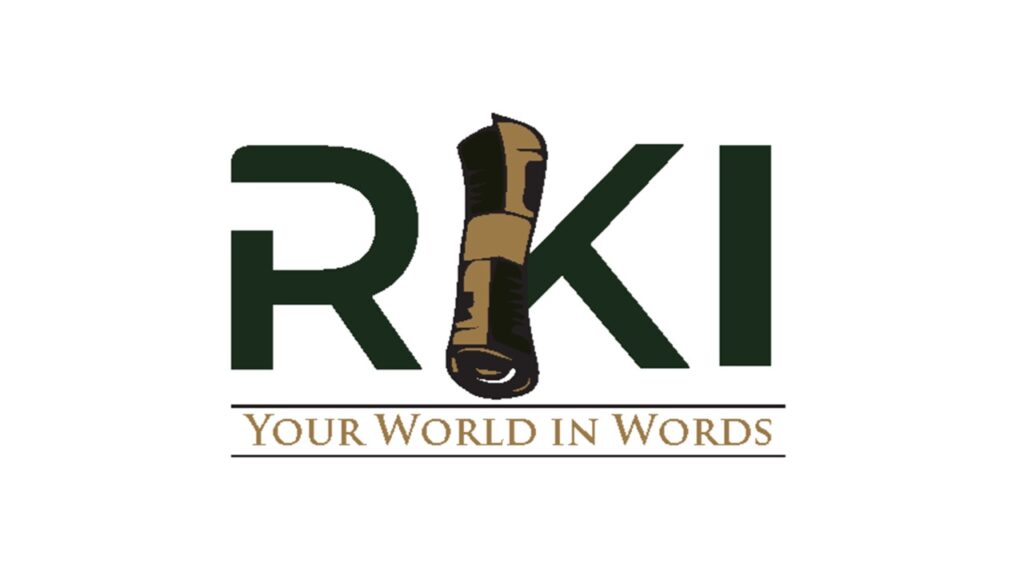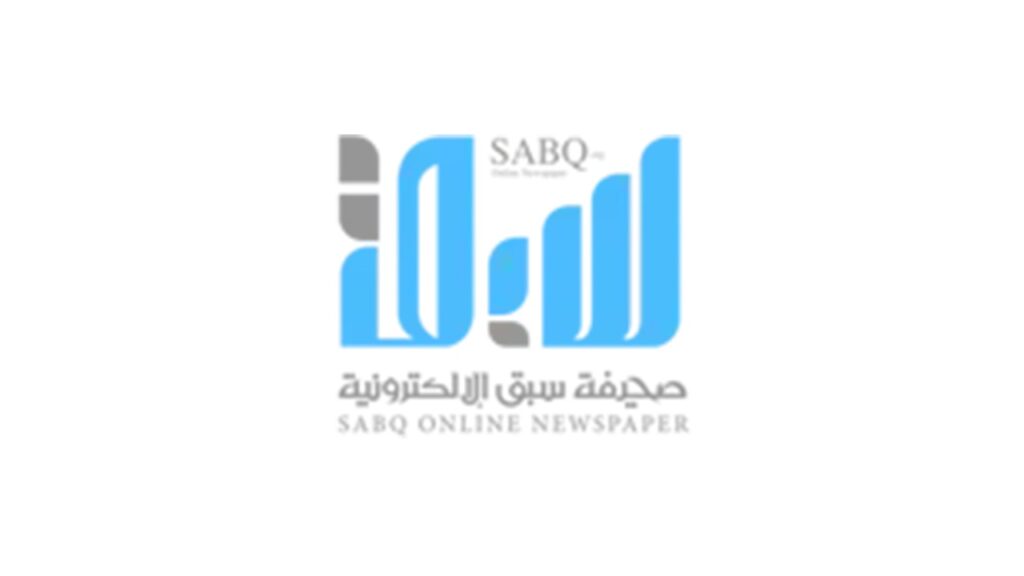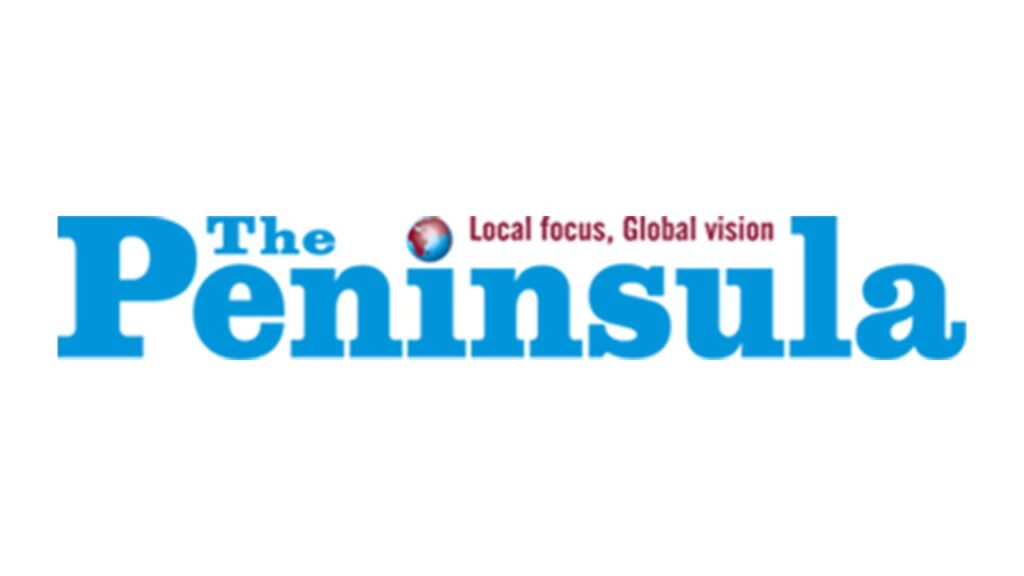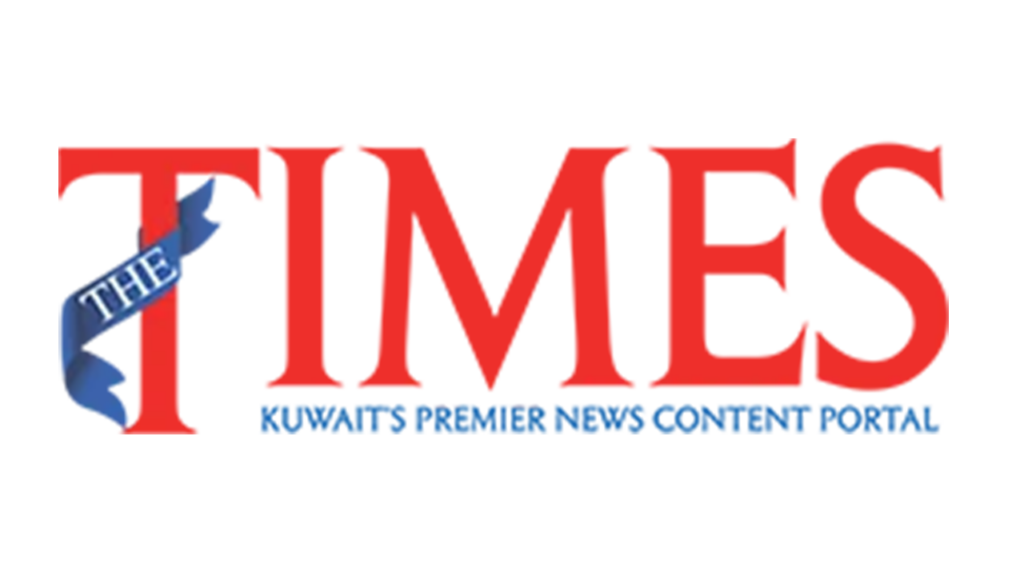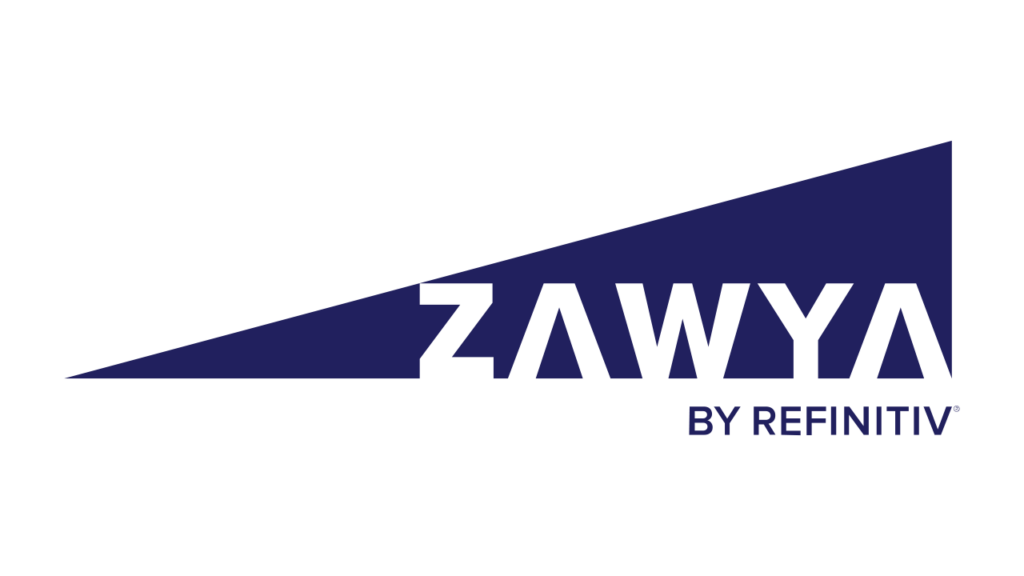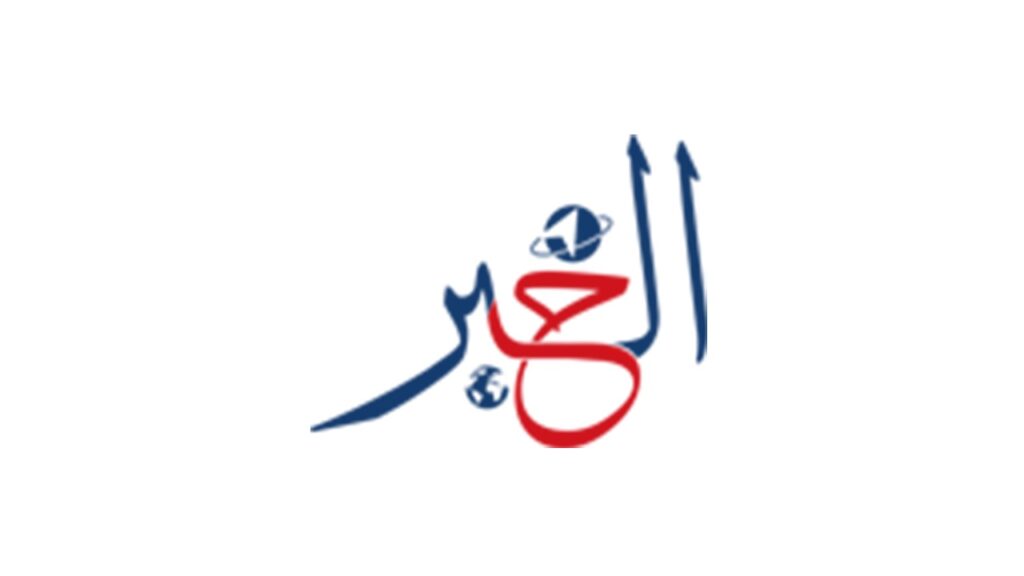Conference Highlights – Sustaining the Oasis: Envisioning the Future of Water Security in the Gulf
HIWARAAT CONFERENCE SERIES
Sustaining the Oasis: Envisioning the Future of Water Security in the Gulf
November 12-13, 2023
Countries in the Gulf and across the region are at a pivotal intersection of cultural, political, and environmental challenges, particularly on the pressing issue of water security in a changing climate. This conference, hosted by Georgetown University in Qatar and The Earth Commons—Georgetown University’s Institute for Environment & Sustainability—delves into the historical and future significance of water in the region, and charts a path towards sustainable water security that meets both human and ecological needs.
- 49 Speakers
- 793 Attendees
Day 1
Opening Remarks
With COP28 just weeks away, ours is an incredibly timely dialogue and the high-level findings from this conference will be shared with the COP28 Presidency team in support of water-related efforts.”
— Dr. Raha Hakimdavar, Senior Advisor to the Dean, GU-Q and Earth Commons Institute
Keynote Address by Malcolm Gladwell
Malcolm Gladwell is the author of five New York Times bestsellers — The Tipping Point, Blink, Outliers, What the Dog Saw, and David and Goliath. He is also the co-founder of Pushkin Industries, an audio content company that produces the podcasts Revisionist History. Gladwell has been included in the TIME 100 Most Influential People list and touted as one of Foreign Policy’s Top Global Thinkers.
“One of the mistakes we make is to treat every one of the problems we face as an ordinary problem. And to assume that it is not necessary to be urgent or disagreeable…There’s a tipping point in Amazon deforestation, which we are perilously close to, where the ecosystem in the Amazon will change very quickly from a rainforest to a kind of savannah with devastating consequences for the planet…It’s not a normal problem. It’s something that’s going to change overnight and we can’t approach it with that same mindset if we expect to have any kind of positive outcome.”
Dean Safwan Masri in Coversation with Malcom Gladwell
Gladwell: “There is something very wrong with the way we are framing the problem…The debate in the United States, for example, over hurricaine risk in Florida, has been going on for a long time. It has only gotten traction very recently when insurers said ‘you know what, we are not going to sell you home insurance anymore.’ All of a sudden, all kinds of people who were shrugging this off were standing up and taking notice. It’s the same message that all kinds of other people were saying, but its come from a different place, for different reasons, with different immediate consequences, and that somehow broke through people’s intuitive notion that this was a gradually unfolding problem.”
Masri: “You’re talking about educating them, you are talking about shaking them up, a shock factor that gets them to act, right?
Gladwell: “There is way too little encouragement on this issue…if you give people too many dire warnings about what is going to happen, there is a real danger that they will simply give up… a portion of what looks like denial is people who accept there is a crisis but have given up hope…people who say yeah but you’ve given me absolutely no reason to believe that we can address this issue in the time frame you’ve given me….Maybe there is a lot of people who just need to be encouraged that something could be done, that we have made progress already.”
Masri: “It establishes trust doesn’t it, because there is a lot of mistrust.”
Gladwell: “Yeah.”
Water Security and Stability in the Gulf Region
Chaired by Georgetown University Professor Dr. Marcus King, this panel discussed policy pathways to maintain water security in the region in the face of climate change, rising demand, and geopolitical instability.
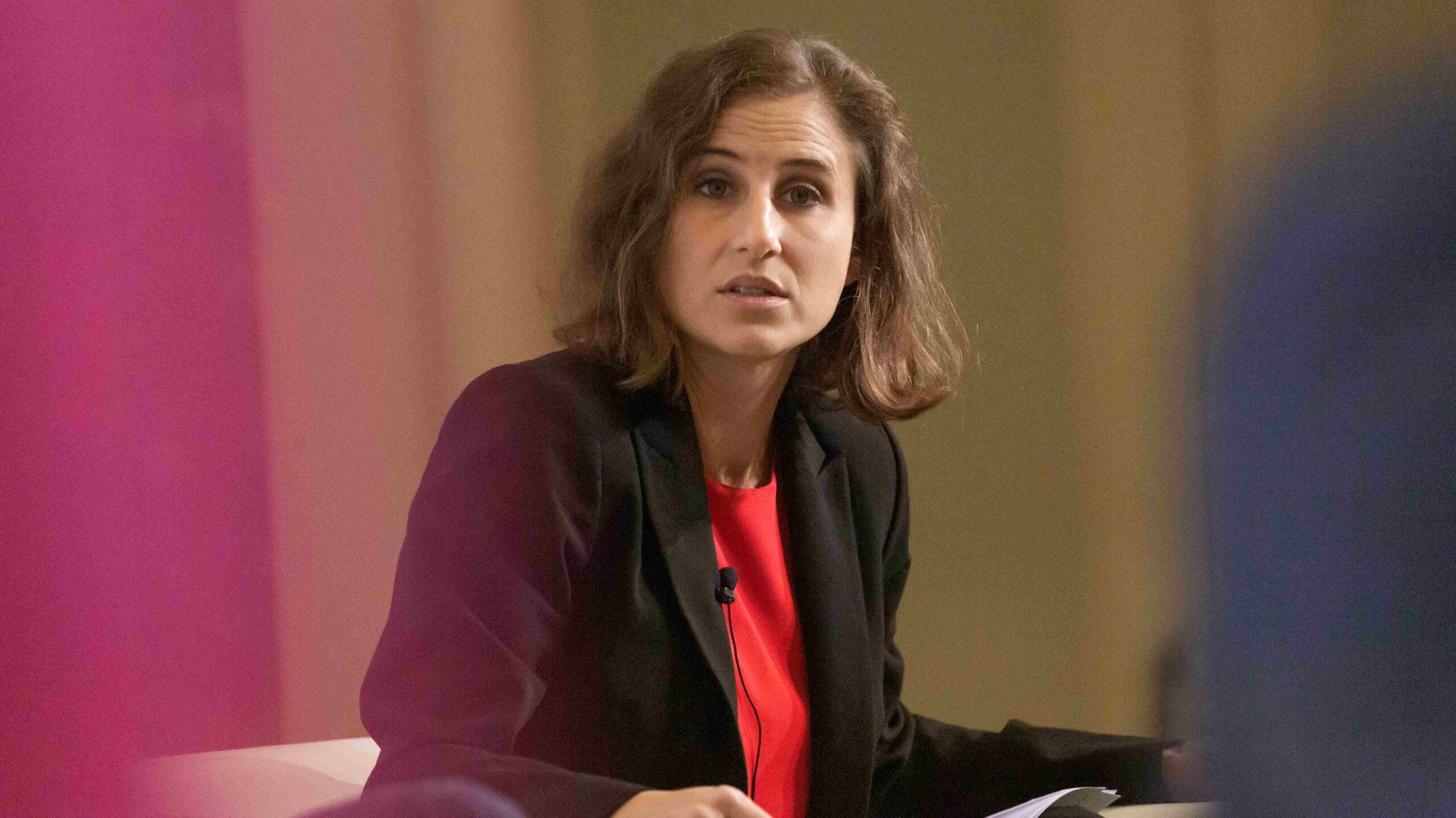
Natasha Hall, Senior Fellow, Center for Strategic and International Studies
“In the Gulf of Oman is the largest Marine Dead Zone in the world…and scientists knew that it was bad, but they couldn’t tell how bad it was until just a few years ago. And that’s because piracy and insecurity at the surface prevented scientists from actually evaluating it… [It’s] a problem that we see throughout the Middle East, conflict tends to deprive us of looking at some of the other more structural issues at play.”
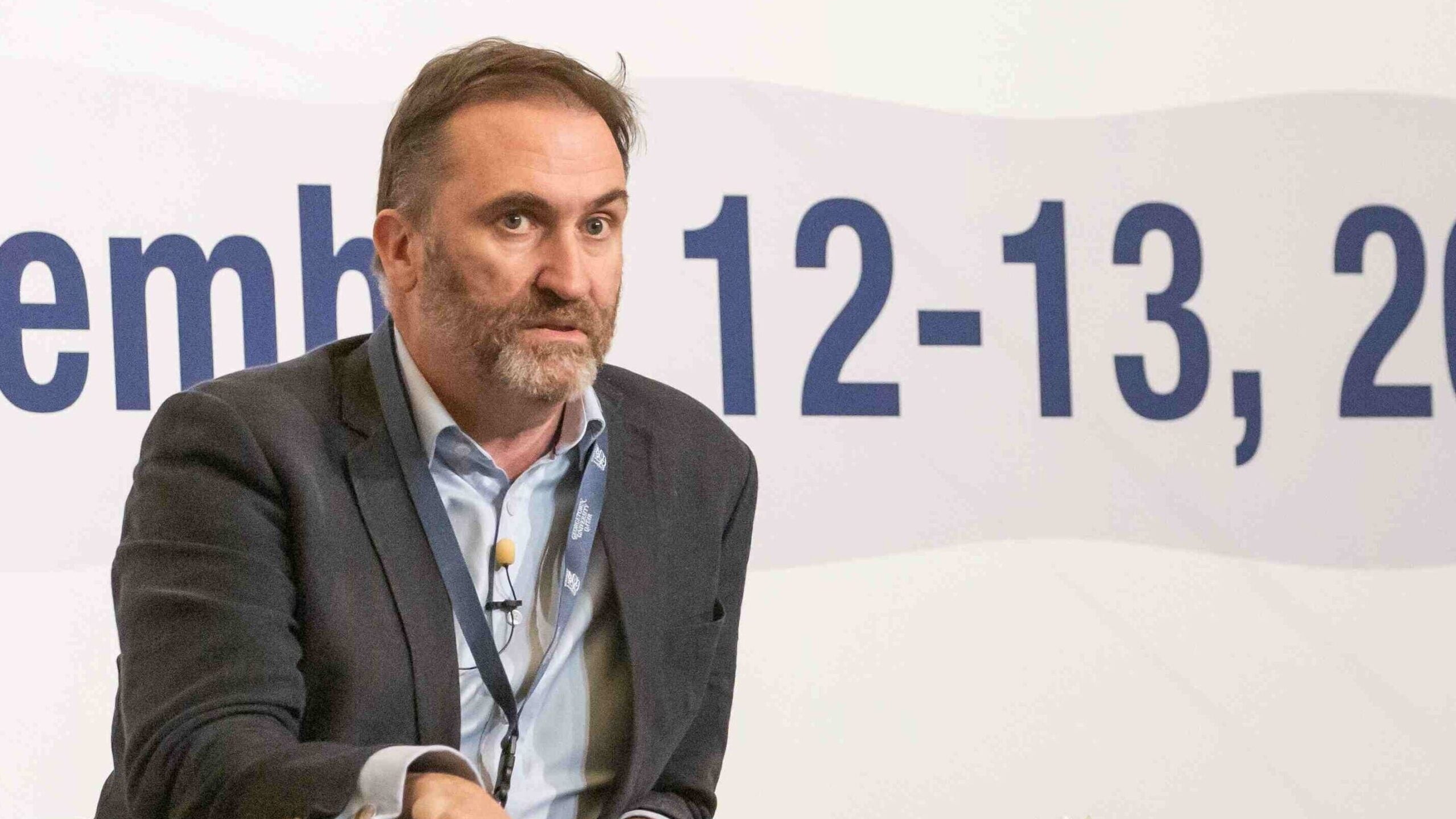
Ciaran O. Cuinn, Director, Middle East Desalination Research Center
“In MDRC, one of our diplomatic mandates is to be a model organization for states that want to use transboundary environments in support of a peace process. We have these issues like water, climate change, desertification, sea level rise, that are of joint concern between states… we create multilateral frameworks, new multilateral approaches and normative systems to improve international relations between the countries in the region.”
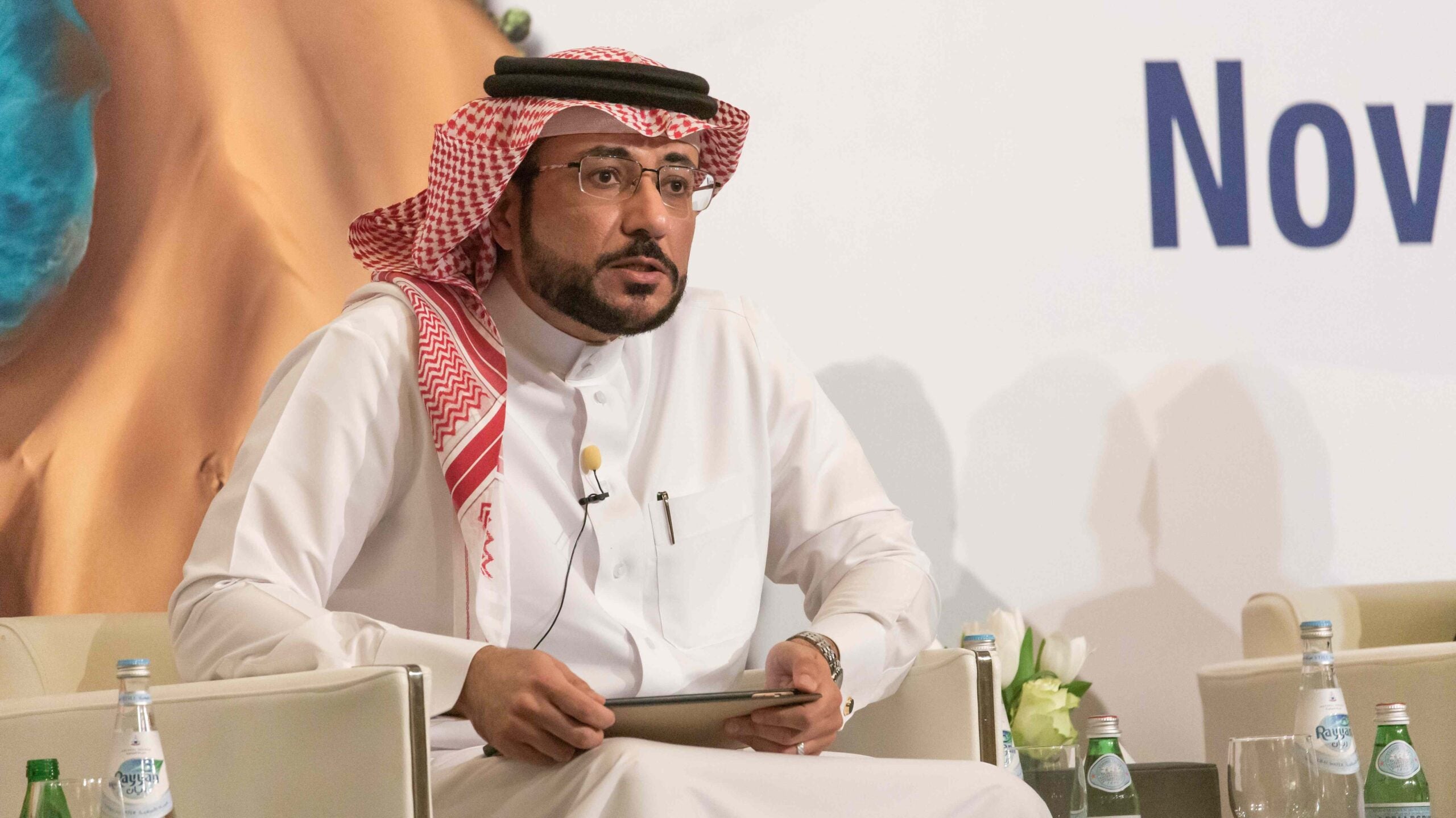
Dr. Hamad Ebrahim Al-Abdulla, Executive Director, Bahrain Center for Strategic, International, and Energy Studies
“It’s crucial to address water stress and resource management in a cooperative and sustainable manner like we are to doing here today. This requires international cooperation affecting effective water governance and the implementation of innovative solutions such as water conservation measures, efficient irrigation techniques…instead of having conflicts within each other about water resources we can work together to improve water resources.”
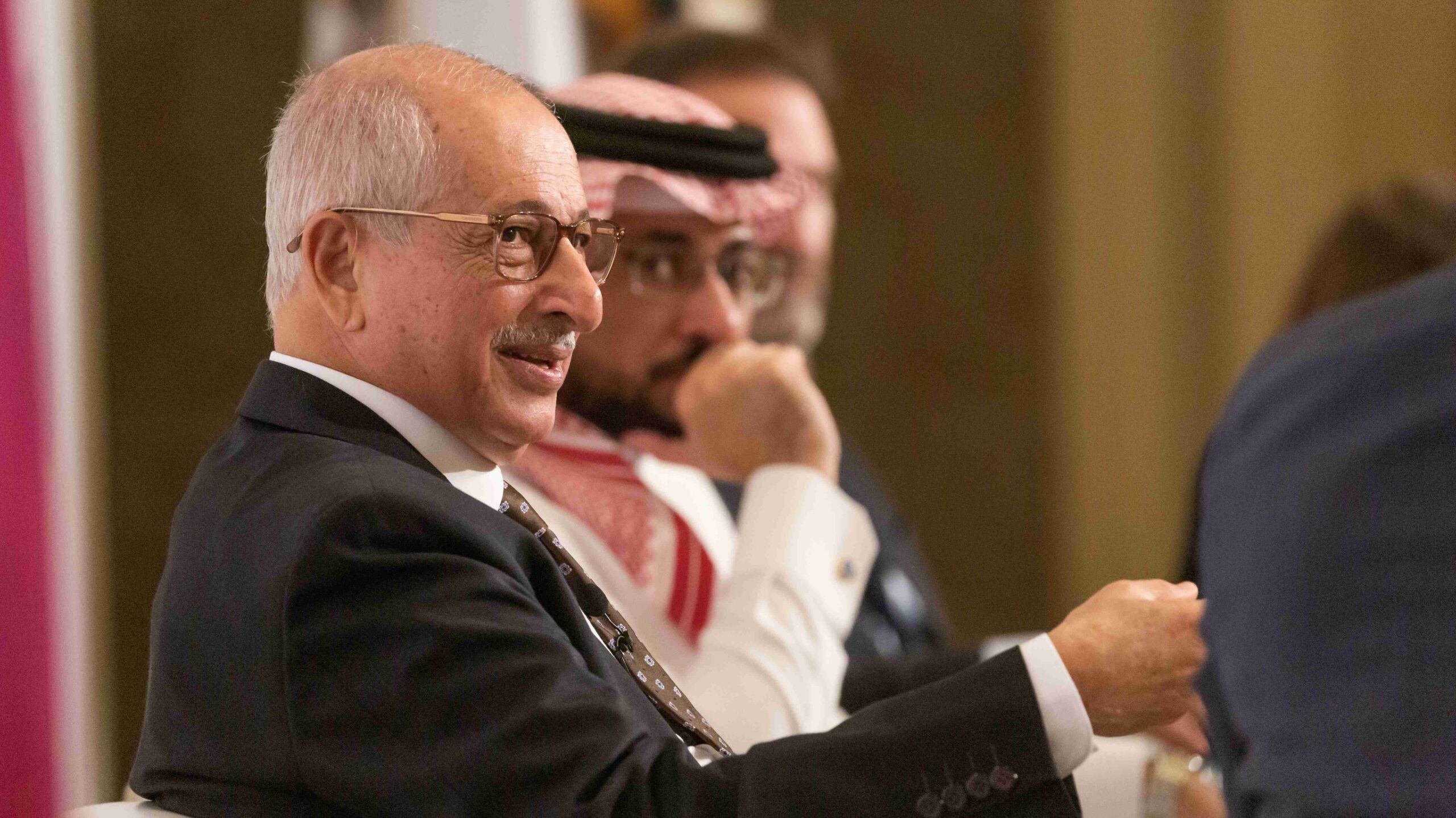
H.E. Abdul-Rahman Al-Eryani, Earthna, Former Minister of Water and Environment, Yemen
“For the hundreds of treaties and agreements that have been signed over water the years, the problem is that about two-thirds of those agreements were signed by North American and European countries. Only about 31 are in Asia including the Middle East, and often those agreements are falling apart…because they were inequitable, unsustainable, non-transparent, and non-binding to begin with. When we think about cooperation we need to think about whether or not it’s sustainable and equitable.”
Navigating the Waters: Qatar’s Odyssey to Water Security and Sustainability
Chaired by Dr. James Olsen, GU-Q, this panel focused on Qatar’s development and investment in water security, the structural challenges it faces, and the model it can provide for other countries in the region.
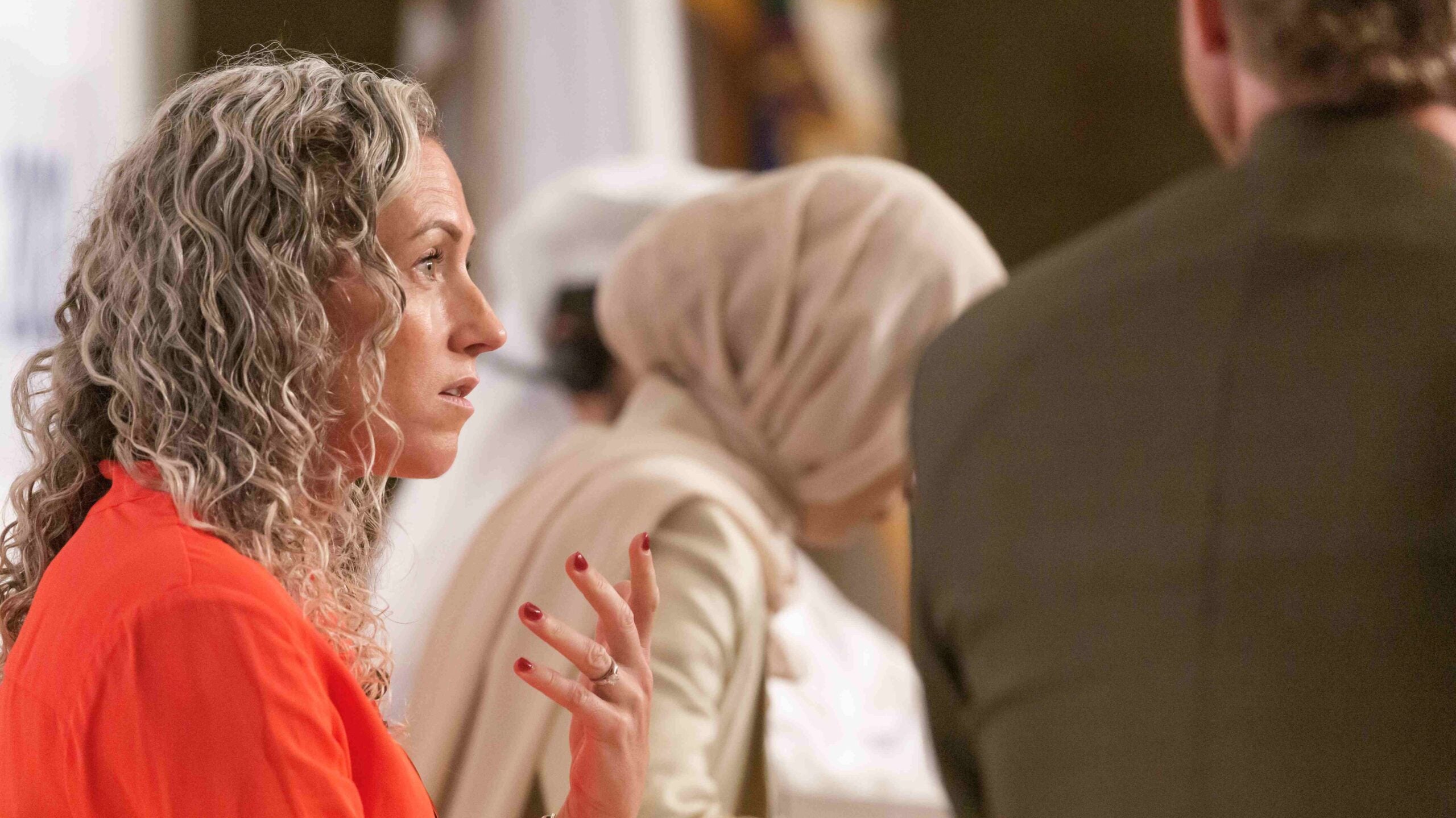
Dr. Jenny Lawler, Senior Research Director, Water Center, QEERI
“Qatar, along with the other Gulf countries has invested significantly in infrastructure… to harness desalination as a sustainable technology… it is the early adoption of countries like Qatar that have enabled this development and the reduction in price and the increase in affordability and accessibility of these kind of technologies for other countries.”
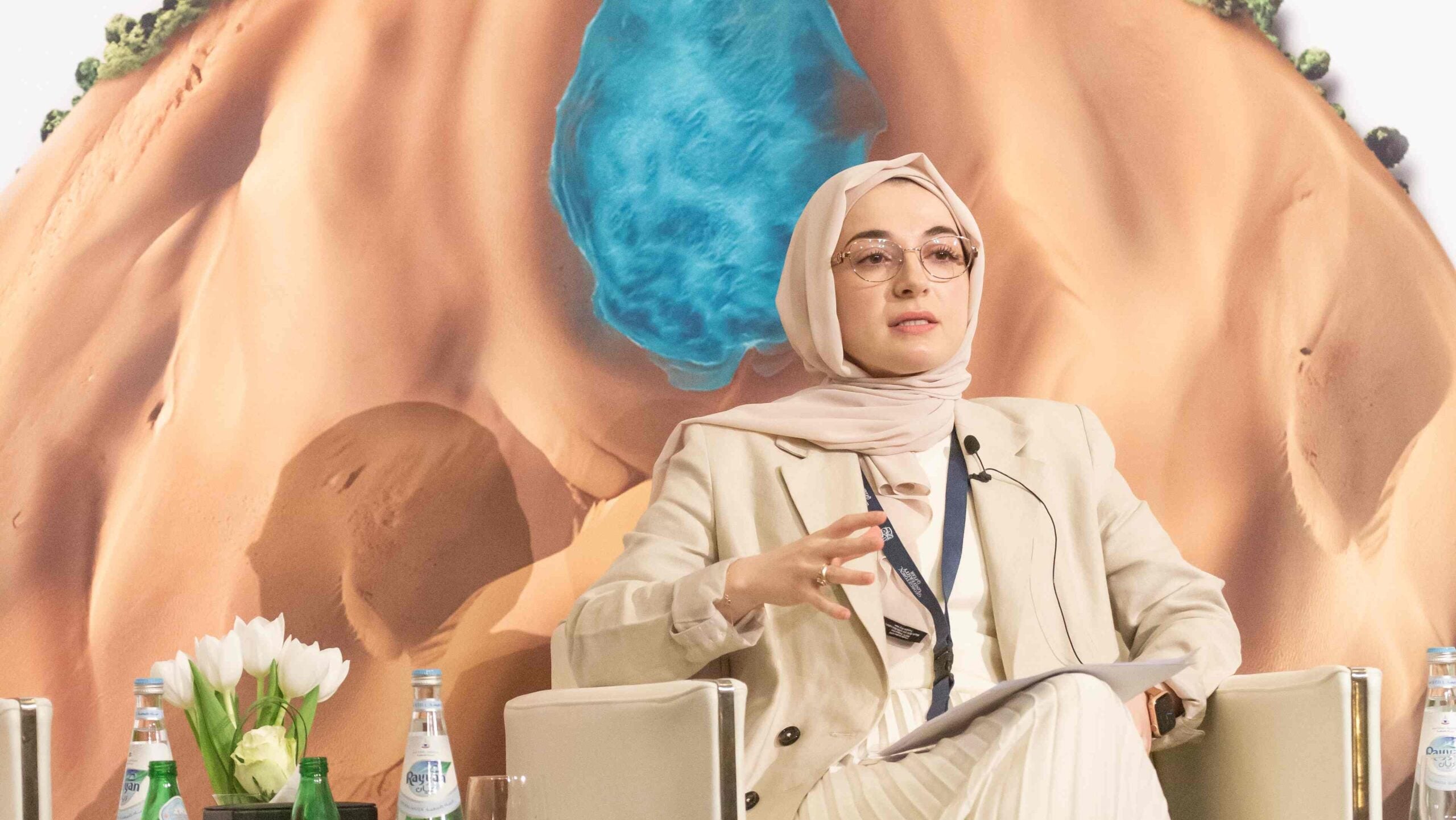
Dr. Deema AlMasri, Senior Policy Associate, Earthna
“Groundwater is being depleted at an alarming rate and we need to secure that…Qatar is a peninsula and the desalination plants lie on the coastal areas of the country so if anything happens…some plants will have to shut down…Qatar does have Water Resources but we also need to diversify them in case of in case of any emergencies and to secure the water and have a sustainable future.”
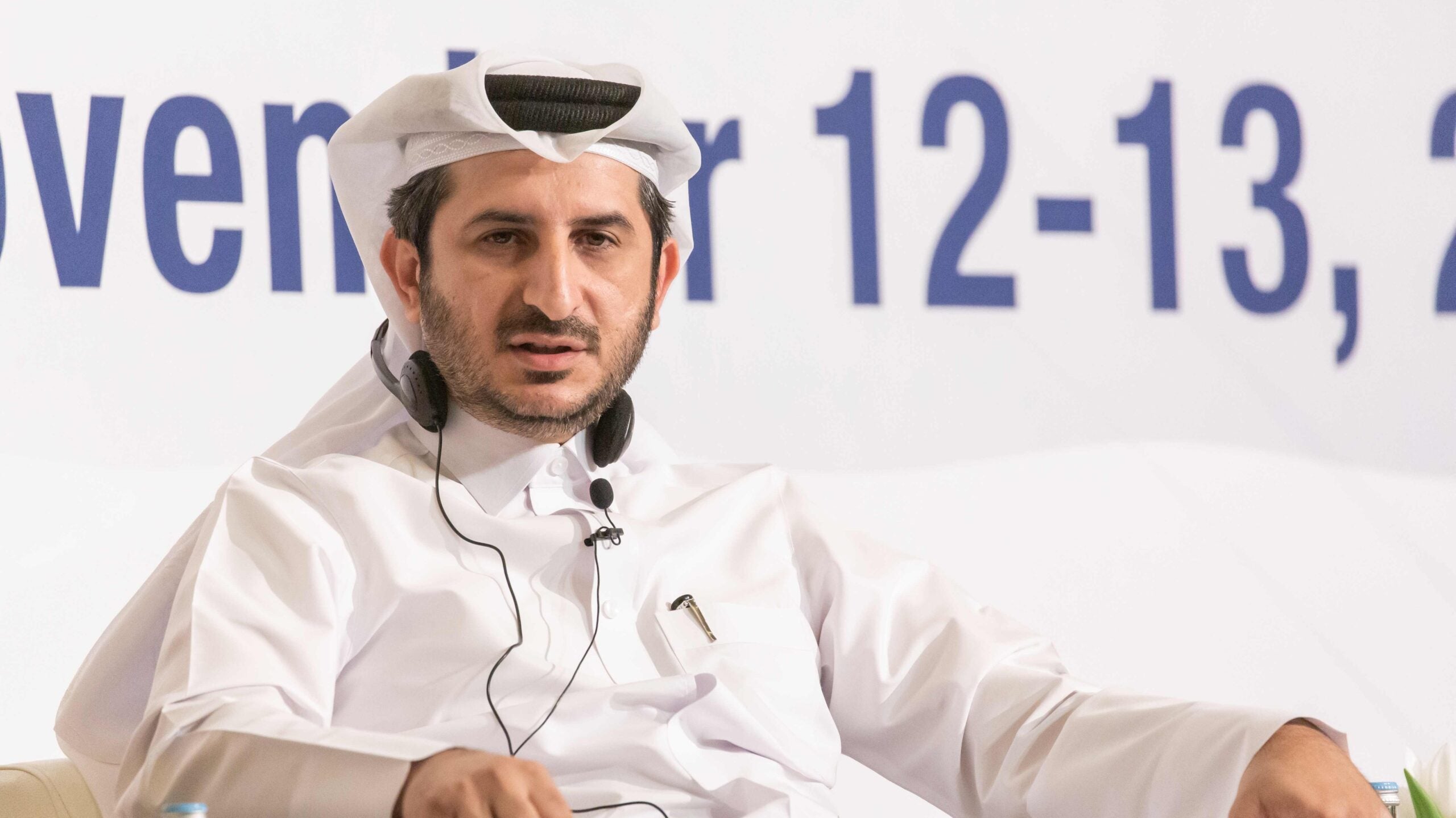
Mahmoud Al-Marwani, Assistant Director of Climate Change, Ministry of Environment and Climate Change
“One of the really nice things about Qatar is it’s approach to the integration between research and development, and the strategy… to inform the national development strategies…and in terms of developing regulations and policy that will support the continued provision of freshwater via sustainable desalination technologies and the protection of the environment.”
Concurrent Sessions
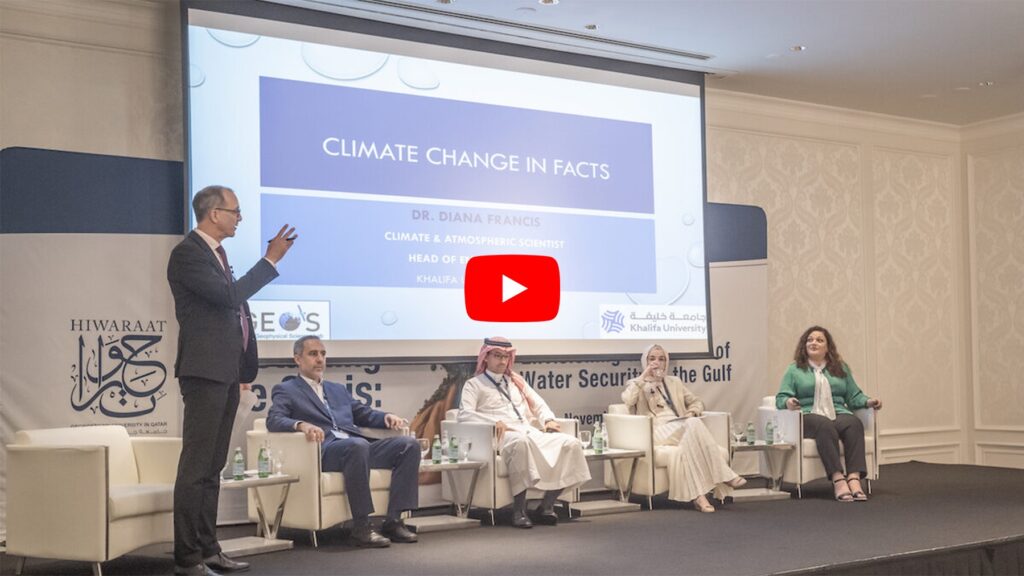
Water Security in a Changing World: Climate Change and New Realities
Co-convened by Earthna, this panel was chaired by Dr. Mark Giordano, Vice Dean for Undergraduate Affairs, School of Foreign Service, Georgetown University, and delved into how the world is changing and what to expect in the future.
Panelists:
Dr. Deema Al Masri, Senior Policy Associate, Earthna
Dr. Sami Al Ghamdi, Associate Professor, KAUST
Dr. Diana Francis, Associate Professor, Head of ENGEOS Lab, Khalifa University
Dr. Mahdi Zarghami, Professor, University of Tehran, University of Sharif Policy Research Institute
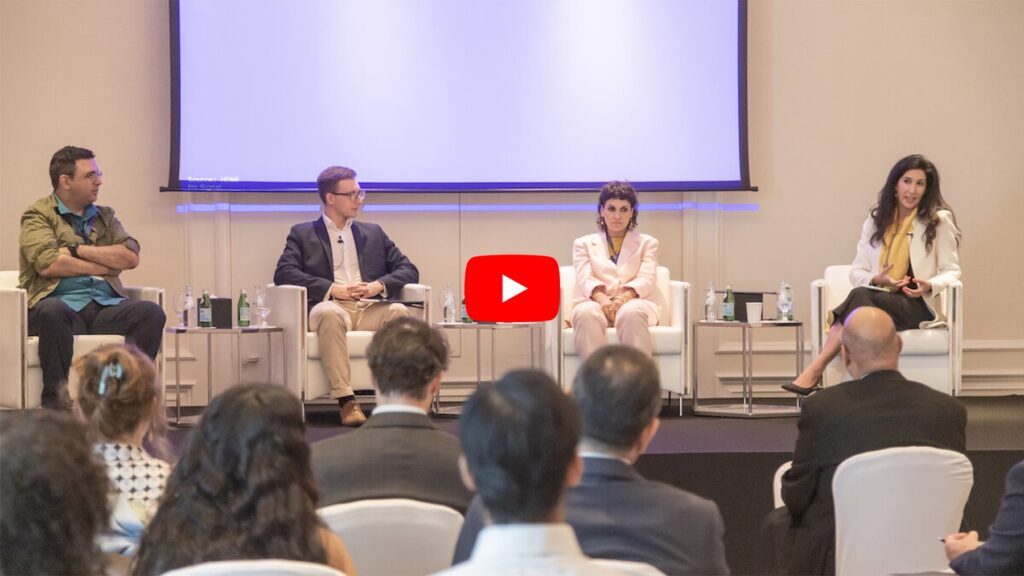
Satellites and Earth Sensing: The Role of Data in Water Security and Governance
Chaired by Dr. Raha Hakimdavar, Senior Advisor, Georgetown University, this panel discussed how data collection can improve predictive models and water governance.
Panelists:
Dr. Essam Heggy, Chief Scientist and Research Director, Earth Science Program, QEERI
Athiye Jawad, Vice President, Development, Planet
Jonathan Hendry, Chief Technology Officer, 4 Earth Intelligence
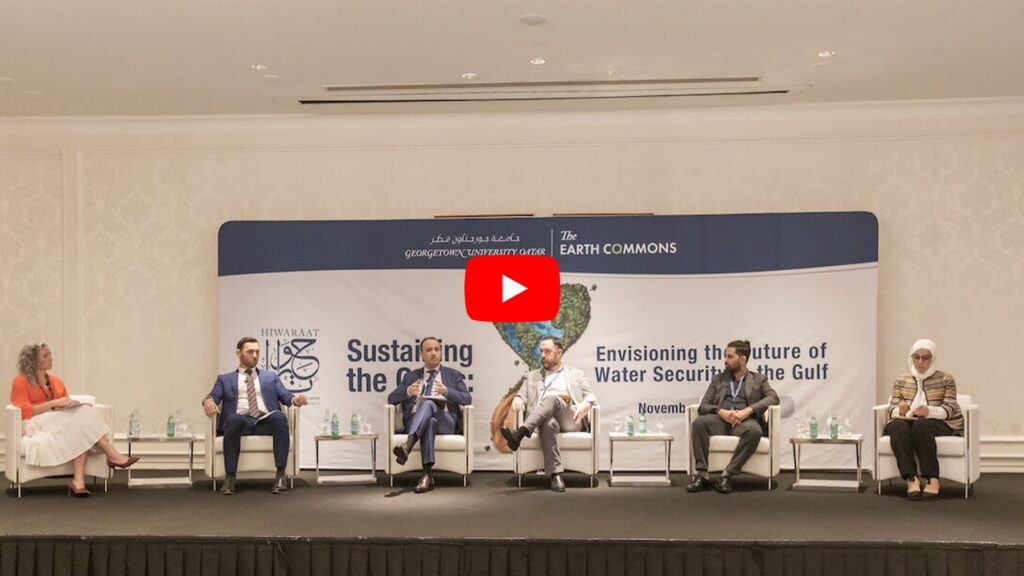
Non-conventional Water Resources for Water Security in Arid Regions
Co-convened by QEERI, this panel was moderated by Dr. Jenny Lawler, Senior Research Director at QEERI.
Panelists:
Dr. Yousef Wehbe, Chief Science Officer, Weather Modification International
Sudhir Sharma, Cofounder and CEO, Greenboom
Mokrane Khaldi, Business Manager, SLB
Stephane Prigent, Head of Wetland Competence Center, Bauer
Dr. Esra Aleisa, Associate Professor, Kuwait University
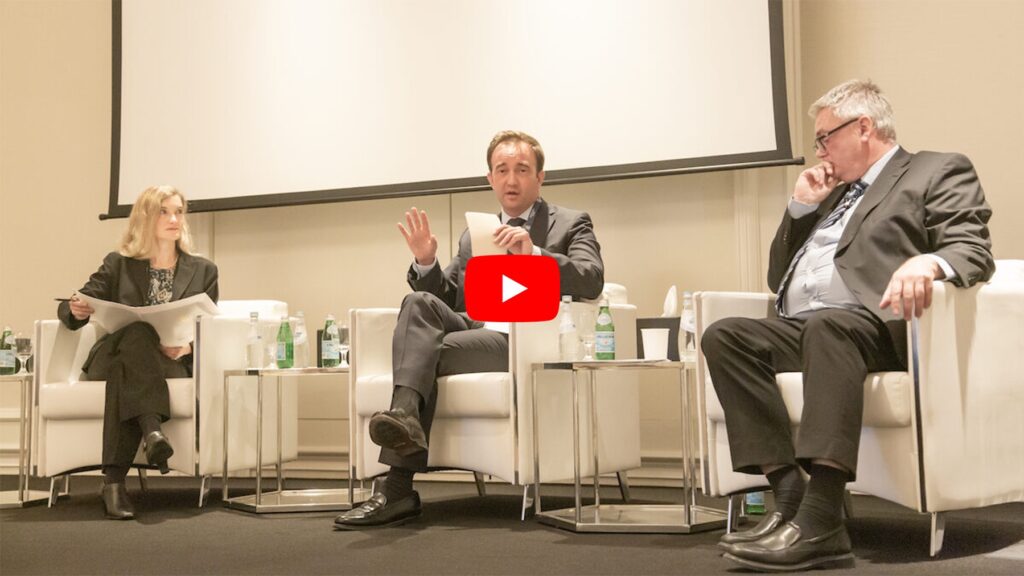
Innovative Financing for a Water Secure Future
Chaired by Breeann McCusker, US Foreign Service Officer at the US Embassy in Qatar, this panel looked at water project financing.
Panelists:
Scott Rickards, CEO, Waterfund, member organization of the Qatar Water Exchange
Bernd Eckardt, General Manager, Al Wakra Water Contracting Company
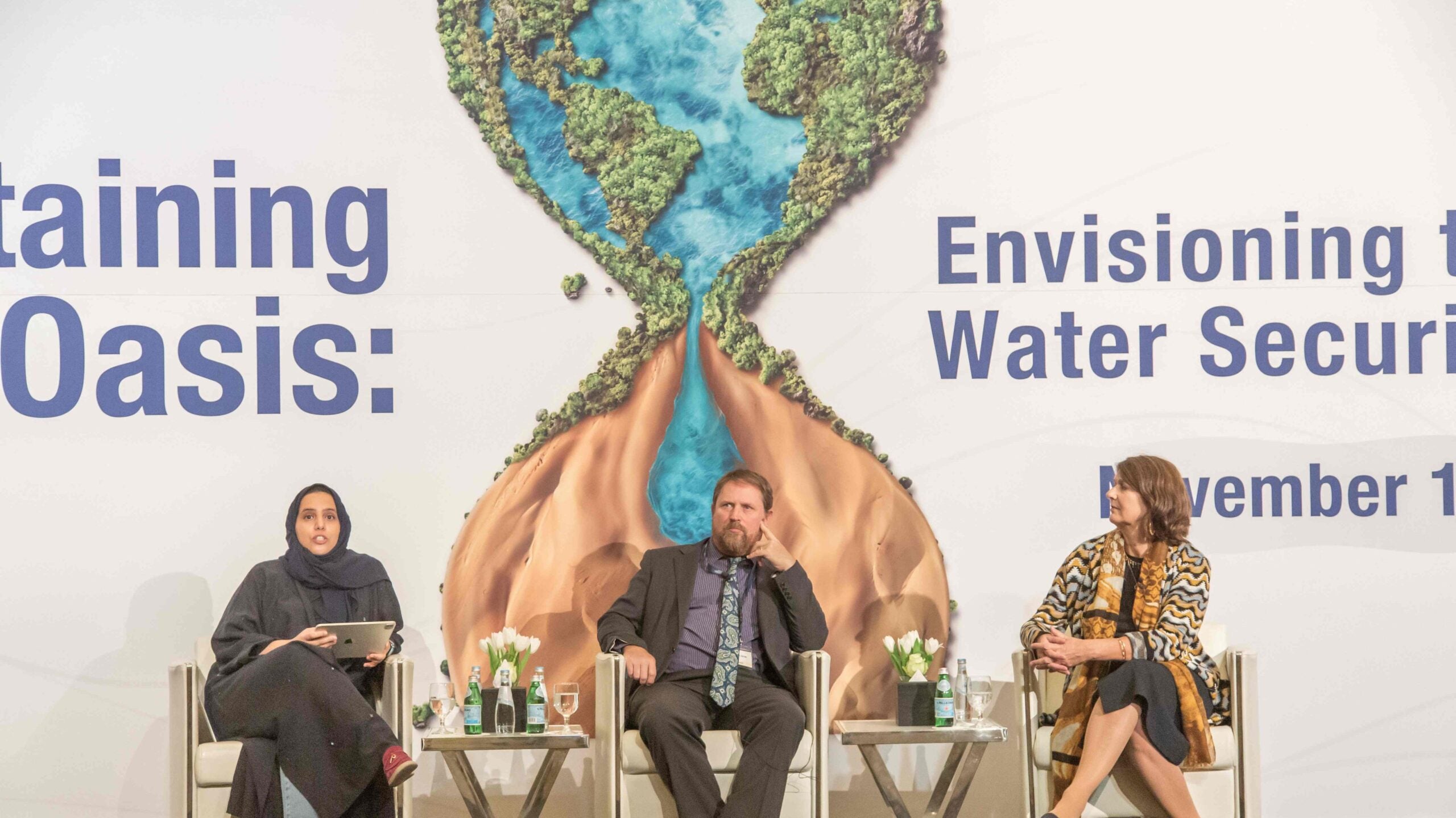
Fireside Chat: Water Stewardship, Islam, and Cultural Heritage
Moderated by Sheikha Nouf Mubarak bin Saif Al-Thani (SFS’12), Head of Strategic Insights, Chairperson’s Office, Qatar Museums, this panel explored principles of sustainability found in Islamic principles and Arab cultural heritage.
Panelists
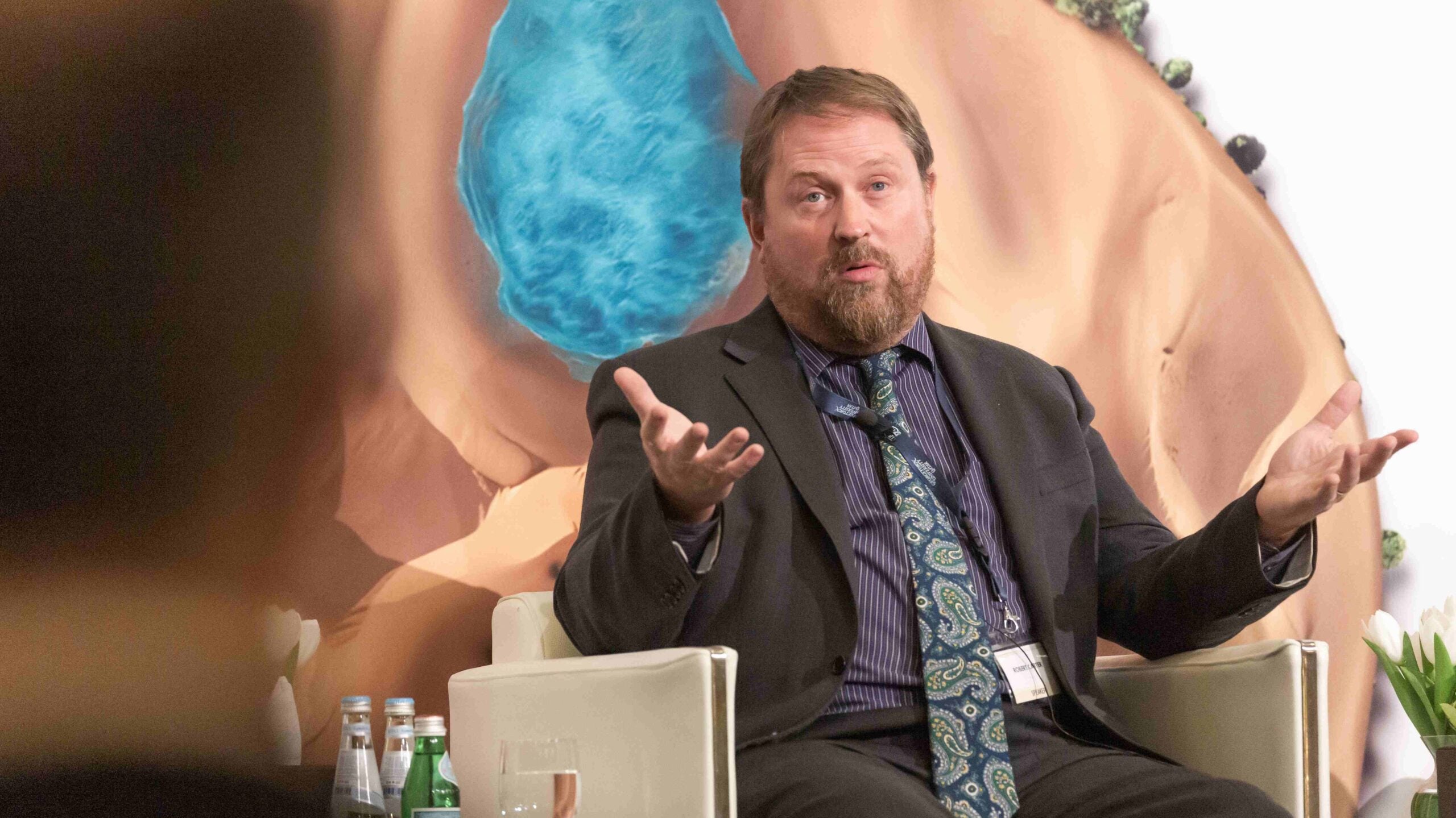
Dr. Robert Carter, Senior Archeology Academic and Fieldwork Development Specialist, Qatar Museums
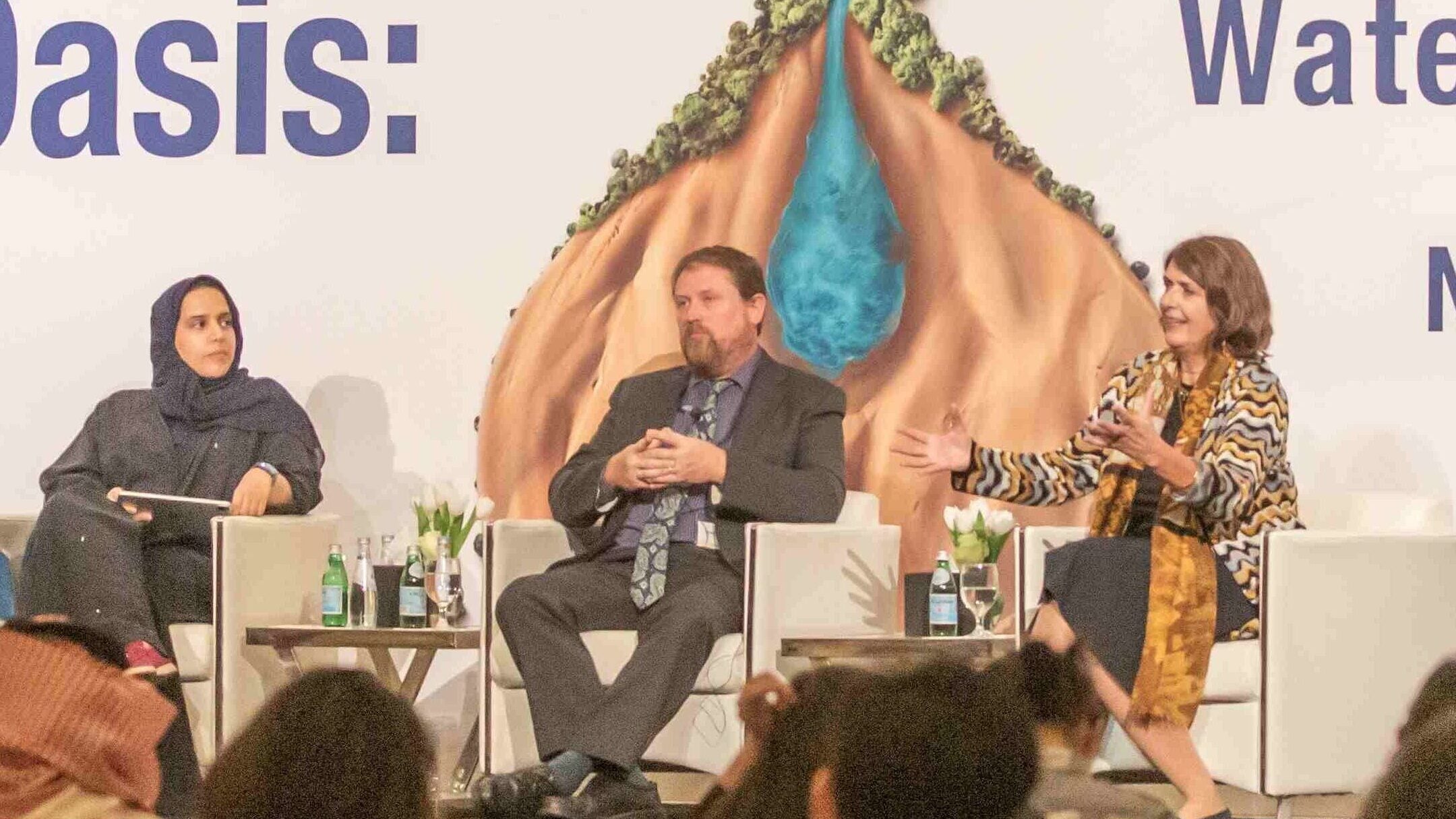
Dr. Julia Gonnella, Director, Museum of Islamic Art
Day 2
Opening Remarks
Dr. Raha Hakimdavar, Senior Advisor to the Dean of GU-Q and the Dean of the Earth Commons Institute
“There has historically been a deep appreciation of the role of water in the Gulf region. We have been negotiating and compromising with nature for centuries. But today, the region is facing a lot of new challenges. The Gulf is particularly sensitive to the challenges posed by water security in the face of a changing planet. Six of the 10 most water-stressed countries are in the region. Facing this challenge requires an interdisciplinary and collaborative approach, one that connects cutting-edge science, technology, and innovation with policy, governance, and politics.”
H.E. Ferdinand Lahnstein, Ambassador of the Kingdom of the Netherlands to the State of Qatar
“Although the context of the Netherlands is very different from the Gulf region, we share the same challenges. Climate adaptation is beyond a technical challenge, we have to think out of the box and take social risks in order to successfully adapt.”
COP28 and the Water Agenda: From a Regional to Global Perspective
Chaired by Dr. Natasha Hall, Senior Fellow, Center for Regional and International Studies, this high-level panel tackled the intersection of local and global concerns about water, and the top priorities for the COP28 water agenda.
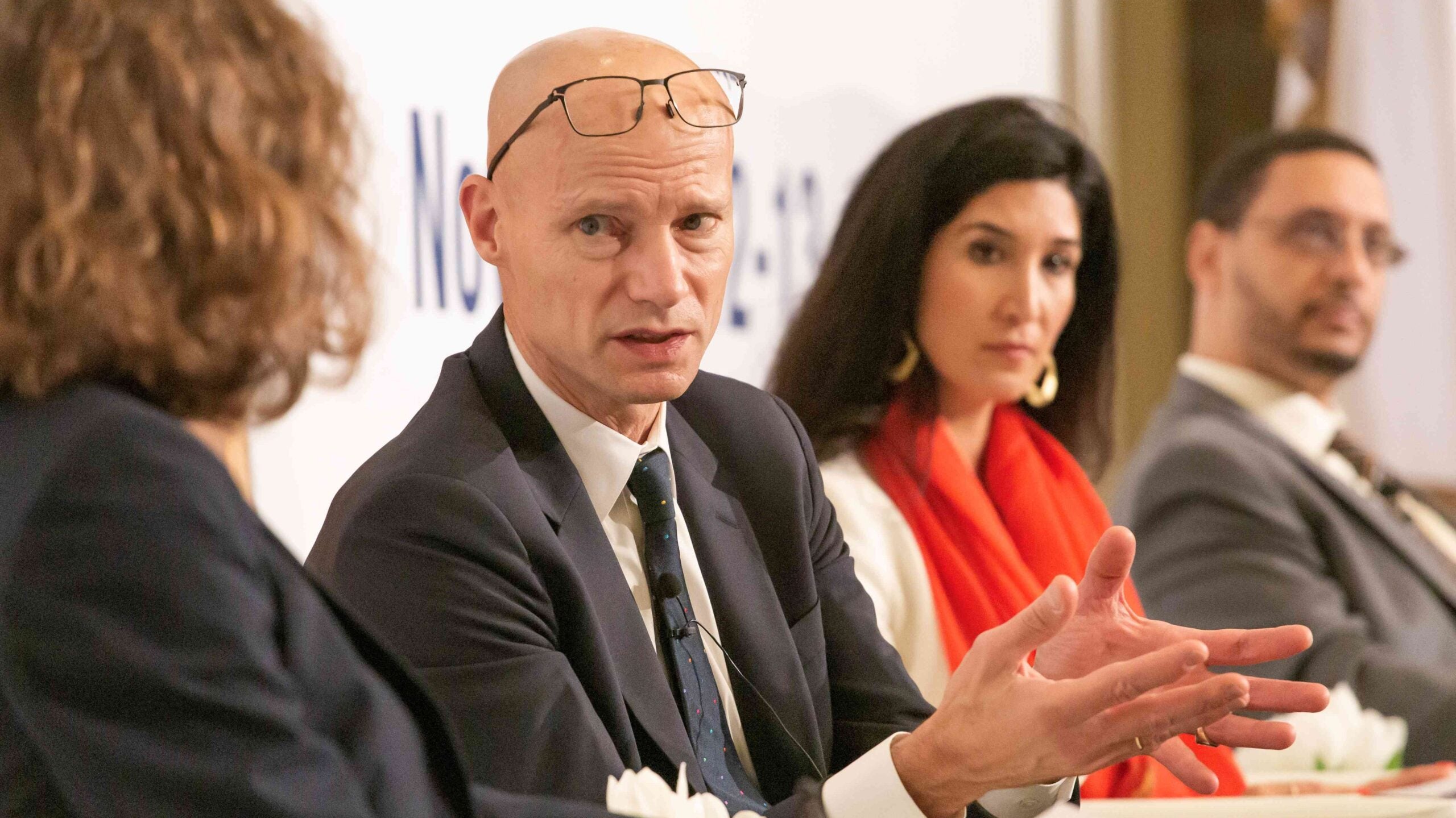
Henk Ovink, former Dutch Special Envoy for International Water Affairs
“As the negotiations become more and more complex, we focus on solutions…Water, with its interlinkages with food security, energy security, and biodiversity, will play a key role in showing that, if we want to change course in the context of climate change, water is the best driver.”
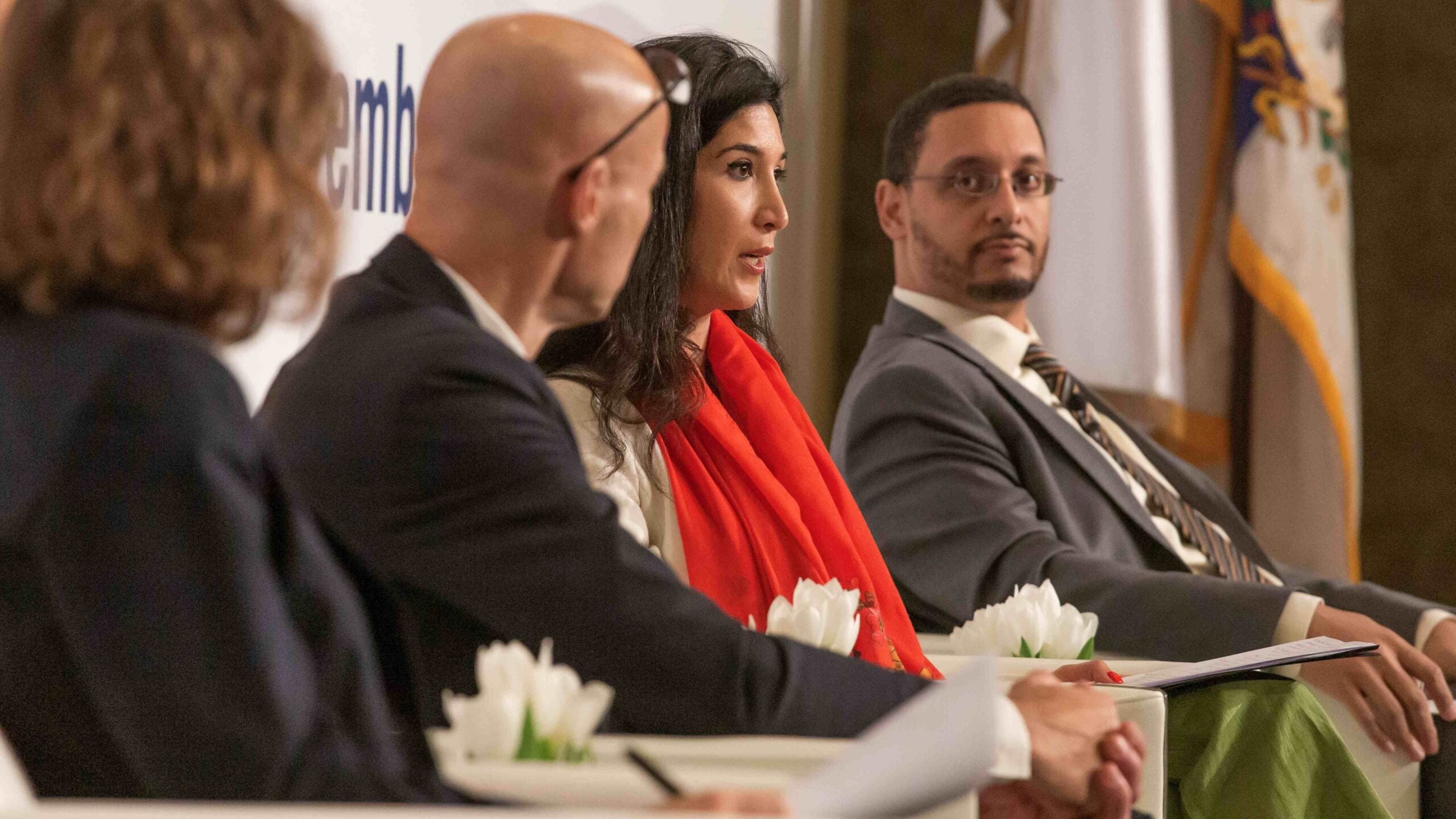
Dr. Raha Hakimdavar, Senior Advisor, GU-Q and Earth Commons
“[Scientists] haven’t had enough engagements and involvement at the climate COP, and conversely, we haven’t had enough technologist and solution providers…that means finance, that means data, that means technology, and innovation in public-private partnerships…and it means science: scientifically robust decisionmaking.”
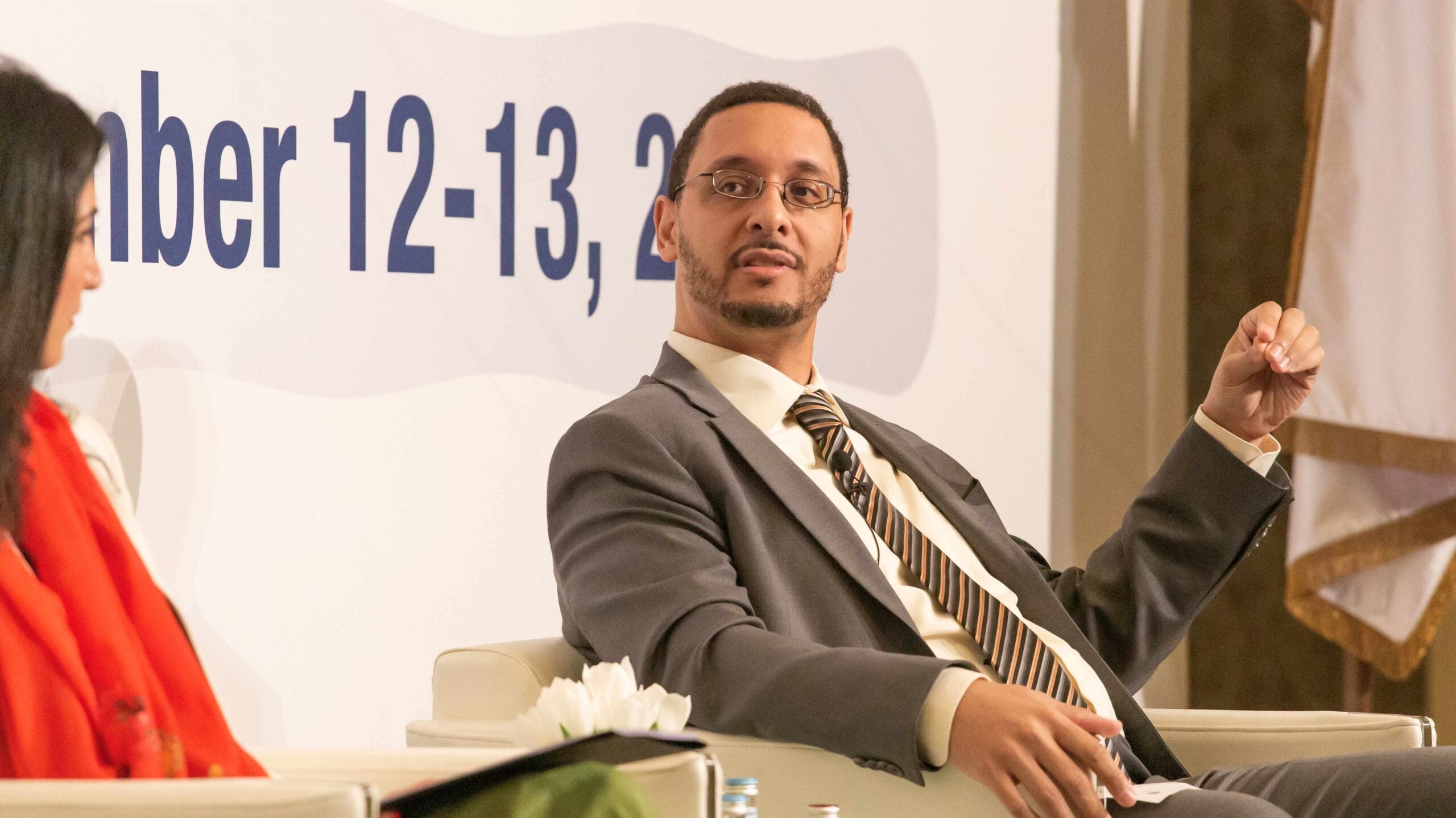
Dr. Mohammed Mahmoud, Middle East Institute
“At the UN level, water is viewed with such a thin lens…Water issues aren’t just about water quality and food production…it’s about water supply…it’s about water demand…and the least paid attention to…how do you get water from where it is to where it needs to go…because as you are transporting water, there’s always the component of water loss.”
Water, Biodiversity, and Nature-Based Solutions
This high level panel, chaired by Dr. Peter Marra, Dean of Earth Commons Institute, looked at what we can learn from nature to inform technologies and policies that preserve water, habitats, and biodiversity.
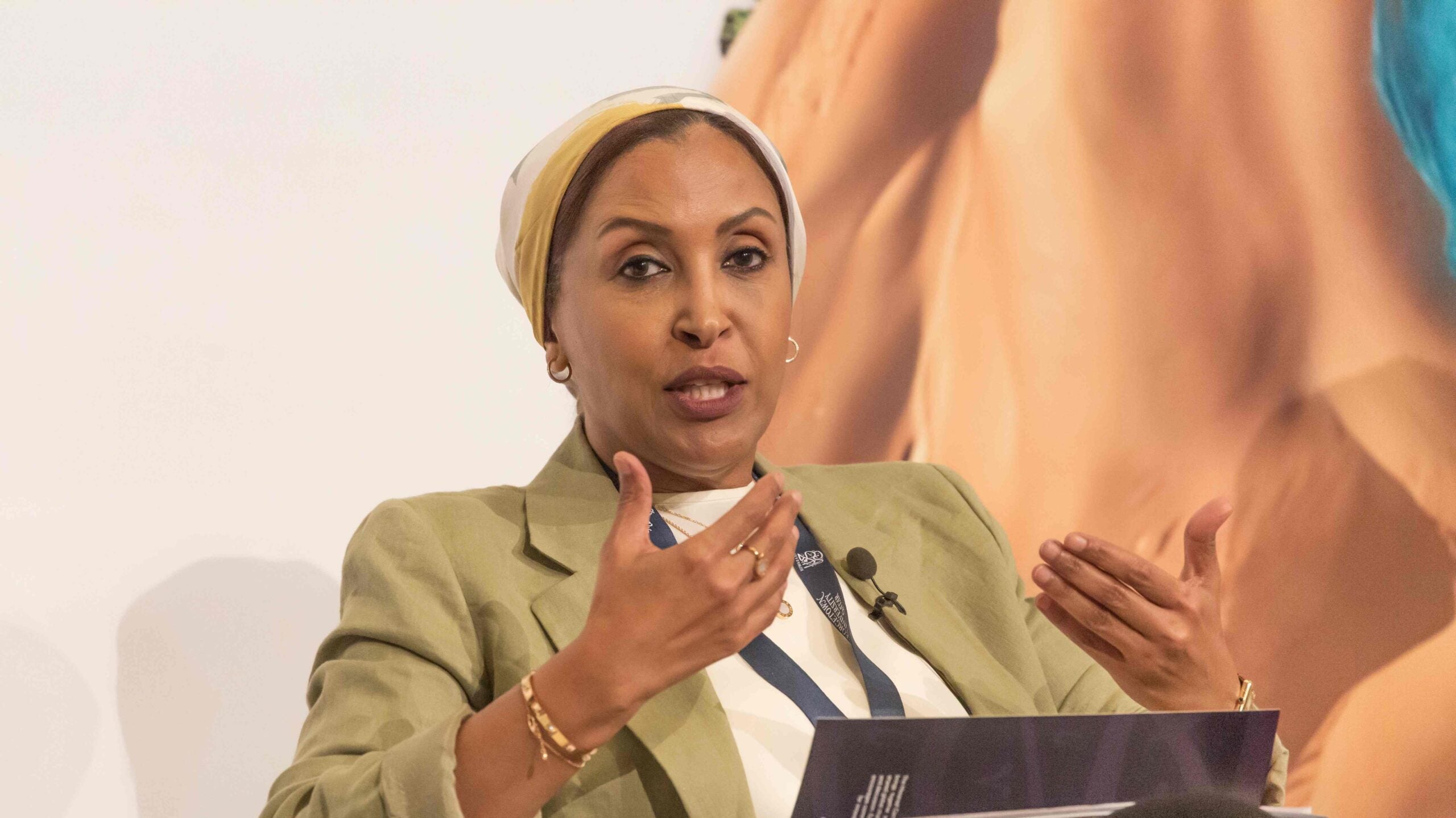
Dr. Suhur Saeed, Water Management Lead, Exxon Mobil
“We’re turning now to nature-based solutions because of their inherent diversity and the flexibility…one of the things that we’re working on is constructed wetlands… for the primary goal of treating water through the plants that are taking up the nutrients from the water but also filtering out suspended solids…enabling that water reuse.”
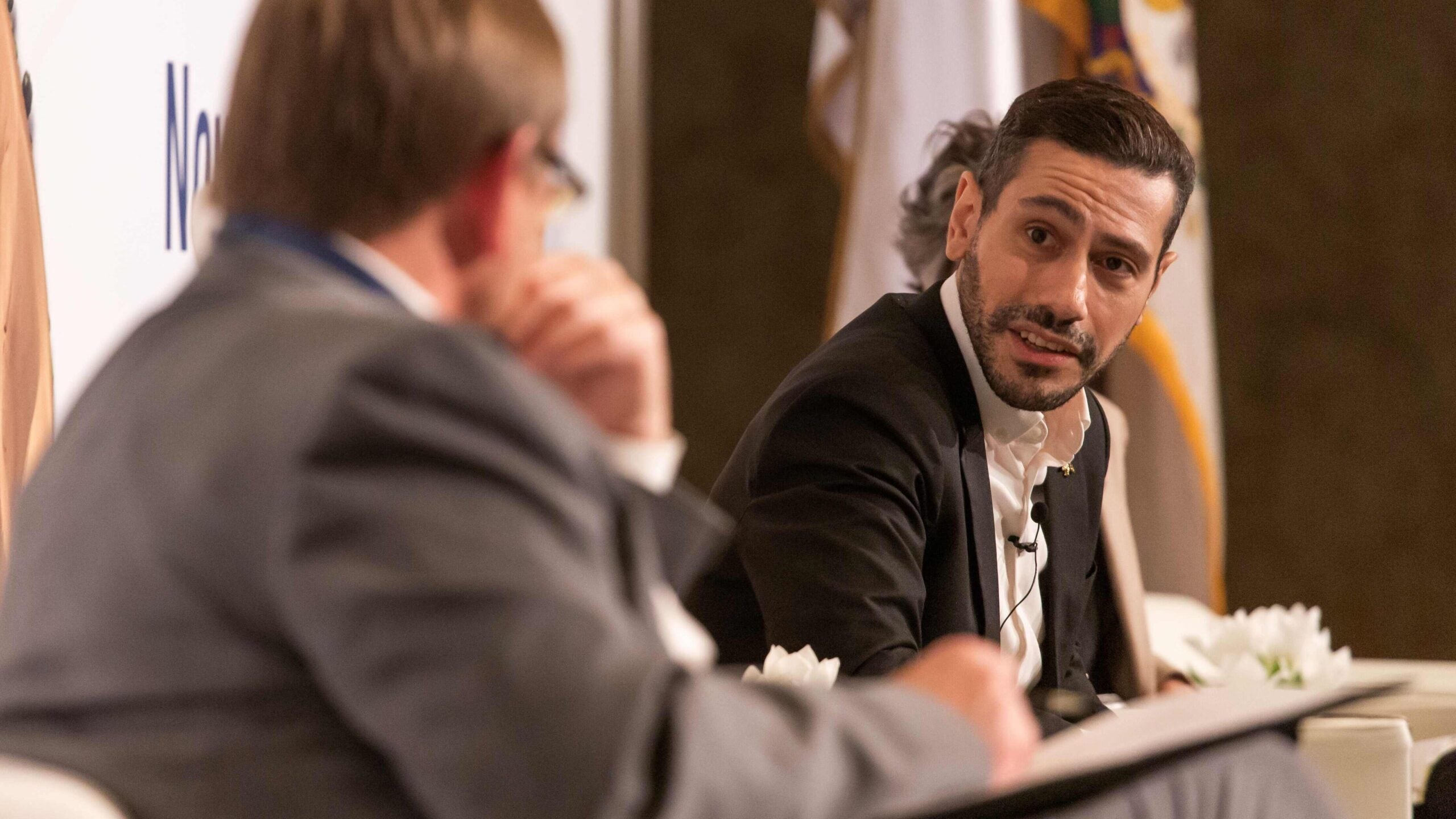
Tariq Al-Olaimy, Co-Founder and Managing Director, 3BL Associates
“Nature doesn’t just require our protection, nature requires our active collaboration and when we look to restore ecosystems we’re actually also reclaiming our ability to collaborate… it comes from this acknowledgement that our economies are not standalone constructs…100% of GDP, 100% of human innovation is entirely dependent on nature, it’s entirely dependent on water it’s entirely dependent on the 8 million plus other species that we share this beautiful planet with.”
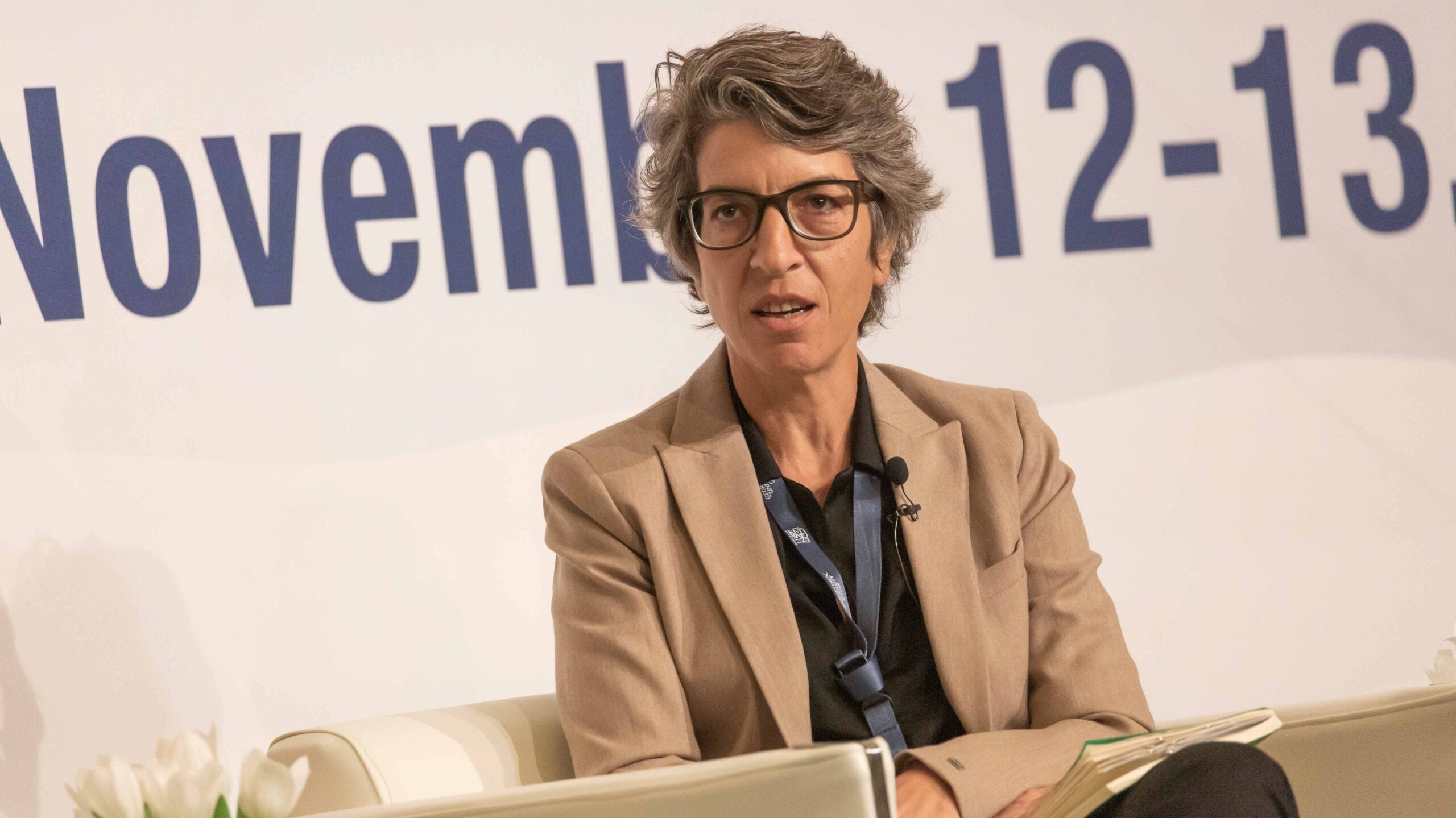
Dr. Aspa D. Chatziefthimiou, Ecological Research Consultant, Earthna
“The major threat to biodiversity worldwide is habitat loss…The good thing is that we are creating artificial habitats…in Qatar the Al Karaana lagoons, these are very big ponds where treated sewage effluent is being stored before it can be transported to be used for irrigation in parks and farms or for animals, so these are hotspots of biodiversity, and another artificial habitat is oil rigs and this is very beneficial because its a security sensitive area, a de facto protected area.”
Water-Food Nexus: The Geopolitics of Food Security in the Gulf
Zahra Babar, Associate Director of Research at the Center for International and Regional Studies at GU-Q, chaired this high-level panel looking at the intersection of water, food, and security in the region.
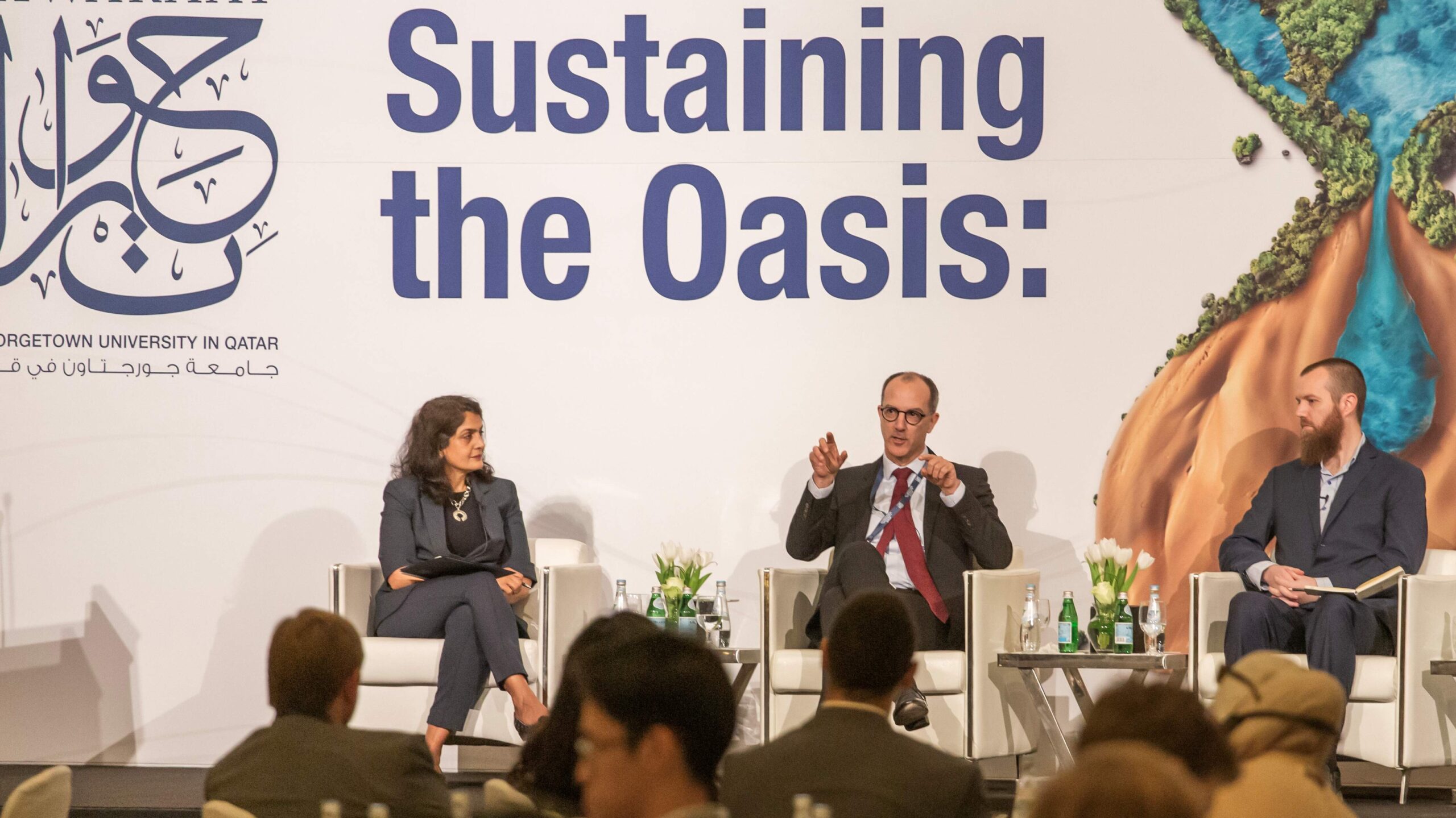
Dr. Mark Giordano, Vice Dean for Undergraduate Affairs, School of Foreign Service, Georgetown University
“The majority of [water consumption] is coming from what was used to produce agriculture… of global calories 60% are wheat, rice, corn, and soybeans, and if you look at where those are produced it’s maybe eight pretty small regions of the world which produce more than half of all of those, and then once those are produced when they go into the the trade system and they go through maybe five sets of ports and rail systems…so water, food, and geopolitics are completely intertwined.”
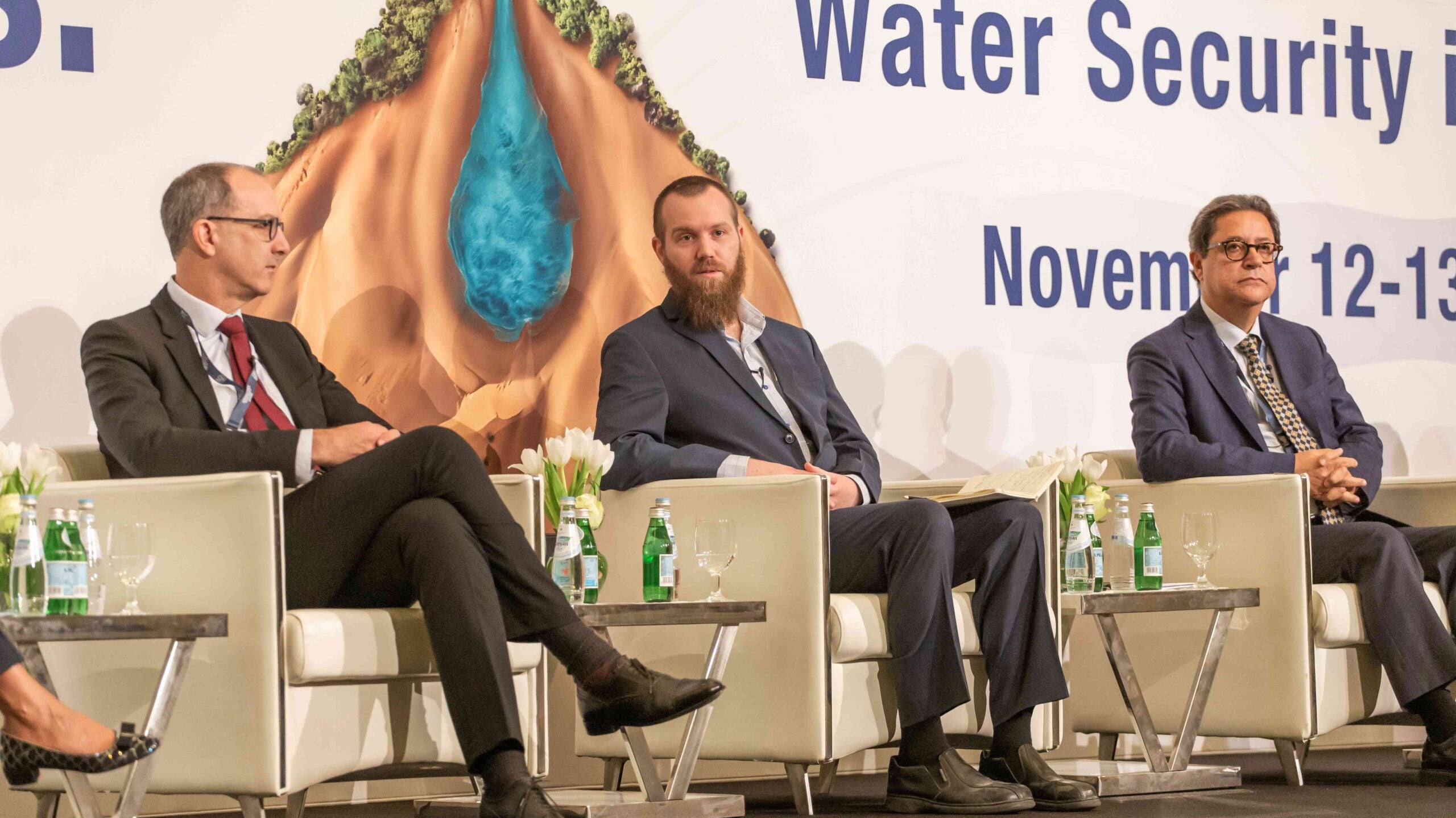
Dr. Logan Cochrane, Associate Dean for Academic Affairs, HBKU
“There is a food security strategy for the State of Qatar [which includes] expanding and being much more evidence-based on having a national strategic food reserve… increasing domestic production…an efficient marketplace that distributes the materials that you produce as well as those that you’re importing…diversification of imports over the long term…and enabling infrastructure: this includes ports, aviation and logistics infrastructure, highways, roads, and it includes developing the free zones.”
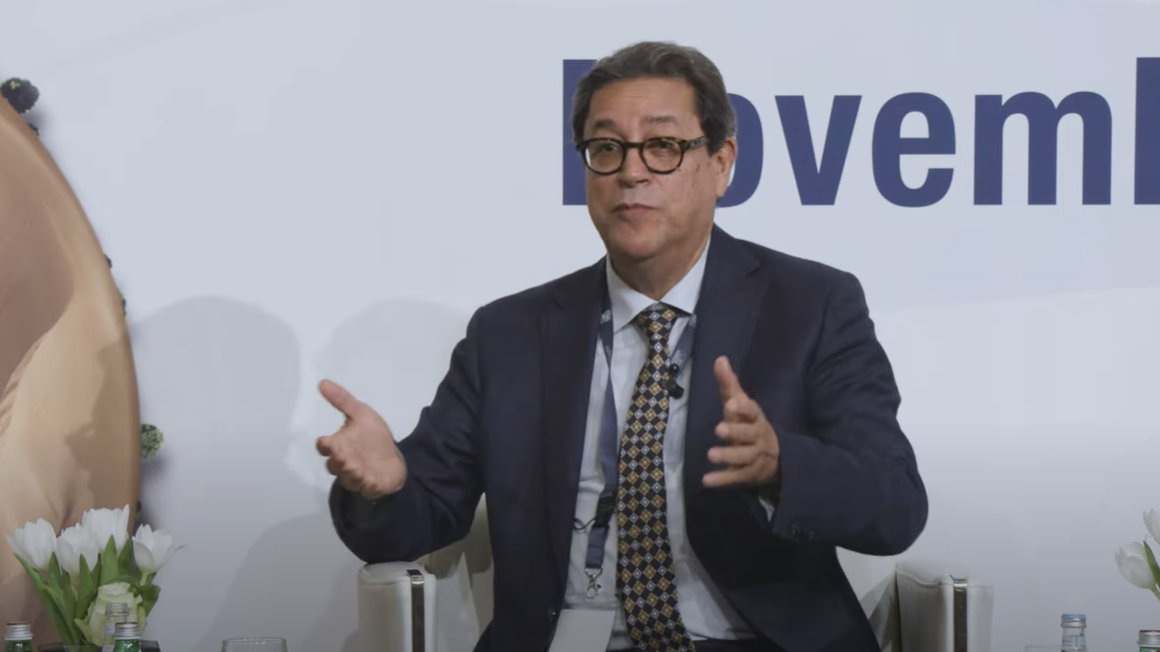
Aly Abousabaa, Director General, International Center for Agricultural Research in the Dry Areas
“Innovations are not only physical innovations… the implementation of the diversification approach by itself is an innovation…one of the innovations is that we are now developing is cactus, something that grows well in this environment, as a substitute to animal feed…in Egypt people eat bread three times a day…we found that Egypt traditionally consumed large quantities of barley so we started to look at what the gene bank can offer as close as it can possibly be to wheat, and we’ve done experiments to demonstrate the science evidence behind a policy decision to substitute up to 30% of a wheat-barley flour mix… that’s an innovation because you would displace six tons out of your 10 tons of imports of wheat.”
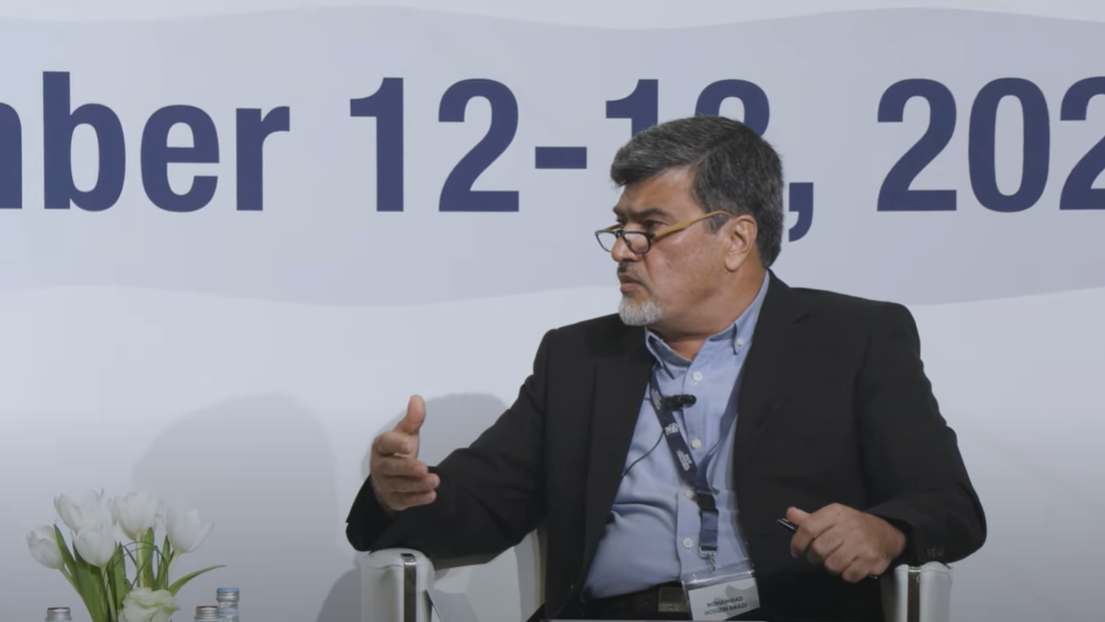
Dr. Mohammad Hossein Emadi, Former ambassador and permanent representative of Iran to The UN: FAO, WFP, and IFAD
“We cannot just rely on new water systems and and drip irrigation and so on, we need to shift to shelter agriculture. Our main problem is not just irrigation, it is the amount of evaporation because of the global warming… that’s why we need to shift to the shelter agriculture…the whole wide range of options that we can produce plants under the shelter and protected sort of environment which reduces the amount of evaporation…I think if we use new innovations with a wide range of technologies in plant production….with the cooperation among the neighboring countries, regional countries, and through the third party countries…India, China, and so on…the outlook is positive.”
Thematic Round Table Discussions
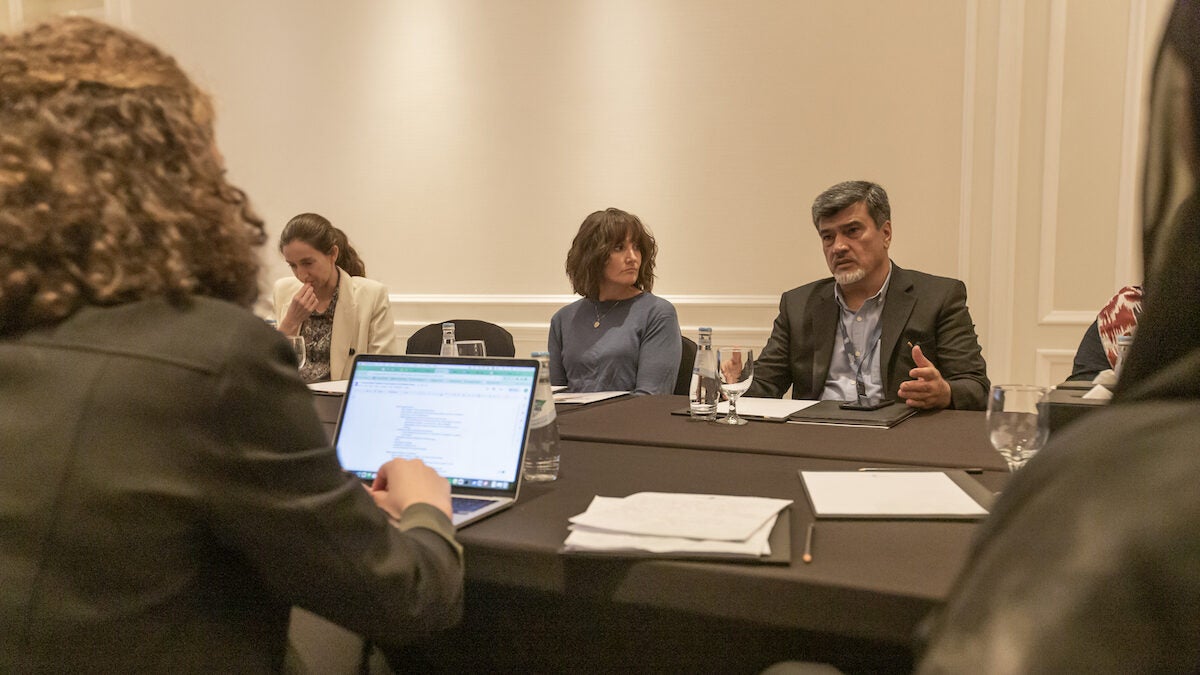
Water Resilient Food Systems
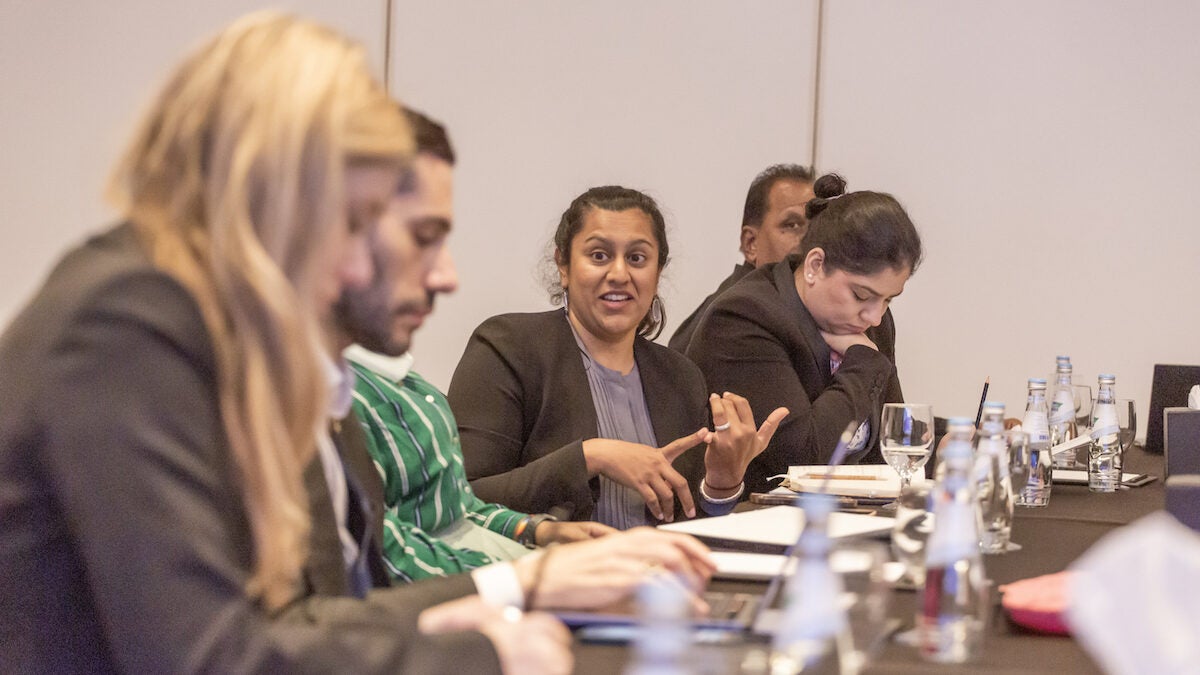
Accelerating Urban Water Resilience
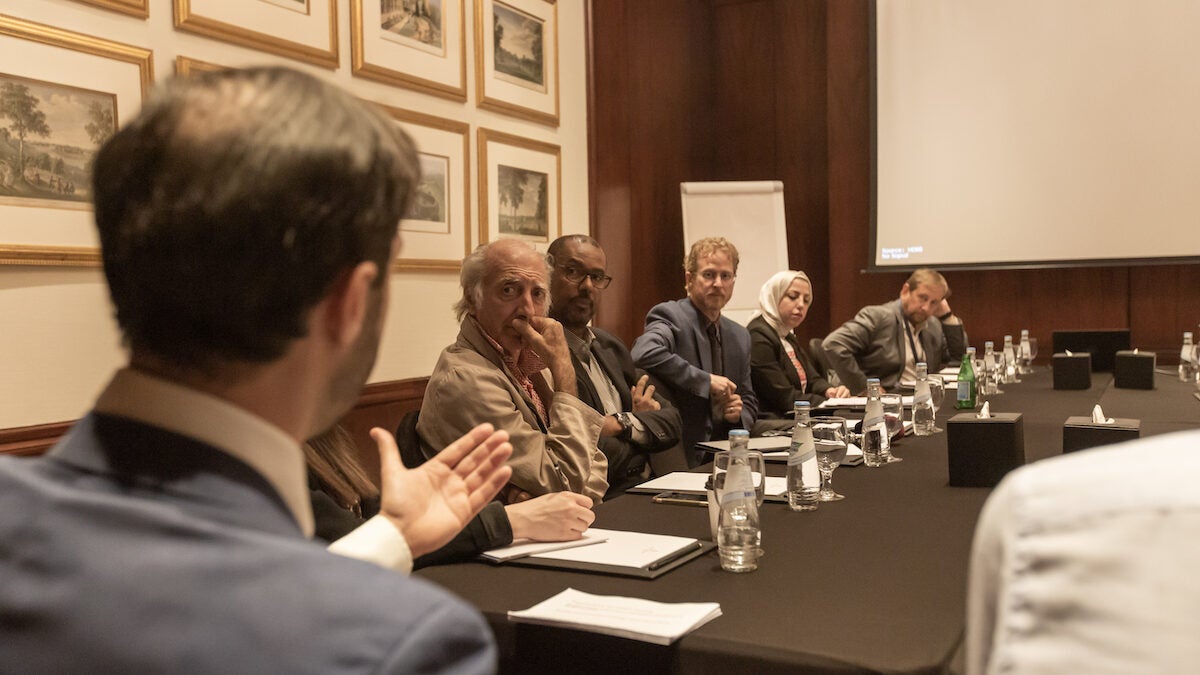
Protecting and Restoring Freshwater Ecosystems
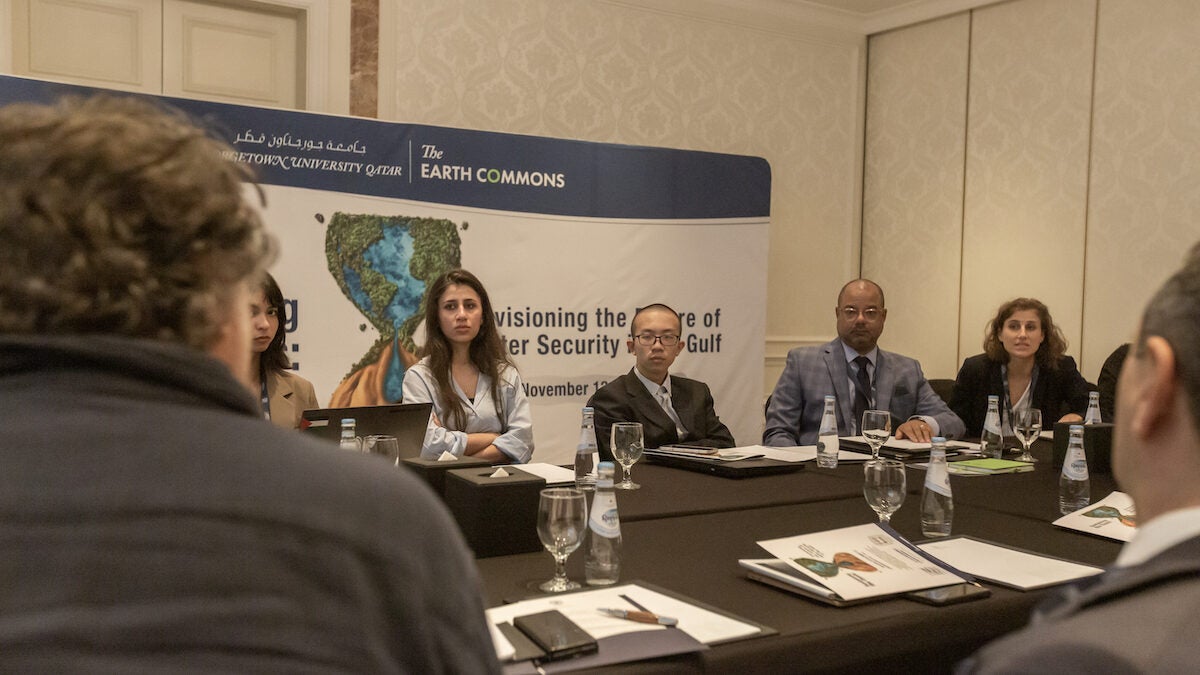
Water and Regional Stability
The Role of Gulf Countries in Defining a Water Secure World
In this high-level panel chaired by Dr. Laurent Lambert, Assistant Professor, Doha Institute for Graduate Studies, participants discussed what the world has to learn from the Gulf countries use of scarce water resources, and the role they play in charting the path forward.
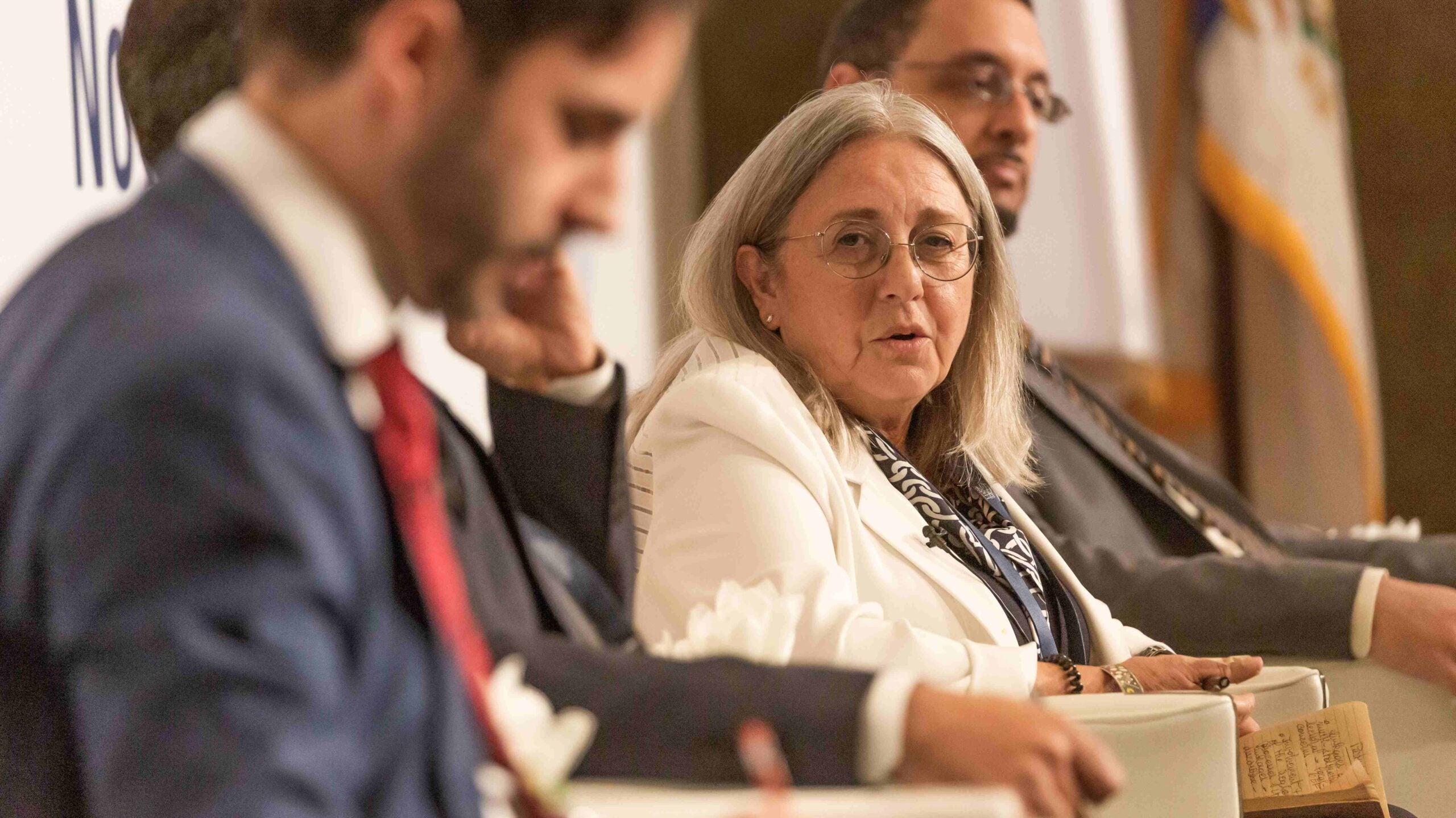
Roula Majdalani, Senior Climate Change Advisor, International Center for Agricultural Research in the Dry Areas
“Since the independence in the 70s of the Gulf States, many have made a very serious commitment to providing universal access to water and sanitation way before the SDGs, even way before the MDGs and this is really something to be recognized, and that has also had socioeconomic development growth cascade, in
effect, of development…The agriculture sector is where you can achieve better demand management as more countries in the region oscillate towards food sovereignty.’’
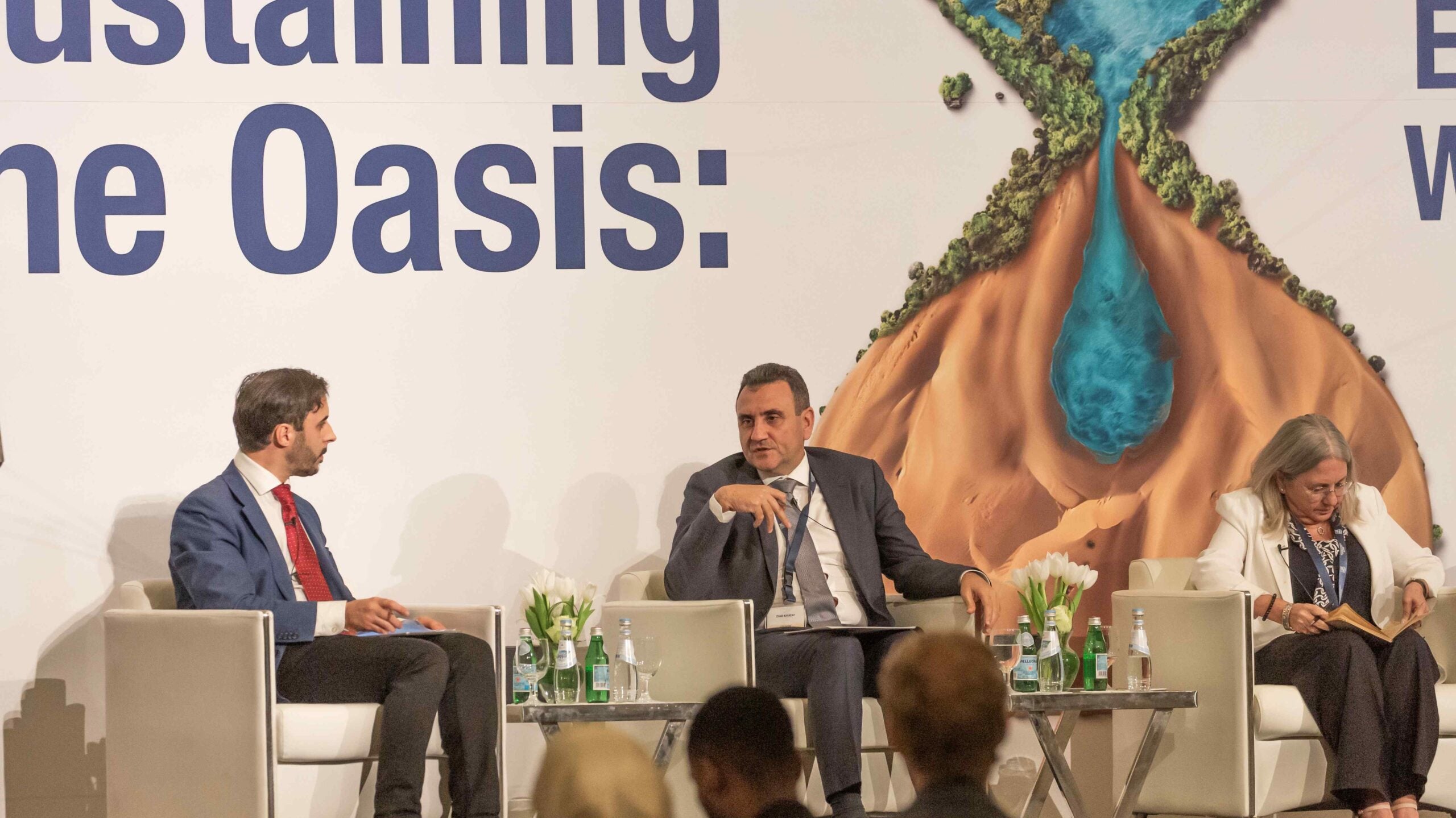
Ziad Khayat, Senior Economic Affairs Officer- Water Resources, UN Economic and Social Commission for Western Asia
“Fortunately this region had the wealth economic power to to have a very high adaptive capacity…one would think that the most vulnerable region would be the Gulf but it’s not, it’s the least vulnerable because it has a very high adaptive capacity… the advantage of accessing the technologies, having the non-conventional water resources, having the desalination, but also a lot of the governments here are valuing… the circular economy of waste water treating waste water and reusing it.”
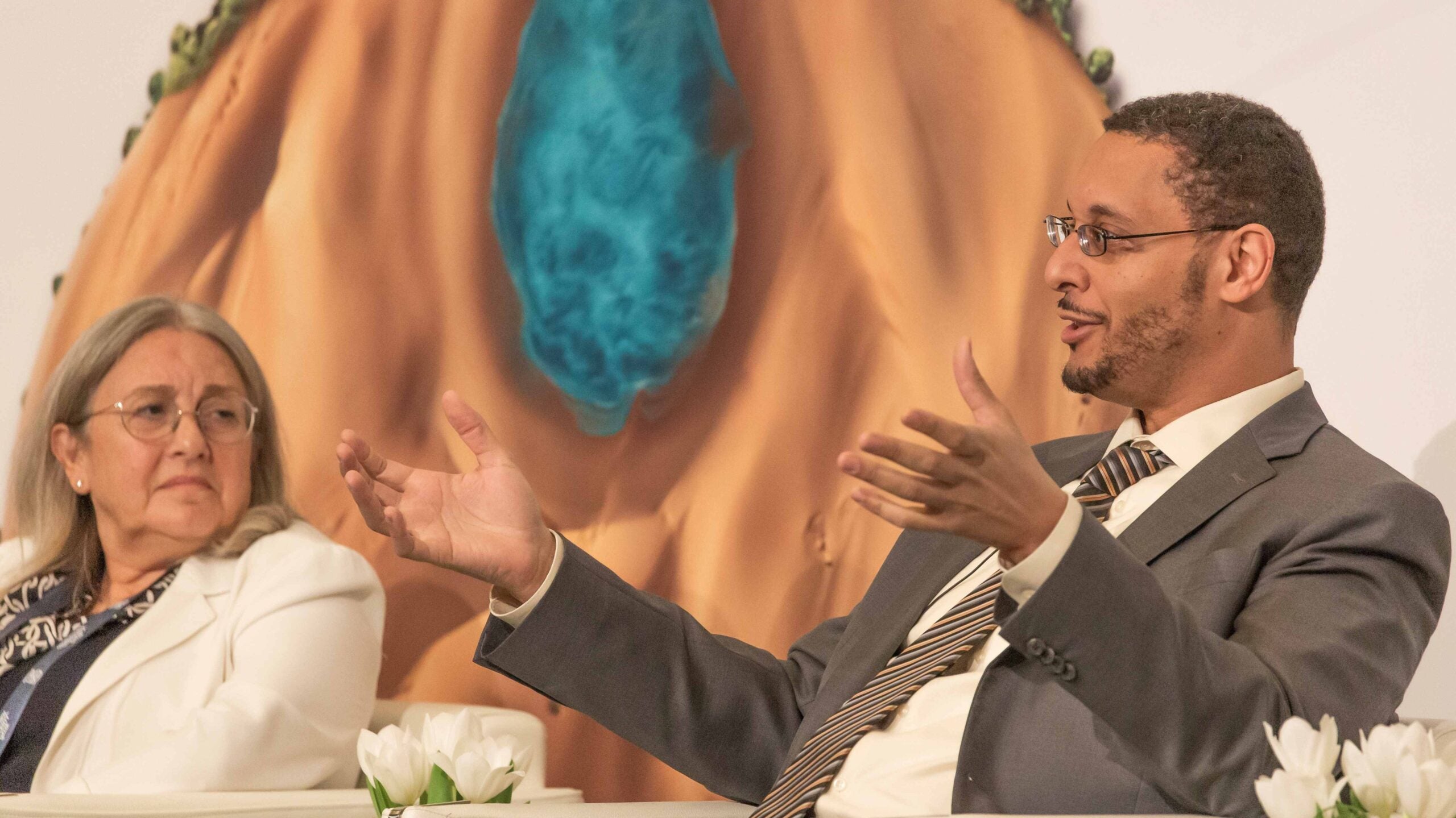
Dr. Mohammed Mahmoud, Senior Fellow and Director, Climate and Water Program, Middle East Institute
“Climate change has caused this very paradoxical situation where if you look historically, the GCC Nations are really challenged in terms of water resources… and so therefore they shifted their need early to non-conventional water supplies…but you look up up the coast..at the nations on the Tigris-Euphrates system…in an original context that provided them more water security… but now we look in modern times and amplification of climate change, the vulnerability has almost reversed between these two groups.
Accelerating Environmental Action
In this high-level panel chaired by Dr. James Olsen, Manager of Instructional Design and Educational Continuity at GU-Q, panelists discussed the future of climate governance and the diverse experiences and contributions of youth facing climate change.
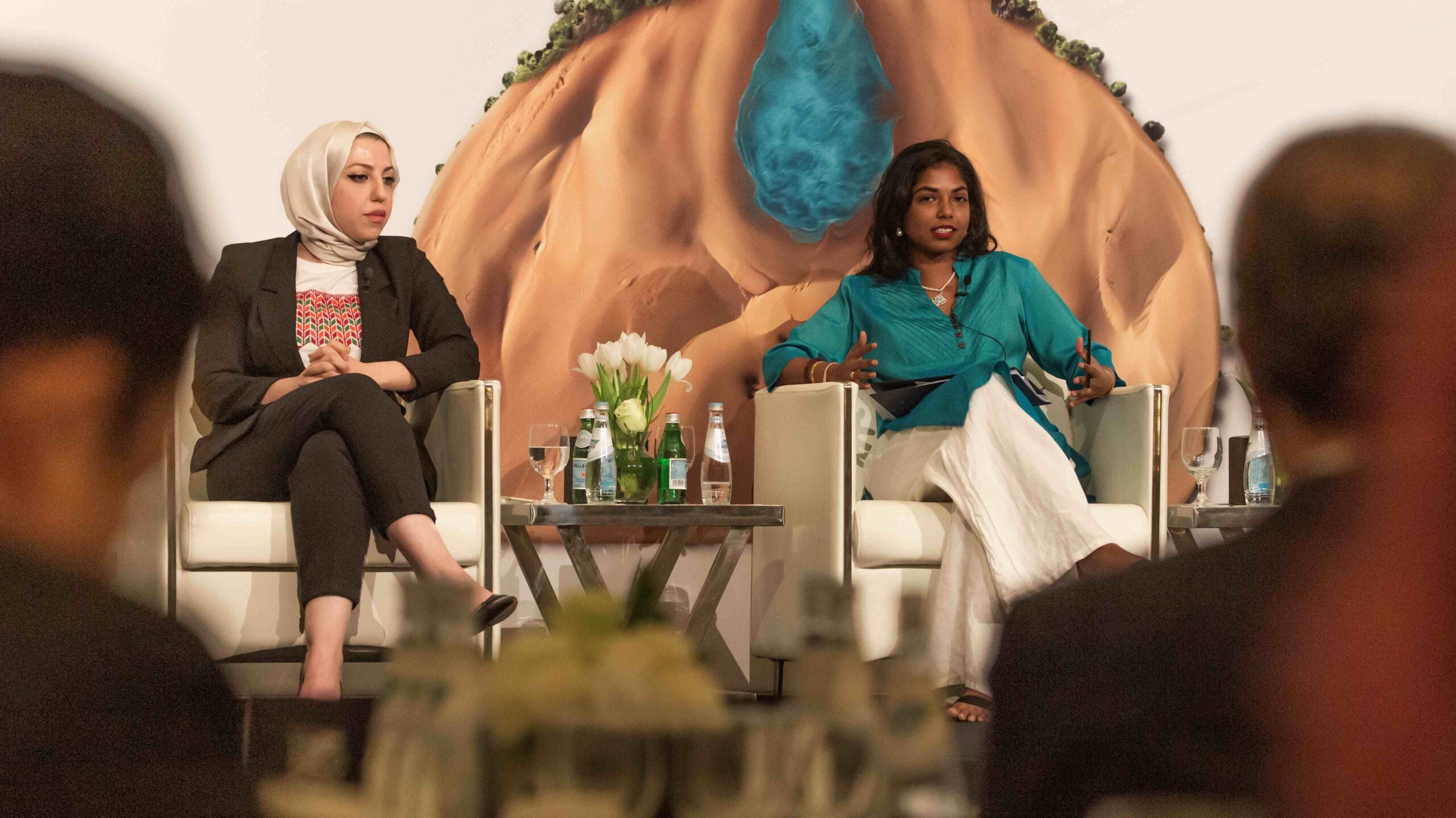
Ashanee Kottage (SFS’22), Research Analyst, Earth Commons
“Toni Bambara says the role of the artist is to make the revolution irresistible um and I think that’s exactly what artists do, they capture your conscience.. it also has the power to personalize things that are incredibly politicized including climate change and water issues. Often times they become a lot about the numbers, and the data, and the statistics, and stories add a human element..so that’s the power of storytelling and performance… it’s really valuable in capturing the heart before you can go to the mind, and I think that connection is really important in affecting behavior change.”
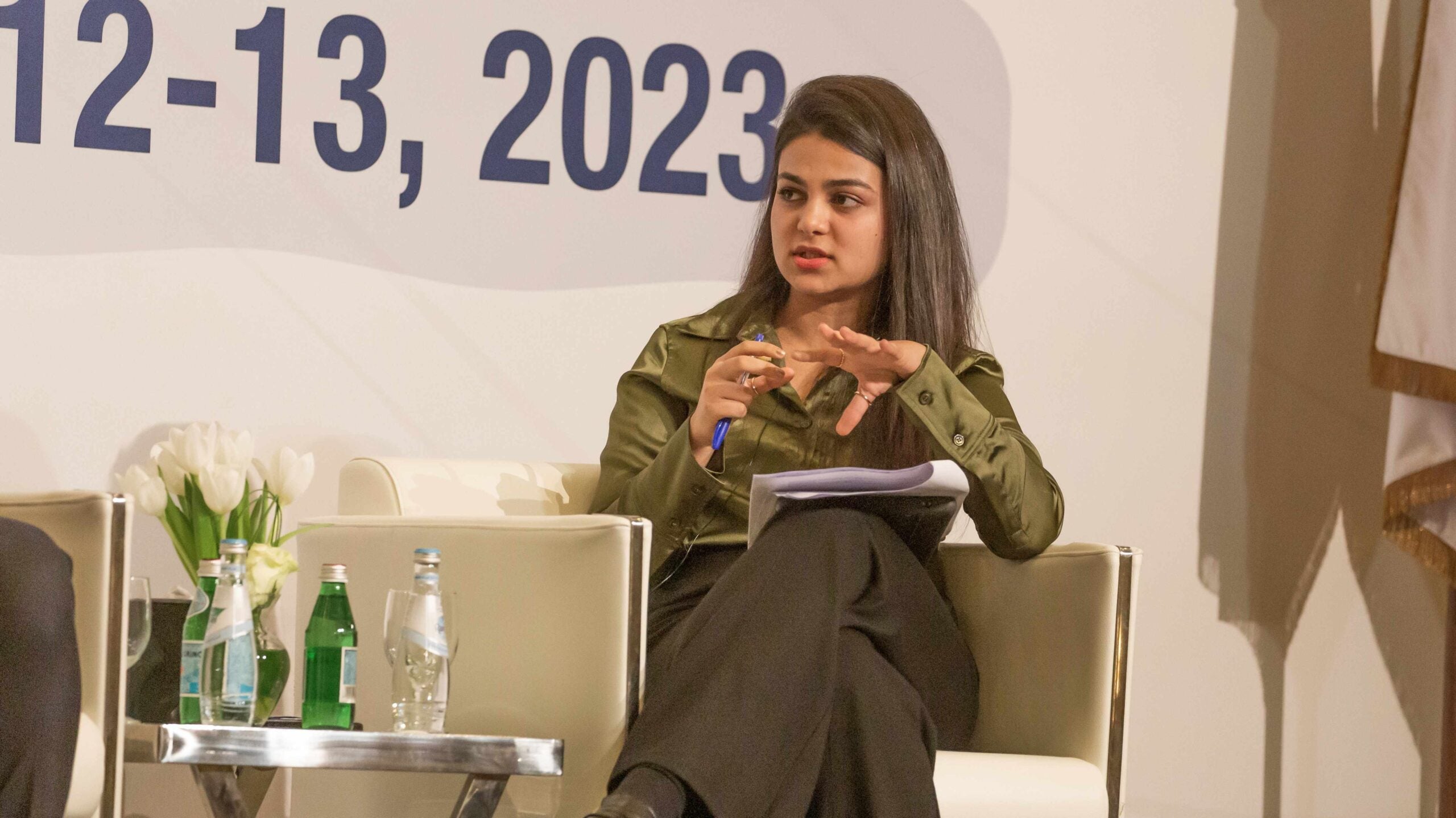
Umaima Ahmed (SFS’24), Student, GU-Q
“If you have the motivational drive to learn something you just make sure that whatever opportunity comes in front of you that’s related to your interest you avail it…when I was heading the GU-Q Sustainability Club, I made sure that I was collaborating with as many organizations as I could, that’s how I got to know about… the sustainability ecosystem in Qatar… I researched floods in Pakistan and that really developed my interest in understanding nature-based solutions…recently I interned at the US-Qatar Business Council… I learned about corporate sustainability.”
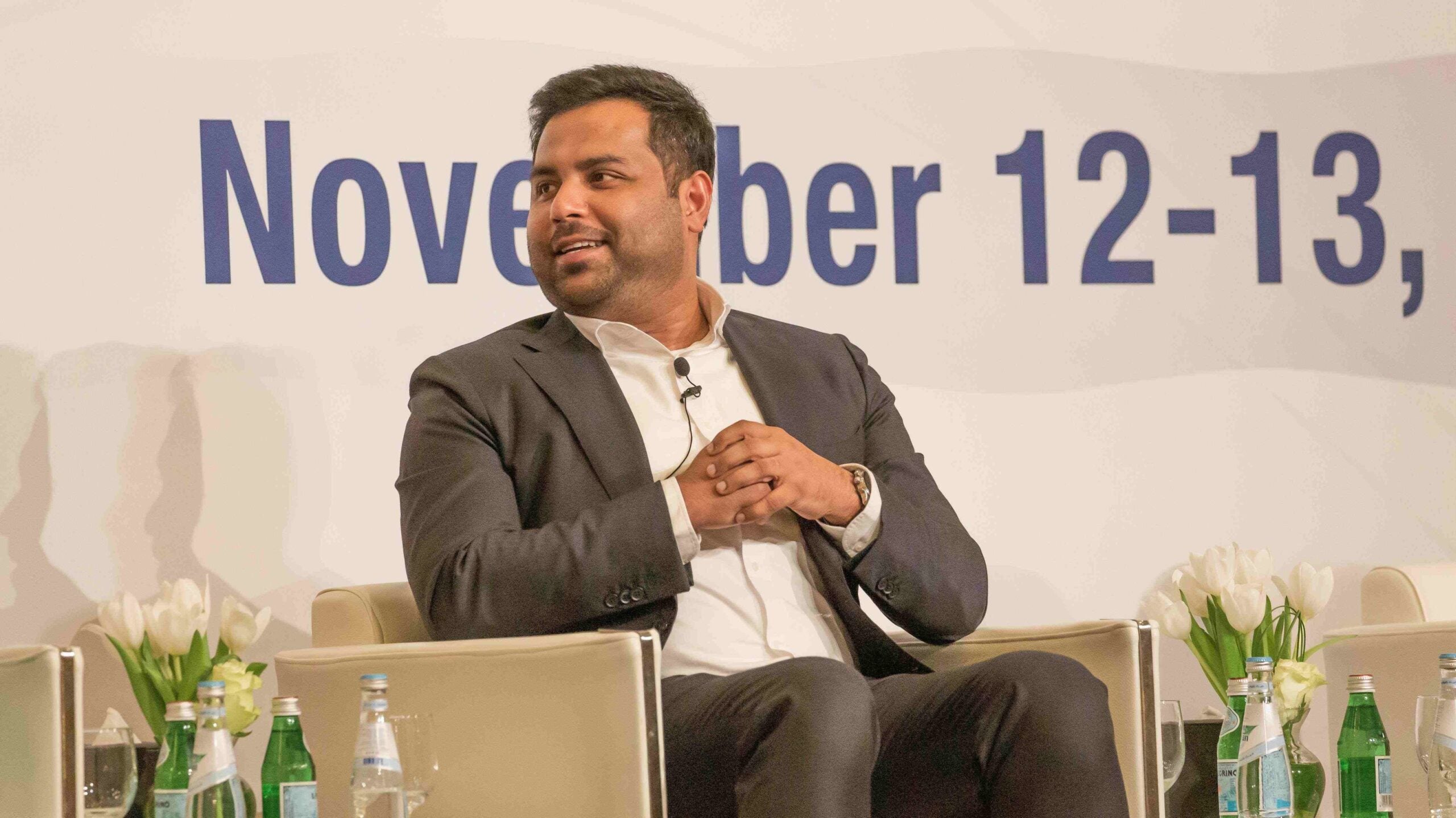
Neeshad Shafi, Agents of Change Youth Fellow, Wilson Center
“The issue with the region, especially with the young people, is that sort of tokenistic approach….the deep involvement of young people in the environmental issues are kept far away from the discussions…. We started the Arab Climate Youth Movement in Qatar (ACYM-Q) to bring young people under one umbrella….Something the ACYM-Q did was bridge the gap between the region and the globe. We reached out to every NGO globally…we showed a business model of how it works and I think that model is something many of the organizations within the Gulf countries can replicate… We got to be part of Qatar’s national delegation [to COP] because we did substantial work on the ground here which is recognized by the state.”
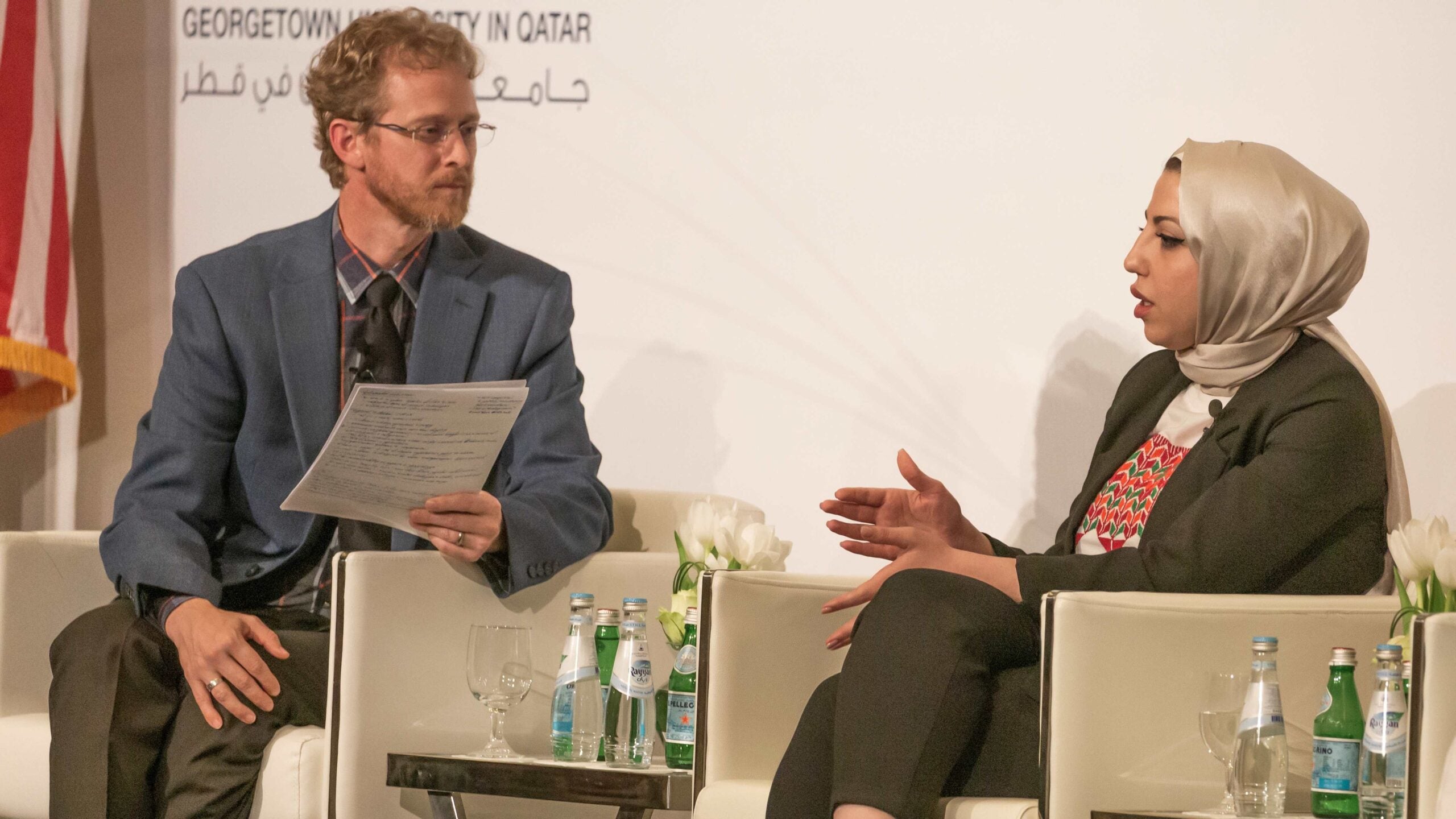
Eman Duwaik, Coordinator, Palestinian Women Water Network
“The Palestinian Women Water Network’s main focus is to make women’s voices count…promoting Palestinian women professionals to participate more at the decisionmaking and policymaking level…to create programs and activities that help them to have the right skills and abilities and knowledge of their rights to water and a clean environment…to gather all stakeholders in one network where they could dialogue and discuss safely their needs and wants… so that the top level management could hear them, including the Palestinian Authority…we also focus on a capacity building for professional women that work in the water and environmental sector, also female graduate students… to connect all these stakeholders together.”
Student Performance
Students from Georgetown’s campuses in Qatar and Washington, DC participated in the conference with a performance expressing their hopes and fears around the future of our planet, led by Derek Goldman, Professor of Theater and Performance Studies and Co-Director, Laboratory for Global Performance and Politics, Georgetown University.
Closing Remarks
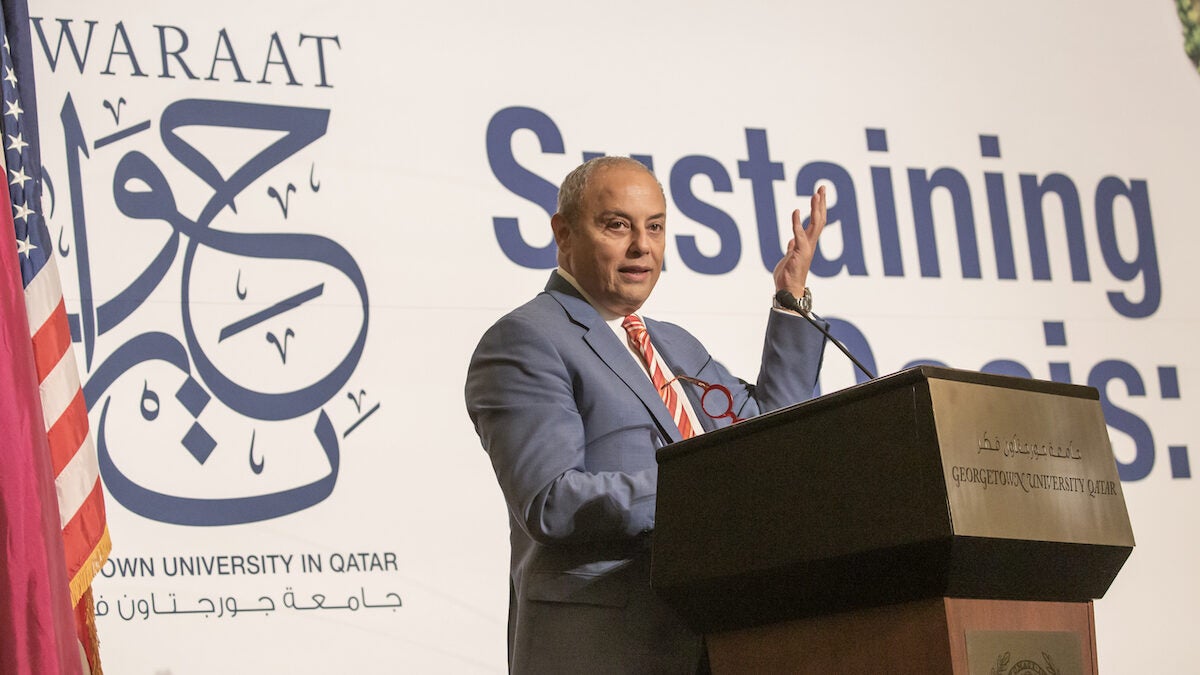
“One of the greatest values of dialogues like Hiwaraat is to kickstart important agendas for the future, to bring together people who care about common issues.”
—Dean Safwan Masri, Georgetown University in Qatar
Conference Organizers and Thought Leaders
This conference was co-convened by Georgetown University in Qatar and Georgetown University’s Earth Commons Institute, and organized by thought leaders from both campuses.
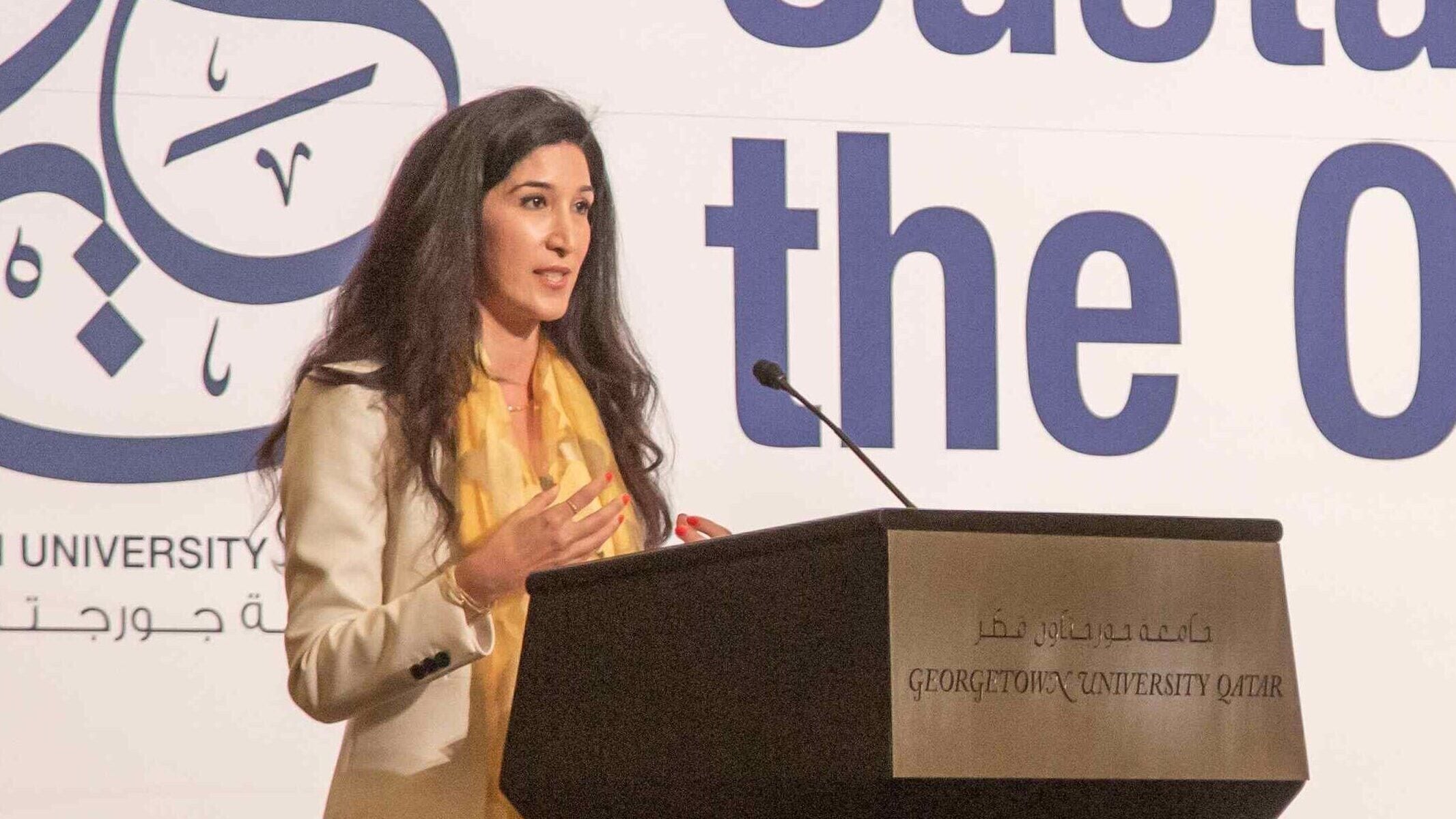
Dr. Raha Hakimdavar
Dr. Raha Hakimdavar is Senior Advisor to the Deans of Earth Commons and GU-Q, Non-resident Fellow at the Middle East Institute, and Founder and CEO of the climate-tech startup Zyon Space.
Dr. Hakimdavar was previously the Director of Space Sciences at Ball Aerospace, and has served at the USDA forest service and NASA, as well as a consultant for the UN, World Bank, and USAID. Her leadership at NASA led to a revision of UN Environment’s reporting methodology for the SDG on Water and Sanitation and creation of a US Government-wide global hydrology model for water security operated by the US Air Force.
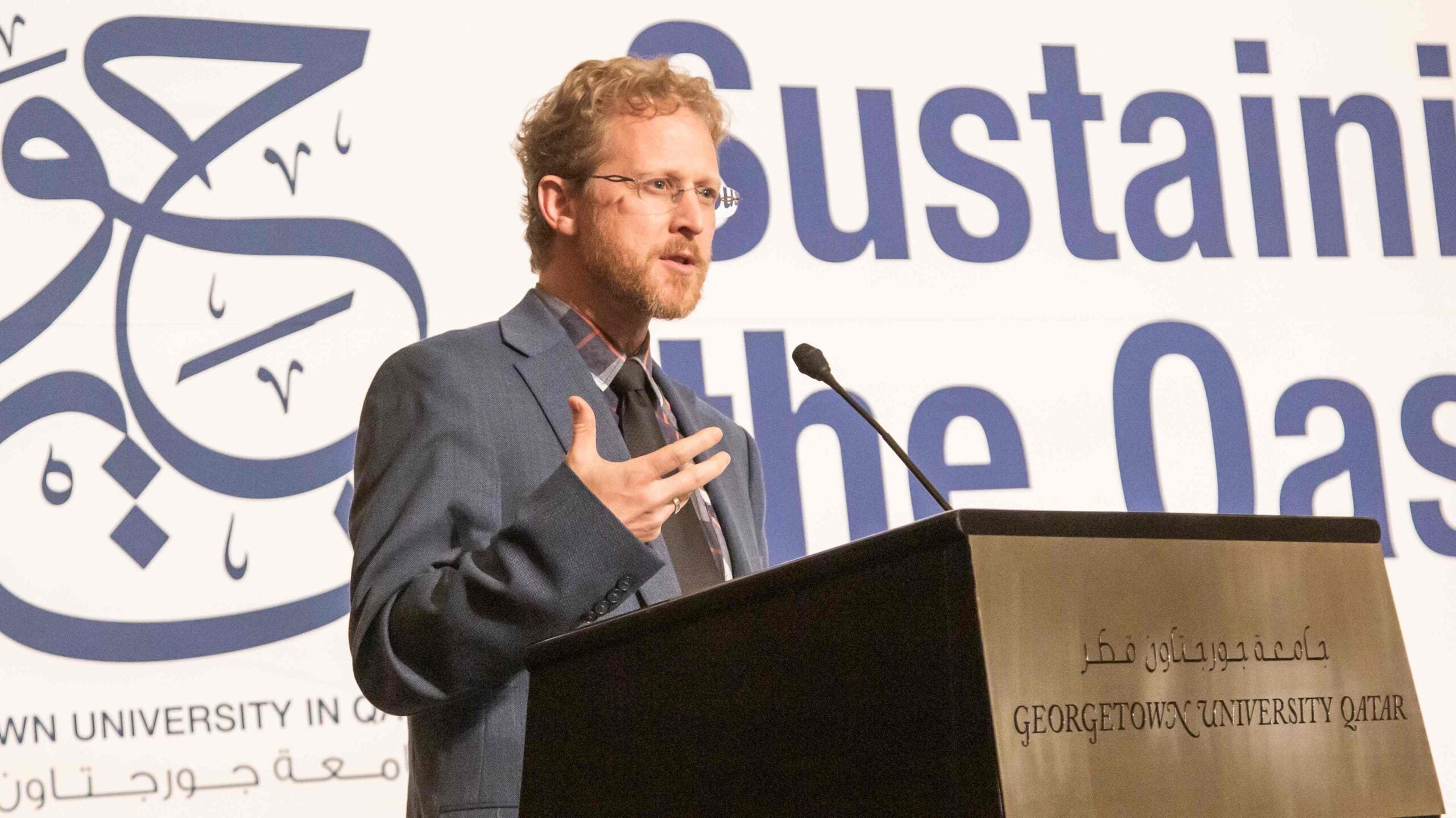
Dr. James Olsen
Dr. James Olsen is Manager of Instructional Design and Educational Technology and
Adjunct Professor of Philosophy at GU-Q. He was a founding faculty member of Georgetown’s Core Pathways Curriculum on Climate Change and has taught in both philosophy and the Environmental Studies Program.
Dr. Olsen is the former Assistant Director for Programs for Faculty and Graduate Students at Georgetown’s Center for New Designs in Learning and Scholarship. He specializes in course and instructional design, inclusive pedagogy, pedagogical development, and issues in sustainability.
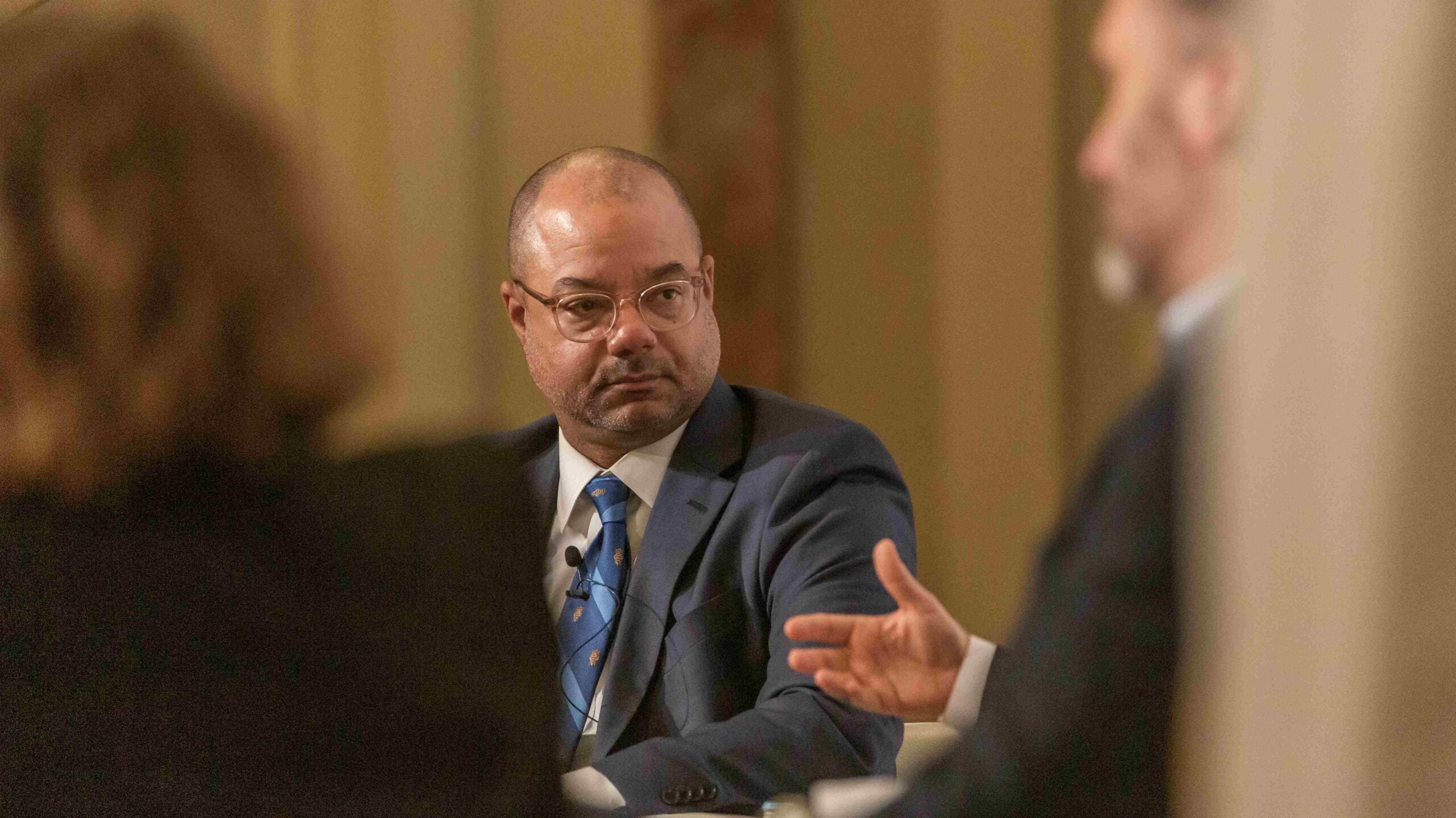
Dr. Marcus King
Dr. Marcus D. King is Professor of the Practice in Environment and International Affairs at Georgetown University’s School of Foreign Service, with a joint appointment at Earth Commons.
Prior to Georgetown, Dr. King was the John O. Rankin Associate Professor of International Affairs and Director of the MA in International Affairs program at George Washington University, and served as Research Director of the Sustainable Energy Institute, CNA Corporation. He held Presidential appointments in the Offices of the Secretary of Energy, and the Secretary of Defense, where he helped negotiate the UN Framework Convention on Climate Change.
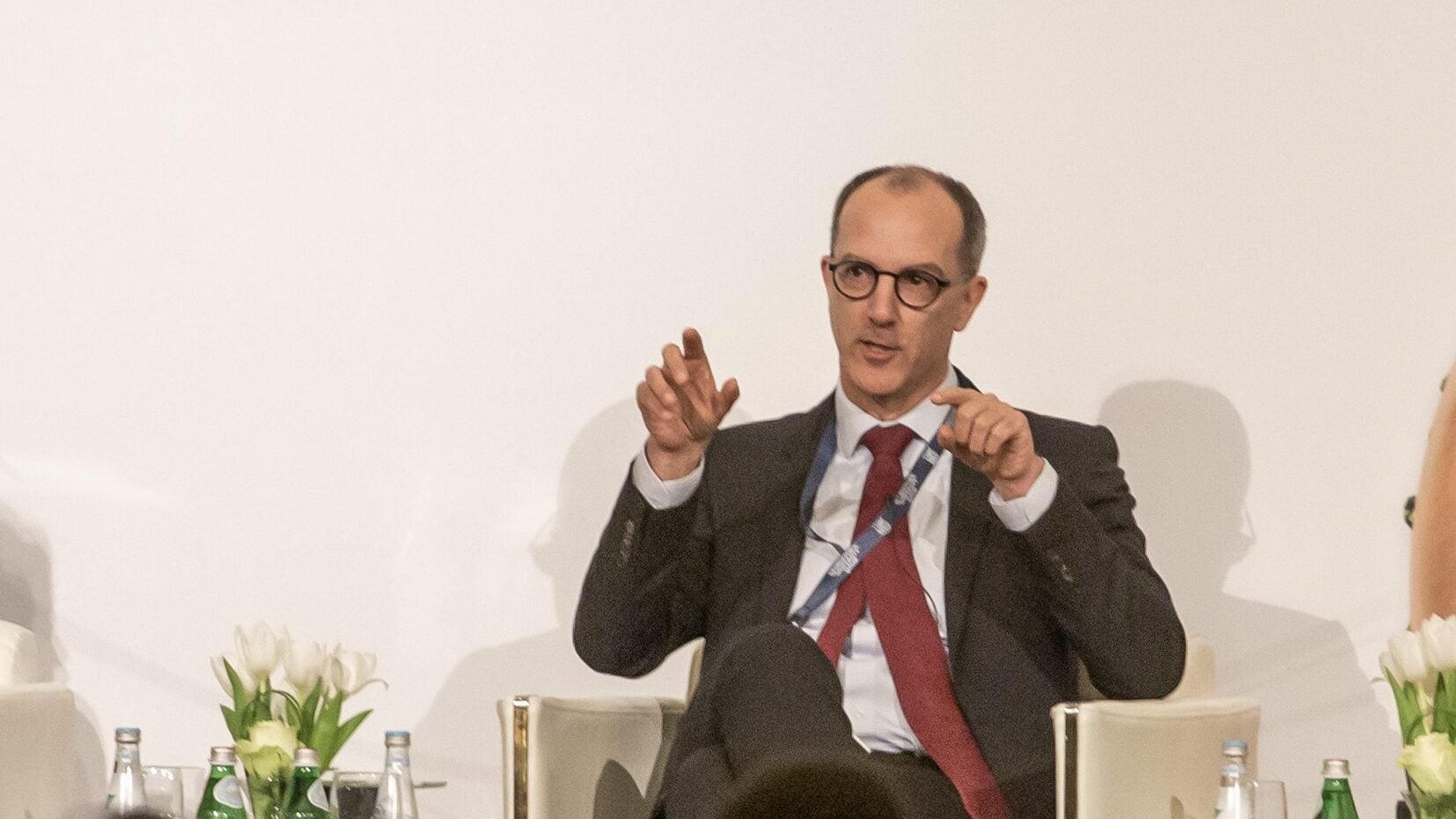
Dr. Mark Giordano
Dr. Mark Giordano is Professor of Geography and Vice Dean for Undergraduate Affairs at Georgetown University’s School of Foreign Service. His research focuses on the international political dimensions of water, agriculture and the environment.
Prior to Georgetown, Dr. Giordano held multiple roles at the Sri Lanka based International Water Management Institute, winner of the Stockholm Water Prize–the “Nobel Prize for Water”. In an earlier career, he was an agricultural trade economist and a combine mechanic. Most of his professional life has been in Asia and Sub-Saharan Africa.
About Earth Commons Institute
Georgetown’s Earth Commons Institute is a hub for environmental and sustainability innovation, research and education to accelerate action on the most pressing issues of our earth. Assembling a team of interdisciplinary experts, researchers, leaders and students, the Earth Commons is transforming the university into a living laboratory to develop scalable solutions for a greener, more sustainable world.
